#her self confidence has to grow back for her and her children’s sake
Note
As always, what another beautifully written chapter. Your writing is so descriptive. So beautifully in character. It truly amazes me the way you capture emotion. Not just with “What We May Mend” but with everything you have written I feel as if I’ve felt and experienced what your characters are experiencing. That is truly a gift. I hope you enjoy your writing ✍🏾 as much as I do. You write novel and/or novella length things and I’m not sure you realize how amazing that is. I am seriously in awe of your writing. I have been many fandoms. I’ve followed so many fanfiction authors over the years and I say this without hesitation you are by far the best.
I am very interested in seeing where you will take “What We May Mend.” I am very interested and invested in seeing how you will fix their marriage. There are a lot of problems and issues that need to not only be addressed but need to be resolved. It is odd in the way that I almost don’t want them to leave for Westeros quite yet.
Their marriage is on very shaky ground (as is Laena who still has yet to recover from that very traumatic birth. I do however love the fact that their son is called Aemon though). Of course at this point I really just want Laena to be happy. I want her to feel safe and loved and desired and more than enough in not only her marriage but her life. I want her to have a moment when she realizes just who she is. She is Laena Velaryon. Daughter of the “Sea Snake” and “The Queen Who Never Was.” She is (I hope still) the rider of the largest dragon in the known world. She is the mother of Baela, Rhaena and Aemon. I want her to get to a place where she realizes she is worthy of every bit of happiness imaginable.
But I know it'll take a while to get there.
I loved the bit where she realizes just how bitter and genuinely mad she's grown in the past ten years. It is in my opinion really an eye opener to the things that show!Laena most likely did have to endure. All that pain, anger, sadness, isolation, and loneliness she had to endure would make anyone become bitter and jaded and mad (look at Alicent). I think she really needs to work through the level of emotional damage that Daemon has put her through for the past ten years.
She and Daemon need to sit down and have a honest heart to heart. Maybe sometime after Laenor’s funeral where emotions would be running high. She really just needs to say any and everything in reference to how she’s feeling and how she felt. Because no one deserves that.
Not only does she need to do that for herself but for her children as well. Lanea could be the best mother in the world, but if her relationship with Daemon continues as it has it’ll only end up hurting her and their children in the long run. That being said, I hope Laena realizes somewhere along the way that she can't try and fix their marriage solely for the sake of their children. Because children grow up. Children leave home (quicker in their world mind you) and at the end of the day all you will have is an empty house and a spouse who you either don’t know or (if it continues the way it’s been going) despise.
With the amount of issues and problems their marriage has they have to both want to fix their marriage. It can’t be for show and it can’t be (solely) for their children. It has to be because Laena and Daemon want to be together. They want to be happy together. They want to fix their marriage and grow old together.
I think you’ve done a great job of displaying the moments where they both still have some affection for one another but it’s almost as if it’s been buried and forgotten. Which can happen in a real marriage.
Now that I’ve tackled Laena and what I think she needs to work on now it’s time for Daemon.
Where do I begin?
Daemon needs to own up to the awful things he’s done to Laena in their marriage. He needs to realize that it’s not okay. It never was okay. Never is going to be okay. And Laena saying that is doesn’t make it so. For that to happen he needs to realize that it’s going to take a lot more than just saying “forgive me”. Especially when his actions don’t show he wants to be forgiven.
I’ve always thought that Daemon would benefit from doing a lot of soul searching. He needs figure out his bullshit. Show!Daemon needs to figure out who he is. Who is Daemon? What does Daemon truly want?
Because he can’t fix anything with anyone until he fixes himself.
Because I think he’s always felt the need to prove himself. To live up to the Targaryen name. And in doing so he lost himself along the way. He let himself become consumed with the Targaryen ideology. (Further proving the point that Targaryen ideology is harmful for Targaryens themselves and those they rule over). So when it comes to his relationship with Laena he’s away from Westeros. Away from Kings Landing. From Dragonstone. Away from the “Targaryens.” There’s no one who he needs to prove himself to. Because Laena has already chosen him.
And that probably shook him up. I think he started slowly withdrawing the first time Laena told him she loved him. I think the excitement of “defying Viserys the crown” had worn off and he realized shit was getting real. That what he was feeling was getting real and that was uncomfortable for him.
Because change is always uncomfortable.
Instead of trying to adjust to that and grow with Laena he started to withdraw from her because of what he was feeling. I think in his mind he was trying to protect her but in doing that he was hurting her. He was hurting their children and he was ultimately hurting himself.
And I think that was (hopefully) what he was doing during those two weeks Laena was in a comatose state. I hope he spent that time doing a lot of self-reflection and soul-searching. I think he probably spent a lot of time by her bedside making a lot of promises. But words without actions are just words. Empty meaningless words. He needs to put those words into actions.
He needs to show Laena that she is loved (and start loving her the way she wants to be loved). That with him she is safe (physically, emotionally, mentally, sexually) that she can trust him to keep her safe. Show her that she is desired by him (and he needs to immediately stop cheating on her whether it be with a woman or a man). But most importantly I think he needs to open up to Laena. She’s his wife and somehow she loves him. He needs to start trusting her.
He also needs to be a better father to all of his children. He needs to realize that those insecurities he’s feeling/have felt of never being enough is the exact same way Rhaena is probably feeling. He needs to realize work hard to build a meaningful relationship with both of his daughters. Little Aemon is a baby so of course he will be doted on now, but Little Aemon will grow up. He needs to be an active parent in his life as well.
All in all I think Laena and Daemon can fix their marriage (and themselves) but they both have got to want to fix it.
And I am truly sorry for ranting. I just really like your writing and Laena x Daemon.
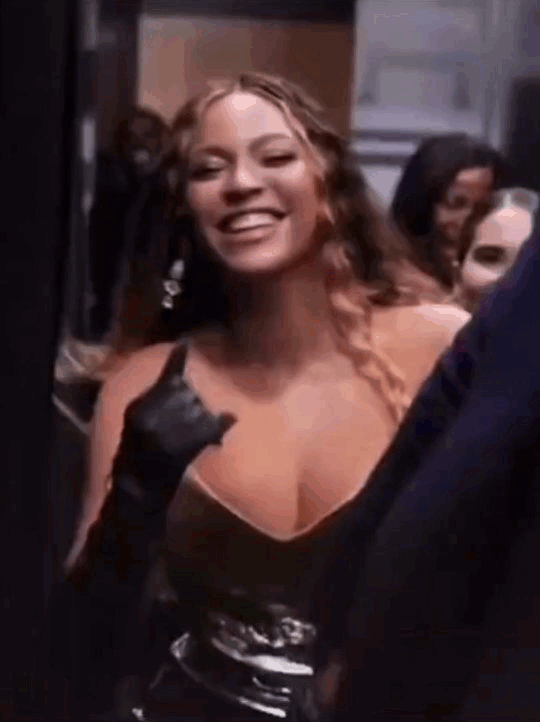
Thank you so so much for this 😊 As heavy as this work in particular has been I have enjoyed writing it(and my other works when I’m not procrastinating 🤣). Do not apologize for ranting because this genuinely made me gidddy🙌🏽 I am honored truly.
Yeah, Laena and Daemon have a lot to work through and process individually as well as with each other because where they are now is at their lowest(self-loathing, insecurity, depression, and suicidal tendencies). It’s a powder keg situation that has been ten long years in the making.
Laena came into the marriage so hopeful and naive, but her self-esteem/confidence has been absolutely decimated by all of Daemon’s antics(plus the isolation since he literally took her away from her home/everything she knew and then proceeded to emotionally abandon her).
He did not know how to handle someone actually being there and loving him(even though he wanted something that would be entirely “his,” cause he’s the “spare,” and that’s exactly what he got that) and she and their poor girls have had to pay the price for his self-medicating.
Love how you mentioned Rhaena because Daemon definitely fails to connect with her due to him seeing the parts of himself he hates the most. This isn’t right or fair considering Rhaena is his child(she didn't make her egg turn to stone) and he’s continuing the cycle that led to him being screwed up(the favoritism needs to stop).
Laena right now is in the worst place of her life and Daemon is just now realizing it. They both had not realized how bad off she had become. She had just been pushing everything down until her death was her only “out” and Daemon up until she attempted suicide, thought that everything was okay. It’s a wake-up call for them.
Daemon has had some time to self-reflect and he’s made a lot of promises to an unconscious Laena that he has to fulfill/make up for the ten years he’s screwed her over. Laena has got to know she and the kids are number one to him. That he doesn’t want anyone else but her and that he’s going to put them first.
They’ve got a long road ahead of them, but the work will be put in 👏🏽
#what we may mend ask#bnask#bnasks#my writing asks ✍🏽#I loved this 🙌🏽#it’s pay back time daemon#you got to pay for your sins#and poor laena she’s been through the ringer#her self confidence has to grow back for her and her children’s sake
5 notes
·
View notes
Text
Love You For Life
Summary: Katsuki's wedding day
Warnings: Strong Language & fluff
Requested By: Anon
A/N: this is inspired by the song Love U 4 Life by Jodeci. This mf long but I hope y'all enjoy.

Narrative
Six months later
Today was the wedding of number two pro hero Dynamite and number five pro hero Y/N.
The media was anticipating this wedding, waiting outside of the church, waiting for photos to be released from the ceremony. No news reporters were allowed inside, except for the photographer.
Everything thing was set up beautifully to their liking. The food was put out in their designated spots, and the tables were decorated according to vision. Everything was going perfectly, except for the groom, Katsuki Bakugo, hyperventilating in the back.
"FUCK FUCK FUCK! OKAY, KATSUKI, DON'T FUCK THIS SHIT UP! THIS IS YOUR WEDDING DAY....FOR CHRIST SAKES GET YOUR SHIT TOGETHER! YOU LOOK LIKE A SHITTY EXTRA RIGHT NOW!" He told, himself, holding both hands over his face.
"Damn, man, just calm down! You acting like you're getting ready to fight a villain or something. It's your wedding day. Just relax." Denki said, trying to calm down the angry blonde to his best ability. But being Kaminari, that's something he could never do.
"You think I don't know that shit, SPARK PLUG!" He growled, popping small explosions from his hand.
Katsuki was just extremely nervous. There is no way to front about it. The whole relationship of 8 years he was his usual confident self, but here on this day where he was getting ready to marry the love of his life, the one who would bare his future children, the one he would grow old with, suddenly hit him in the face like a ton of bricks.
"Bakubro, what are you worried about? I mean our whole friendship. You've been as confident as ever. You run up to your fears and take them head on, so you getting married shouldn't be no different. You know Y/N loves you, even with all your flaws, so go out there and show her why you love her." Kirishima said, holding Katsuki shoulder.
"B-but, what if I mess up or sum shit. What if I start panicking? I can't let them extras see me like that, especially Y/N." Katsuki muttered, looking at himself in the mirror.
"Alright, kacchan, stop saying this stuff about yourself. Neither of you has cold feet. You both have been crazy about each other since UA. I mean I've never seen a person love you with so much sincerity, even back when you acted like a fucking rapid dog." Izuku said, laughing along with everyone else, making Katsuki glare at the green haired man.
"The point is you're literally made for each other. So, even if you do mess up on your words out there, I'm sure Y/N isn't gonna love you any less. So get out there and do your best." Izuku finished, looking at Katsuki through the mirror, smiling encouragingly.
Katsuki turned around and looked at Sero, Shoto, Kirishima, Denki, and Izuku. All his best friends and I smiled a little nodding. They all did a small group hug and got ready for their best friends big day.
-Time Skip-
Y/N and all her friends helping her get ready, unlike Katsuki, she wasn't freaking out. I mean, she was nervous, that was expected. But she wasn't freaking out. If anything, she was excited to marry the man she loved since she was a teenager. Not many people can say they've made it this far. She knows the water works is gonna start as soon as she sees him standing at that alter.
Mina did final touches on her hair as her sister did her makeup. A gold crystal hairpin was clipped onto the hair and sprayed with hair spray for extra shine.
As she got up and stood in front of the mirror, she got emotional. She thought she looked absolutely beautiful. She turned around to her bridesmaids and to her family, waiting for their say on how she looked.
Her mother placed her hand over her mouth and cried, saying she looked so beautiful. Y/N waved her hands over her face, laughing, trying to stop herself from crying. She felt like a princess. Like how all little girls pictured themselves on their wedding day.
They had their little moment and got ready to have Y/N walk down that aisle.
-Time Skip-
The music started as Y/N walked down the aisle holding on to her dad. As she stared at Katsuki, the waterworks officially started. He looked so handsome.
"Could you just please tell me, will you believe in love and the promise that it gives?"
Katsuki's heart was pounding out his chest. He could feel it in his ears. You looked like the most beautiful woman in the world. There's been plenty of moments in their relationship where he fell in love with you all over again. And this moment was at the top of his list.
"I wanna love U 4 life, 'cause your love is why I live. Will you believe in love and the promise that it gives?"
They both couldn't keep the smiles off their faces as Y/N made it closer to the altar. They realized that today was actually happening. Both of them were marrying each other for the rest of their lives.
"But, now I know that you understand. I wanna take you by the hand and walk with you down that aisle."
Y/N waved at family and friends as she finally made it to Katsuki. She looked into his deep red eyes, filled with tears, and smiled tearfully. She reached her hand up and wiped his cheeks.
"Just please tell me, will you believe in love and the promise that it gives? I wanna love U 4 life, 'cause your love is why I live."
"You look beautiful." Katsuki whispered, smiling softly.
Y/N looked at Katsuki, feeling her eyes water again, "You look very handsome yourself." She said, chuckling.
"I love you." Katsuki mouthed.
"I wanna love U 4 life."
"Love you more." Y/N mouth back as tears slid down.
"cause your love is why I live."
#black reader#black writers#black tumblr#self post#tumblelog#poc reader#poc writer#black girls#black representation#black excellence#katsuki bakugo#katsuki bakugo x black reader#katsuki bakugo x reader#mha#mha x reader
34 notes
·
View notes
Text
Matilda Analysis
A poignant narrative delving into themes of self-liberation, healing from past traumas, and a journey toward healthy love for the sake of oneself and nobody else. It's a testament to the resilience of the human spirit, delivered in an intimate and comforting atmosphere soundtracked by gentle instrumentation. This eloquent reminder to whoever needs to hear that it's never too late to seek the love you deserve and cultivate a life filled with joy and acceptance. Even if one must do so independently and abundantly.
The listener may not know the character of Matilda personally, but they know of her intuitively, anybody who can spare a few minutes to listen is invited in miraculously, as the song's configuration allows. And, what waits inside for those who venture? Harry sitting with his guitar, a concerned friend right as you need someone to be.
Here's a deep dive into Harry Styles' Matilda, from a poet.

Roald Dahl's 'Matilda' + Harry's Take
Roald Dahl (1916-1990) was a British novelist, short-story writer, poet, and screenwriter. He has composed many children's books, and has been bestowed the title of "one of the greatest storytellers for children of the 20th century". His knack was for writing children's books interlaced with rather dark, adult themes — like 'Matilda'.
If you didn't grow up with the book and/or haven't had the chance to read it, here is a summary for a bit more familiarity, which will lead to a more engaged discussion here! But, also, if you're familiar with the 1996 film, as many are, you should be just fine! As mentioned before, much of Dahl's works covered much darker themes. The children's book 'Matilda' speaks clearly of the following: emotional and physical abuse, tyranny, misogyny, scamming, attachment theory, and, the most obvious, child abuse and neglect.
In short, attachment theory believes that every child needs to form a relationship with at least one primary caregiver to develop, healthily, emotionally and socially. In 'Matilda', our main character lacks that primary caregiver until she meets Miss Honey. The impact of Miss Honey's warmth, care, and understanding on Matilda is so grand that trust is built (she reveals her telekinesis power to Miss Honey) and leads to a happy ending, as Matilda's attachment to Miss Honey wins over the weaker attachment of her parents — and Matilda moves in with Miss Honey, finding a loving and caring home/family at last.
Now it's time to circle it back to Harry's Matilda. I believe that Harry has taken on the role of Miss Honey as a complementary to the subject to whom he's disguised as quote-en-quote "Matilda" — a stylistic choice I have no doubt was heavily influenced by Dahl's tale. Not only is Harry a friend giving advice and refuge, but also a welcoming sense of care and a second home, which further ties into the third album's theme as a whole — debates of a house versus a home, and what home means to a person.
In the song Matilda, Harry alludes to similar situations, with direct connections to attachment theory and child abuse/neglect. As the audience solely, we don't know the specifics of the problem, but these are the main issues I grasp from the lyrics alone. Roald Dahl's Matilda, as told in the book, has much intellectual prowess — she's too smart, almost an adult in a child's body, most likely an effect of her circumstances' cause. Yet, set aside the knowledge of her adventurous nature and wits, there's no clear yes or no to answer if Matilda needs comfort. For she never cries, adamantly refusing to do so, and never seems to show weakness. She's too smart for that, after all. The single time she outright exhibits sadness about not feeling the love from her parents is when she's four and confiding in the librarian. I'm going somewhere, by the way, I promise you.
With Harry's Matilda in Matilda, lots of the same traits resurface. An adventurous spirit and a bright mind, but also the tendency to keep sucking it up and not letting one fall to tenderness, because it's been perceived in the brain as a weakness. None of what happened seemed wrong to her until a certain point. This is, apparently, no big deal, or so she says. Harry's Matilda speaks of her experiences like it's nothing at all, but it's everything. She's mighty like her fictional character namesake, so bright and lively that she can light up even the darkest days.
Upon a delicate, sadly playful melody of strings, Harry takes on the role of a friend but also a caregiver to show love to his character of Matilda. The Miss Honey, as alluded to before. In Matilda, Harry makes it a point to show Matilda the love she never received from those who should've given it freely. He expresses that, while none of this is his business, he's been thinking about it in concern. He tells her that she can start a family that will love her, will care for her, and there's nothing to be sorry for. With a wide, bright smile and a sharp mind, Matilda, you can let it go, and you don't have to be sorry for doing so. Let us show you what healthy love feels like.


Lyric Pull Apart
[VERSE 1]
You were riding your bike to the sound of "It's No Big Deal"
And you're trying to lift off the ground on those old two wheels
Nothing 'bout the way you were treated ever seemed especially alarming till now
So you tie up your hair and you smile like it's no big deal
You were riding your bike to the sound of "It's No Big Deal" / And you're trying to lift off the ground on those old two wheels: Here a little scene is set, and provides the listener with so much context and information. It's an idyllic childhood moment to picture, riding a bike, but there are cracks already. Cracks in a carefree childhood, cracks in what should've been. The line to the sound of "It's No Big Deal" had people frantically searching for a song to connect, but, from the language used, I never thought of it that way. Rather, it's the soundtrack of dismissiveness, instigated by those Matilda is surrounded with. There isn't a soundtrack of laughter or encouragement, but rather a shrug. It's in the frame of something heard, not something spoken, or, extending, something felt. To the details, the image of the bike is given as those old two wheels — tired, worn, maybe even inadequate. Strong symbolism there.
Then, trying to lift off the ground gives many implications and layered feelings. There's the literal, with a kid trying to play about and do cool tricks, alone on their old bike, maybe dangerous tricks, leaning into the absent parental presence, and maybe seeking attention. There's the symbolic, the imaginative, the evoking of childhood nostalgia and yearning. There's the metaphorical, to fly, rising above where they are stuck, an ache to escape.
Nothing 'bout the way you were treated ever seemed especially alarming till now / So you tie up your hair and you smile like it's no big deal: Those who've experienced trauma may feel or are told that their mistreatment is normal, and/or they shouldn't be the ones to complain because others have it worse. Therefore, they won't speak out because their minds have been conditioned that their issues are nothing to speak of. An internalization. But, as distance and time are gained away from the situation, realization becomes stronger than internalization.
Then, So you tie up your hair and you smile like it's no big deal curates a heartbreaking image of Matilda, self-sufficient and positive because she had to be, tying up her hair with a smile because she never saw the way she was treated as anything but status quo. It's a tragic echoing of the first line of the verse and also parallels Dahl's Matilda with the ribbon in her hair. It relates to the idea of putting on a mask, covering something up by pretending like everything is fine. Matilda, maybe, doesn't want to burden him with her problems and repeats rehearsed mantras in place of it. But, he sees straight through this, and the speaker assures Matilda that she doesn't have to hide, for he's there to listen and care.
And then we get another heartbreaking image, of Matilda as self-sufficient and positive, tying up her hair with a smile because she never saw the way she was treated as anything but normal, and a tragic echo of the first line, where she smiles “like it’s no big deal” - because it’s all she’s heard, the sound of her parents saying it’s no big deal, and she believes them.
[CHORUS]
You can let it go
You can throw a party full of everyone you know
And not invite your family 'cause they never showed you love
You don't have to be sorry for leavin' and growin' up, mmm
But the chorus is telling Matilda directly: you can let it go. It's so comforting and beautiful. He is reassuring the character of Matilda that she can drop the smile and acknowledge the inevitable pain caused (see verse 2), and then let it go and let herself grow. It's a gentle, validating way of saying that she didn't deserve the pain back then and doesn't deserve to hold onto it now. The speaker suggests that Matilda, and by extension the listener, has the power to create a new life for herself — one filled with people who have genuine care for her and those who provide the love that has been missing. Attachment theory.
You can throw a party full of everyone you know and not invite your family 'cause they never showed you symbolizes a break from the past and the forging of a new path defined by one's autonomy. Her family, the site of all of this complication and guilt and hurt, whom she now acknowledges caused her pain and never showed her the love she deserved. But now she can go out and seek that love. A reminder to Matilda that she can seek happiness elsewhere and build a chosen family based on love and respect.
Then, the ending line, You don't have to be sorry for leavin' and growin' up, is so important. When trying to extract oneself from an abusive environment, the blame will be twisted and put on the victim. They might try and make Matilda a stranger as a repercussion for her spreading her wings and thriving in the absence of their negative influence. And, here, the speaker is reassuring Matilda that you don't have to feel sorry for leaving and growing up. And, the language choice is interesting, for saying growing up akins it automatically to something natural, something that's bound to happen. Something you shouldn't feel guilty over. He says to Matilda that she should never feel apologetic for her growth.
[VERSE 2]
Matilda, you talk of the pain like it's all alright
But I know that you feel like a piece of you's dead inside
You showed me a power that is strong enough to bring sun to the darkest days
It's none of my business, but it's just been on my mind
Matilda, you talk of the pain like it's all alright / But I know you feel like a piece of you's dead inside: This is the only time within the song that there's a direct address to Matilda, although there's an underlying assumption that the song is being spoken to her throughout. This direct address serves a purpose though, as I believe it amplifies the words that follow it, you talk of the pain like it's all alright. While verse 1 framed Matilda as a child, this verse (verse 2) frames Matilda as an adult. She is doing the same thing, the same coping mechanisms, that were instilled in her when she was a child — "it's no big deal" and "it's all alright".
Closely followed by but I know that you feel like a piece of you's dead inside is where the speaker, in one of the few lines in the song to reference an "I", acknowledges Matilda's pain for her. He makes it known that he can see the pain that she's in, even as she tries to dismiss it. It also acknowledges a major recognition of the loss of self due to this past trauma and pain.
You showed me a power that is strong enough to bring sun to the darkest days: This line is just so gorgeous. I have such love in my heart for it. And I feel like many overlook the intention with the word choice, which lends to its touching nature. Choosing the words you showed me a power versus you are the sunshine in the darkest days (or something along those lines) changes the meaning, and makes more of a splash. The meaning shifts from you are sunshine, you are goodness, you deserve to be loved — which is not without its own lovely connotation, of course — to being around you, you radiate this energy and you can teach other people how to love.
In companionship to what's been told about Matilda, to imply that she has this power to bring the sun to the darkest days, to teach someone how to find the sun in their darkest days when she has experienced dark days... it's beautiful. And it's so important to notice that detailed difference and reiterates the notion that as sad of a song as Matilda is, it's also incredibly empowering.
It's none of my business, but it's just been on my mind: And then, the speaker takes a step back. It's not about his experience, and he acknowledges that separation, but does not withdraw his care or concern. It's none of my business is a delicate way to respect Matilda's boundaries regarding her past and the choice of what her relationships look like. He doesn't want to tell Matilda what to do and deny her agency, for then he would become just another one of the people who mistreat her. But it's just been on my mind illustrates the care of the speaker once more, a complement to what precedes it and to the song entirely.
"It's a weird one, because with something like this, it's like, 'I want to give you something, I want to support you in some way, but it's not necessarily my place to make it about me because it's not my experience.' Sometimes it's just about listening. I hope that's what I did here. If nothing else, it just says, 'I was listening to you'." — Harry Styles
[CHORUS ADD ON VARIATION 1]
You can let it go
You can throw a party full of everyone you know
And not invite your family 'cause they never showed you love
You don't have to be sorry for leavin' and growin' up
You can see the world, following the seasons
Anywhere you go, you don't need a reason
'Cause they never showed you love
You don't have to be sorry for doin' it on your own
This is the first variation on and second iteration of the chorus, and it hits on the same themes as the first iteration. The first new line is You can see the world, following the seasons. Matilda can leave, not just her family but where she's from, and she still doesn't owe her family justification or reasons. The latter comes from the following anywhere you go, you don't need a reason. The sentiment is continued by the line you don't have to be sorry for doin' it on your own which is the repeated parallel to the previous you don't have to be sorry for leavin' and growin' up. It's so good. In one sense, it applies to the lines immediately preceding it — you don't have to be sorry for traveling and seeing the world on your own. Yet, because of the repetition, there's this parallel created that also refers to growing up. Matilda doesn't have to be sorry for growing up on her own. A grand acknowledgment that Matilda raised herself, and that comes with both sorrow and pride. The sorrow that she had to raise herself alone, but the pride that she is who she is as an adult because of herself.
[BRIDGE]
You're just in time, make your tea and your toast
You framed all your posters and dyed your clothes, ooh
You don't have to go
You don't have to go home
Oh, there's a long way to go
I don't believe time will change your mind
In other words, I know they won't hurt you anymore
As long as you can let them go
This whole ballad is truly a tour de force, but the bridge is the one to knock me off my feet every time. Much like Harry has done for the listeners with 'Harry's House', the speaker invites Matilda into his home. In the song's case, both literally and metaphorically.
You're just in time, make your tea and your toast: Tea and toast is such a cozy and homey image, and indicates this welcoming, specificity in welcoming into routines, like a fresh pot of tea and a nice piece of toast in the middle of the afternoon. There's no push or rush, as indicated with the you're just in time, as it was and will always be based upon Matilda's timeline. It's a sense of found family and a safe place to land after she's previously seen the world, followed the seasons, and all that. Welcome home, welcome to the party, welcome to the place where you can be you without begging for the allowance to do so.
You framed all your posters and dyed your clothes: I think this is a beautiful way to signify that somebody grew, focusing on the smaller details. But, additionally, there's a full circle moment, calling back to childhood — experiencing the small joys she never had the chance to, as her childhood was spent in a survival state. You framed all your posters and made this new house a home with favorite things from your childhood, now with an added sense of sophistication that was missing previously. You dyed your clothes, changing them to better fit a new stage of life. Parts of Matilda's childhood can be brought into adulthood with her, and reinvented to be rid of the negative connotations that may still be attached. You can let it go.
You don't have to go / You don't have to go home: The speaker reintroduces himself in the song to speak and bring more reassurance to Matilda, with nurturing and welcoming at the forefront. You don't have to go away from where we've invited you, Matilda, with your favorite teas and the way you like your toast, you don't have to go away from this place of people who love you for you. You don't have to go home reminds Matilda that she doesn't have to go back to the people and place she cut ties with, and that's okay. the use of the word home has intrigued me for quite a while, but I think it indicates that Matilda is still presently on the journey to let go of her past.
Oh, there's a long way to go / I don't believe time will change your mind / In other words, I know they won't hurt you anymore / As long as you can let them go: These last lines of the bridge importantly acknowledge the journey — not just of life, and not just the growing up and traveling and exploring — of healing. It's a bittersweet moment here, gently saying there's a long way to go. It isn't solved, it isn't over — for nothing ever is packaged up that neatly in reality. I don't believe time will change your mind, to me, is him saying that it won't be as simple as letting time fall between her and what happened. A lot of blood and tears is going to have to be shed to truly get to the point where it's not a constant background ache. Leading into, I know they won't hurt you anymore as long as you can let them go. Matilda, you need to give yourself permission to let this all go, both the situation and the facade you've been putting on. Let yourself feel, then let it go.
[CHORUS ADD ON VARIATION 2]
You can let it go
You can throw a party full of everyone you know
You can start a family who will always show you love
You don't have to be sorry for doin' it on your own
You can let it go
You can throw a party full of everyone you know
You can start a family who will always show you love
You don't have to be sorry, no
The shift in the final chorus can be undetectable if the listener isn't paying attention. But, once it's caught, it's impossible to miss again. This is a second variation of the chorus, on its third iteration. In the earlier verse of the chorus, the third line was And not invite your family 'cause they never showed you love. But, after Matilda has worked to let them go, it evolves to You can start a family who will always show you love — highlighting the beauty of found family, a family of choice. And with this evolution in the chorus, the meaning of doin' it on your own has changed, because rather than a reference to growing up or leaving and traveling, but starting a family, one who will love you, and Matilda has done it with her own autonomy. It's the next step on the road to healing, and there's always this reassurance that Matilda can do this on her own. He gives the power back to her and puts it in her palms, for she is strong and she is resilient.
Therefore, the whole message, the thesis statement of the song, lies in the final line: you don't have to be sorry. The song of Matilda is a conversation between her and the speaker, and in response to her unspoken guilt. In the various forms and layers, the repeated lyrics and parallels, context stacked on context, the listener — us, the spectators — is enveloped in the depth of Matilda and her journey. But, in that final line, all specificities and complexities are stripped, to simply conclude it all: you don't have to be sorry, let go of the guilt, and you can be happy.


Matilda left me reeling in a puddle of tears on the first listen, and my emotions are instigated with each listen after. Pieces that send me into a wave of emotions set off a green light, they'll always be my favorite. In a way, Harry has become our Ms. Honey in times we've felt like Matilda, gifted us a chosen family with those who bond over his music. Much like this song, beautiful and evocative it is.
A grand indicator of a great writer is the ability to write so deeply about experiences not necessarily connected to them and their own experience. The times where Harry is the 'outside looking in, narrator of other people's experiences' songwriter has always been something I admire, and the songs I find the most intriguing to study. There's a full narrative, and we are brought into the same emotions Matilda was experiencing at the moment, therefore fully enveloping us in the story. I don't know, you just feel it. And I love that you just feel it.
And he takes such care and consideration with this delicate story. He doesn't have to name them specifically or be overbearing with identifying details, but cleverly uses well-known themes of the Dahl children's book to explore feelings and show understanding. It's a warm song full of strength and bursting with love. A seldom promise to always be there and understanding to a friend who's felt alone and misunderstood in a time when they should've been heard. Making sure they know their power and the power of care and nurturing. And Harry, in Harry's House, will always show you love.

dedicated to this anon <3
Thank you for reading, you’re absolutely incredible! If there are any songs you’d like me to make an analysis of, please send your request to my inbox! along with any questions or insights you might have yourself!
#matilda#matilda analysis#matilda lyric analysis#harry styles lyrics#harry styles lyric analysis#harry's house#harry's house album#harry's house lyrics#harry's house album analysis#lyric analysis#harry styles#my posts#my analysis#opinion#commentary#discussion#theory#music#harry analysis#this song feels like the warmest hug#i listen to this song in my room on bad days#makes me feel like someone is listening#got too emotional didn't i
9 notes
·
View notes
Text
@lastsongbird sent: you don’t believe me.
► from here.
Briefly, Daryl's eyes slip to where Laurent is sleeping behind the cover of his tent. It's nothing professional-- the tent is built from the classic method of rope, sticks, and cloth-- but it serves its purpose protecting the boy from the elements of the forest. It provides enough of a wall that Daryl doesn't worry about the light of their low fire disturbing him, too.
The tent does not, however, keep from sound. And Daryl remembers quite clearly how much Laurent loathes it whenever the people he cares for have even minor disagreements without him.
So his voice is low when he mumbles: "Does my opinion matter that much?"
Anna has been travelling with them for over a week now. For over a week they've been walking along the river (Laurent cut the boat free of its bonds a day into their travels, and Daryl had gotten so angry at a child who'd simply been sad he'll never forgive himself for it), and in that time Daryl has been teaching not only Laurent how to make it out here, but Anna too. Though some things-- like the self-defence lessons-- have given her tools to fight him, Daryl had been more concerned with the fact that teaching her about the world out here also gave her tools to help. Anna can help them fish now, and she can help keep watch at night without missing all her shots. She can even set up the campfire without him or Azlan, which reduces the time Daryl needs for dinner and allows Azlan to scout the perimetre with ease. All these things, and all the little ones in-between, all contribute to efficiency and convenience-- a boon in context of caring for a growing boy. For Laurent's sake, teaching the enemy how to do right by him outweighs what personal prejudice Daryl might hold against her.
In most scenarios, this should be fine. People have tolerated other people for much less than the proper development of a clearly sheltered child. But tonight, warmed by the fire, Anna had mentioned being grateful, and that Daryl had somehow contributed to this, and it had made his heart twist in his chest.
The whole thing skews in a direction so personal Daryl isn't sure what to think of it. It's easier to think of what this arrangement means to Laurent instead of himself, in which Anna is a much needed adult in a world built to kill children. In Daryl's case, he doesn't know what to make of her-- she had pointed a gun at them, and then to Quinn right after. In what situation could someone like that have any loyalties? And in what ways could she ever hope to prove them? Despite the things they've done together, they haven't encountered any of the Pouvoir just yet, and Daryl isn't confident Anna wouldn't turn him in to save her own skin.
A week spent with anybody, much less anybody like him, isn't enough for anyone to change-- not after being trapped by a man who turned women into trophies for as long as Daryl assumes she had been. It took him years just to shake the voice of his father from his head, and even then there are moments William Dixon still whispers at him. And there are days, too, where that little voice wins (and it kills him everyday that Laurent had to pay the price for a single moment of weakness).
Lips pressing together, Daryl shakes his head. No, it ain't me you're thankful for. "If you ask me, how you feel now's all you.
"All I did was teach you to pull your own weight." He blows into his hands, then holds them out towards the fire. "You're the one who kept gettin' back up after I knocked you on your ass.
"Ain't no small thing."
#[ the threads i have that're almost a month old: hey#me looking at my daryl dixon (2023) canonmate: fuck off ]#lastsongbird#thread.#[ radiohead played a lot on my daryl playlist as i wrote this. a sign? ]
3 notes
·
View notes
Text
Haphne Drabble
(This drabble was written by one of my wonderful readers and posted with their permission!)
Harry Potter, twice savior of Wizarding Britain; twice slayer of Voldemort; top auror and soon to be department head; husband to Daphne Potter nee Greengrass and now proud father to three amazing children heading off to Hogwarts for their 3rd, 2nd, and 1st year respectively. After a tearful goodbye from the parents -- not that Daphne would ever admit it, but watching all her children leave the nest was tough on her as well -- and the excited goodbye waves of their children, Harry and Daphne Potter were alone for the first time in eighteen years.
Seeing his wife's gaze locked onto the retreating train, Harry slipped an arm around her shoulder and gently pulled her into his side. She offered no resistance, distracted as she was, and Harry gently rubbed her shoulder with his thumb in reassurance. When the train eventually winked out of view, he felt her sigh before slipping out of his embrace, no doubt to maintain their view as 'proper nobles of House Potter' to the other pureblood families still lingering on the platform. He allowed himself a small smirk at her familiar attitude, following dutifully beside her as the pair left Platform 9 3/4.
"They'll be fine, you know that right?" Harry spoke up.
His drop-dead gorgeous wife nodded, her long blonde hair that she usually let tumble down to her back done up in a bun nowadays bobbing with her. "I'm fully confident they'll all exceed expectations. I suppose I am worried for Lily, but her brothers will be there to watch over her. I've also asked Astoria to keep an eye on her should she be sorted into Slytherin."
Harry hummed, an ever-growing smile on his face as he gently bumped her side. "Careful dear, your love and concern is showing."
She scoffed and bumped him right back, "As a mother, it is my job to express concern over the wellbeing of my children and to support their academic endeavors."
Harry casted her a side-long look, playfulness dancing in his eyes. "And your love for them?"
Daphne deflected back, "You of all people should be aware of the natural love a mother has for her children, Potter. Molly practically took you in as her own after all."
Harry gained a wistful look in remembrance. The Weasley matriarch had been a, if slightly overbearing, wonderful surrogate mother to him and greatly took to both Daphne and Tracey when they met for the first time. It also served to remind me of a common point of banter between him and Daph.
"And your love for your supportive husband?" his lips quirked up in a mirror to her own as she gave him a side-long glance of her own.
“We’re not in love, Potter, just partners bound by marriage since we just had to double-down on our fake relationship for the sake of our reputations and keeping you alive in the tournament; even if you’ve given me three wonderful and cute children or we happen to get along well and I find testing my wit against you enjoyable.“ She sniped.
Harry grinned, finding himself back in familiar territory with her, “And the years after the tournament?”
“I found your presence at the very least more tolerable than the entirety of Slytherin with the exception of Tracey. By that point, it was more beneficial for me and my family that I maintained the ruse of dating you.”
“Mhm. And when we went Horacrux hunting?” His hand reached down, taking her own and threading their fingers together.
“Self-preservation; everyone including Voldemort and his followers knew that we were together. They would see me as a traitor and seek to capture me.”
“Right, and when you whispered you loved me the night before we got captured by the Malfoys when you thought I was asleep?" He felt her squeeze their linked hands together.
"A mere dream you must've conjured in your sleep, Potter." She sniped back, glancing at his suspiciously growing smirk with wary eyes.
"Of course, so it must've been a dream when we both sneaked off to the Prefects bathrooms and had the most wonderful time--"
Daphne released his hand to smack his arm, her face a glowing red from the blush that formed. "We're in public!" She hissed at him, glancing around to make sure nobody had overheard. Huffing, she power walked forward, leaving her chuckling husband behind as she Apparated back to their home with Harry following not a moment later.
27 notes
·
View notes
Text
Episode 3 Is Out! Where Is My Tinfoil Hat...
Because I have some theories, most of which will most likely turn out to be wrong, but they’re such fun! Spoiler warning if you haven’t seen it yet!
-
-
-
-
Okay, remember how I said that I didn’t believe that Betty and Noel were the ‘bad guys’, or that they were plotting against Santa? Yeahhhh...about that.
Terms like ‘bad guys’ and ‘villains’ don’t necessarily fit, but Betty at least is up to something. Is it something malicious? I’m not convinced that it is, but I do think that it’s something self-serving...or, rather, self-preserving. Remember what she said? “Children hold the spirit of Christmas within their hearts. Christmas is our purpose. If Christmas goes away...maybe we do, too.” Anyone else getting the feeling that this has happened before? Elves disappearing ring any bells?
No, I’m not actually talking about Bernard going AWOL. I think, at least in the show’s canon, that he ‘disappeared’ voluntarily for some reason, possibly connected with this and with why he entrusted Betty with the Orb. Unless she stole it and ‘disappeared’ Bernard to take his job, but clearly he’s still around, so I don’t think it’s that.
The 14th century, with wars, famine, and ‘Mad Santa’ (whatever that means) apparently caused Christmas spirit to take a nosedive, which would have been catastrophic for the Elves if this caused them to start disappearing. What if Betty is plotting against Santa/Scott, not because she has something against him, but because she’s afraid? What if Bernard left because he noticed that the Orb was a bit dimmer, and he wanted to look into it? Look at where the world is going, it makes sense!
What drove the Santa from the 14th century mad in the first place? When Santa takes the job, he magically puts on weight and gets the white hair and beard, and his wife is (according to the show, this didn’t happen in the movies...) transformed into this grandmotherly figure. Perhaps to physically resemble the first Santa and Mrs. Clause? Maybe as time goes on and they don’t change, that could drive one or more of them mad after a while. Maybe Carol starting to forget her name was a sign of something related to that? Maybe it didn’t happen in the movies because her personality was strong enough to resist the changes for quite a while? In any case, I think ‘Mad Santa’ was a case of a man cracking under pressure; not being the cause of those nasty world events, but being so badly affected by them that he can’t cope and his job suffers badly, causing him to mess up more, causing Christmas spirit to dip even lower to the point where his magic fails him and Elves begin to go ‘poof’. Naturally, the Elves would want to avoid this. And, to avoid a panic, only the Head Elf and possibly a special confidant (say, a spouse?) would be allowed to know about it.
Maybe Betty sees the signs of a man frozen in time growing frustrated with the changing world, sees him balking at how PC everything is now while the Elves just go with the flow and change their approach, and maybe seeing this makes her panic a little bit. “Oh no, it’s starting again. We need to convince Santa that his time is over and he needs to choose a successor.”
I don’t know. I do think she’s up to something, and Noel is being kept in the dark for the most part. She’s letting him in on things only when she deems it necessary, and looking back at Episode 2 I think she ‘let slip’ a few tidbits of information during her cider date with Carol to make sure Mrs. Claus didn’t change her mind. And I think there was some truth to it. Crazy theory...What if She and Noel themselves were the two children of past Santas she mentioned? No, not brother and sister, yuck, they’re married for sleet’s sake, but what if ‘turning out weird’ is actually referring to magical influence, and not isolation? If the two of them were originally human children who became Elves (because this has never been done in fanfiction, insert sarcasm here), maybe their somewhat shared history was the catalyst for them getting together in the first place?
Noel seems to be particularly close with Scott as well, given how broken up he is over the thought of him leaving, so maybe Betty is keeping some things from him because he’s already sad enough.
Oh, and then we have La Befana, the Christmas Witch! I’m really liking her so far, and I’m on the fence on whether or not she’s the ‘villain’ of the show. Antagonist, perhaps? But I’m not sold on that. Yet. I do find it interesting that Sandra has been visiting her in secret, and that she’s the only one who really doesn’t want to leave the North Pole...and now she can suddenly speak to animals? Hmm...
Okay, crazy thought...what if Sandra is a Witch? Or a Witch-in-training? Maybe La Befana wants to retire herself, or maybe she sees something in Sandra and realizes her potential.
Maybe Santa does need to retire, but maybe Betty was too hasty in moving things along, and that’s why things really start going haywire, because the ‘new Santa’ hasn’t had enough time to prepare. Scott had nearly a full year to slowly transform and get used to the idea of being Santa. Simon had it all dumped on his head before Scott and fam split! So, what if Simon is the right choice, but they dropped the ball when they just kinda yoinked him out of the real world in about 3 seconds flat? And crazy thought, what if Sandra is meant to stay at the North Pole and train to become the new Christmas Witch? Hmm...
And have we actually had a Bernard sighting already??? A YouTuber pointed out a silhouette in the top left of an ‘above’ shot when Betty and Santa are discussing this new clause with Scott, and I thought it was just a statue at first, just part of the scenery, but watch the episode and look again. It’s a head, almost from the back, half in profile. Look at the jawline, the hair...and is that a beret on the ‘statue’s’ head?
Bernard is still around, keeping track of everything!
Anyway, I’m sure the next few episodes will crush most of these theories with a resounding ‘PBBBBT!’ noise, but I think the circulating theory about Betty being a ‘Dark Elf’ might have a teeeeny-tiny bit of truth to it. Just without the ‘evil’ part.
Oh, and don’t name your reindeer ‘Vomit’, that’s just mean...
5 notes
·
View notes
Text
“Don’t you realize—the kingdom of God belongs to those who are like children? You can depend on this: if you don’t receive the Kingdom as a child would, you won’t enter it at all.”
Today’s reading of the Scriptures from the New Testament is the 18th chapter of the book of Luke:
He told them a parable, urging them to keep praying and never grow discouraged. The parable went like this:
Jesus: There was a judge living in a certain city. He showed no respect for God or humanity. In that same city there was a widow. Again and again she kept coming to him seeking justice: “Clear my name from my adversary’s false accusations!” He paid no attention to her request for a while, but then he said to himself, “I don’t care about what God thinks of me, much less what any mere human thinks. But this widow is driving me crazy. She’s never going to quit coming to see me unless I hear her case and provide her legal protection.”
Did you catch what this self-assured judge said? If he can be moved to act justly, won’t God bring justice for His chosen people when they cry to Him day and night? Will He be slow to bring them justice? Mark My words: God will intervene fast with vindication. But here’s the question: when the Son of Man comes, will He find anyone who still has faith?
He told another parable—this one addressed to people who were confident in their self-righteousness and looked down on other people with disgust.
Jesus: Imagine two men walking up a road, going to the temple to pray. One of them is a Pharisee and the other is a despised tax collector. Once inside the temple, the Pharisee stands up and prays this prayer in honor of himself: “God, how I thank You that I am not on the same level as other people—crooks, cheaters, the sexually immoral—like this tax collector over here. Just look at me! I fast not once but twice a week, and I faithfully pay my tithes on every penny of income.” Over in the corner, the tax collector begins to pray, but he won’t even lift his eyes to heaven. He pounds on his chest in sorrow and says, “God, be merciful to me, a sinner!”
Now imagine these two men walking back down the road to their homes. Listen, it’s the tax collector who walks home clean before God, and not the Pharisee, because whoever lifts himself up will be put down and whoever takes a humble place will be lifted up.
Some people brought infants to Jesus, hoping He would touch them in blessing. The disciples rebuked them for doing so, but Jesus called to the people.
Jesus: Let the little children come to Me. Never hinder them! Don’t you realize—the kingdom of God belongs to those who are like children? You can depend on this: if you don’t receive the Kingdom as a child would, you won’t enter it at all.
Public Official: Good Teacher, what do I need to do to inherit the life of the age to come?
Jesus: Why did you just call Me good? No one is good but God—only God. You know what the Hebrew Scriptures command: “Do not commit adultery; do not murder; do not steal; do not bear false witness; honor your father and mother.”
Public Official: I’ve already been doing these things—since I came of age.
Jesus: One thing you still lack—one thing; sell all your possessions and distribute the proceeds to the poor. Then you will have treasure in heaven. Then you can come and follow Me.
The man heard these words and sadness came over his face, for his wealth was considerable.
Jesus: What a hard thing it is for those with much wealth to enter the kingdom of God! In fact, it would be easier for a camel to squeeze through the eye of a needle than it would be for a rich person to enter the kingdom of God!
Listeners: Then who can be liberated?
Jesus: Remember, what is humanly impossible is possible with God.
Peter: We have left our homes and followed You.
Jesus: I’m telling you the truth: there is nobody who leaves his house or wife or siblings or parents or children for the sake of the kingdom of God who will not receive more than he has given up—much more—in this age and in the age to come. He will receive eternal life.
He took the twelve aside and spoke privately to them.
Jesus: Look, my friends, we are going up to Jerusalem. Everything the prophets have written about the Son of Man will be fulfilled. He will be handed over to the outsiders. They will mock Him, disgrace Him, and spit on Him; they will scourge Him, and they will kill Him. And on the third day, He will rise from death.
But they had no comprehension of what He was talking about. The meaning was hidden from them, and they couldn’t grasp it.
Picture this:
Jesus is nearing the city of Jericho. A blind man is sitting there, begging by the roadside. He can hear the sounds of the crowd accompanying Jesus, and he asks what’s going on.
Crowd: Jesus of Nazareth is passing this way.
Then the man starts shouting.
Blind Man: Jesus, Son of King David, show mercy to me!
The people in the front of the crowd reprimand him and tell him to be quiet, but he just shouts louder.
Blind Man: Son of King David, show mercy to me!
Jesus stops and tells the people to bring the man over to Him. The man stands in front of Jesus.
Jesus: What do you want Me to do for you?
Blind Man: Lord, let me receive my sight.
Jesus: Receive your sight; your faith has made you well.
At that very instant, the man is able to see. He begins following Jesus, shouting praises to God; and everyone in the crowd, when they see what has happened, starts praising God too.
The Book of Luke, Chapter 18 (The Voice)
Today’s paired reading from the First Testament is the 6th chapter of the book of Genesis:
As human beings began to multiply and spread across the surface of the earth as God commanded, they had lovely daughters. The sons of God saw how beautiful the humans’ daughters were, and they decided to take any daughters they wanted as their wives.
Eternal One: My life-giving Spirit will not sustain human beings forever because they are, after all, made of flesh. Therefore, I will put a limit on their lifespan of about 120 years.
Now at that time and for some time to come, a great warrior race lived on the earth. Whenever the sons of God would have sex with the humans’ daughters, the women bore them children who became mighty warriors. In the days of old, they became famous heroes, the kind people tell stories about!
The Eternal One saw that wickedness was rampaging throughout the earth and that evil had become the first thought on every mind, the constant purpose of every person. At that point God’s heart broke, and He regretted having ever made man in the first place.
Eternal One: I know what I’ll do. I will wipe humanity, My special creation, from the face of the earth—humans, animals, creeping things, and birds of the sky—for I regret that I ever made them.
But there was one person whom the Lord could not let go of—Noah—because this man pleased Him.
Here is the account of Noah and his descendants. Noah was a good man, a right-living man, the best man of his generation; and he walked closely with God. Noah fathered three sons: Shem, Ham, and Japheth.
They lived at a time when the world had become vile and corrupt. Violence was everywhere. God saw that the earth was in ruins, and He knew why: all people on earth except Noah had lived corrupt lives and ruined God’s plans for them. He had to do something.
Eternal One (to Noah): Noah, I have decided to wipe out all the living creatures I have made because they are spreading violence throughout the earth. Watch! I will destroy them with the earth. I want you to build an ark. Build it out of cypress wood. Make rooms in the ark, and cover it inside and outside with tar. Here’s how you will do it: build the ark 450 feet long, 75 feet wide, and 45 feet high. Put a roof on the ark and leave a gap of 18 inches below the roofline for air to circulate. Put the door of the ark in its side, and build it with lower, middle, and upper decks. Look! I am going to unleash a torrent and flood the earth to destroy all flesh under the heavens which breathes the breath of life. Everything that is on the earth will die.
But I will make a pact with you, Noah—a covenant agreement. To survive, you and your family—you, your wife, your sons, and your sons’ wives—must go into the ark. And, out of all the living creatures I have made, you must bring two of each kind into the ark with you, to keep them alive. Bring one male and one female of each kind. Bring all kinds of birds, all sorts of animals, and all varieties of creatures that creep on the ground in pairs, so that each species will survive. Also, you must bring food with you. Bring every kind of food that may be eaten, and store it all inside the ark. That way, you and all of the creatures will have enough food to eat.
So Noah listened to God, and he built the ark. He did everything God asked him to do.
The Book of Genesis, Chapter 6 (The Voice)
A note from The Voice translation:
Throughout Scripture God is described as spirit and humans as flesh. God’s statement emphasizes the eternal, life-giving nature of spirit and the mortal, dependent nature of flesh. Without God’s Spirit-breath sustaining humanity, life itself is not possible. Humans are totally dependent on God. The upper limit of human life is set at roughly 120 years; but the change comes gradually, and Aaron is the last of the patriarchs to live beyond the limit.
A link to my personal reading of the Scriptures for friday, march 8 of 2024 with a paired chapter from each Testament (the First & the New) of the Bible along with Today’s Proverbs and Psalms
A post by John Parsons that looks at self-image:
“And he (i.e., Betzalel) made the large basin of bronze and its pedestal of bronze from the mirrors of the women who served at the entrance of the tent of meeting” (Exod. 38:8).
====
At the entrance of the Mishkan (i.e., “Tabernacle”) a copper "laver" (i.e., wash basin or cistern) was built, the place where we wash and prepare ourselves to come before the Divine Presence (Exod. 30:18). The Torah says the basin was made from the mirrors of women who offered them to help build the sanctuary (see Exod. 38:8). Spiritually understood, the mirror was transformed from a place where we encounter our own appearance to a place where we encounter God. Instead of focusing on our superficial face – how it looks and how we esteem ourselves, we now see ourselves in light of God’s love, with our former self-image “sacrificed” or surrendered for the gift of a deeper self (2 Cor. 5:16). This is the "new self" cleansed by the Word of God, reflecting back the radiance of His Presence, as it says: “put on the new self (הָאָדָם הֶחָדָשׁ) created after the likeness of God in true righteousness and holiness” (Eph. 4:24).
The “sacrificed mirror” represents turning to face reality, to see ourselves as God see us... Because of Yeshua, we have access to the inner heart of God (Heb. 4:16). Know who you are in Messiah: “And we all, with unveiled face, beholding the glory of the Lord, are being transformed into the same image from one degree of glory to another. For this comes from the Lord who is the Spirit” (2 Cor. 3:18).
[ Hebrew for Christians ]
========
Proverbs 31:30 reading:
hebrew4christians.com/Blessings/Blessing_Cards/prov31-30-jjp.mp3
Hebrew page:
https://hebrew4christians.com/Blessings/Blessing_Cards/prov31-30-lesson.pdf

3.7.24 • Facebook
from yesterday’s email by Israel365:
“Behold” means it’s happening
All this leads to a powerful point about this verse. The verse begins with the words, “Behold days are coming.” Throughout the Bible, the word “Behold” implies something that is readily visible or immediate. What’s more, the verse does not say “days will come” in the future tense, but “are coming” in the present tense. The implication of the words is that the full restoration of Israel to the land is either underway or is in the near future.
There is an important lesson here. As we explained, Jeremiah is foretelling the redemption and restoration of Israel that will not come to pass for thousands of years in the future. And yet, he describes this historical development as though it is already happening in the immediate present. Jeremiah is poetically conveying the proper attitude that we are meant to have regarding God’s plan for the future redemption. Even though it will come to pass far in the future, the fact that God has promised it makes it an absolute certainty. Because it is a certainty, we ought to see everything that happens in history as part of the story of the redemption of Israel. So even if the Jews are headed into exile, and even if that exile lasts two thousand years, all these ups and downs are simply chapters in the ongoing story of the restoration of Israel. The process of redemption is underway.
Even before the full redemption of Israel and the world is complete, we must always view the promises of God as certain and present in our own reality. We must be confident enough in God’s word that we can look to the future and say, “Behold!”
Today’s message (Days of Praise) from the Institute for Creation Research
March 8, 2024
Blessed in Christ
“Blessed be the God and Father of our Lord Jesus Christ, who hath blessed us with all spiritual blessings in heavenly places in Christ.” (Ephesians 1:3)
This little phrase, “in Christ,” conveys a world of doctrinal truth with great blessing to the believer. Positionally speaking, God has actually “raised us up together, and made us sit together in heavenly places in Christ Jesus” (Ephesians 2:6). God in effect sees us as “in Christ,” and this wonderful position at God’s right hand implies great honor.
It is well to note similar phrases throughout Scripture. Paul assures us that we were “chosen...in him before the foundation of the world” (1:4), “accepted in the beloved” (1:6), and “created in Christ Jesus unto good works” (2:10).
He is the one “in whom also we have obtained an inheritance” (1:11) and “in whom ye also are builded together for an habitation of God through the Spirit” (2:22). We have the glorious future promise that God will “gather together in one all things in Christ” (1:10) “according to the working of his mighty power, Which he wrought in Christ, when he raised him from the dead, and set him at his own right hand in the heavenly places” (1:19-20).
Therefore, in our exalted position in Him, in the heavenly places, we do indeed enjoy “all spiritual blessings.” This doctrinal truth provides us with the incentive and power to live a practical Christian life that is genuinely consistent with our high calling and position in Him.
This is the basis of the many New Testament exhortations to the believer to live daily “in Christ.” For example, “As ye have therefore received Christ Jesus the Lord, so walk ye in him” (Colossians 2:6). Therefore, since “ye then be risen with Christ, seek those things which are above, where Christ sitteth on the right hand of God....For ye are dead, and your life is hid with Christ in God” (Colossians 3:1-3). HMM
0 notes
Note
CC’s back! Back again! You don’t have to do all of them, since I know there’s a lot!
Smokes (16, 22, 32); Ray (6, 10, 26); Mirror (8, 20, 35) and Bambi (9, 27, 36)
This is insanely delightful don't be sorry.
Smokes
16: Which does your character idealize most: happiness or success?
Happiness. She's the most sarcastic, dry humored, dead-pan snark you'll likely ever meet, but if she had to choose between her club never becoming successful or never being happy, she'd be completely okay with the Roost going down in flames, as long as she has her husband and a good time.
22: What does your character like in other people?
Loyalty. Passion. If you stick to your guns and don't back down, you absolutely have her respect. She may have banned Bloodline, but she respects why they did what they did. They had a mission. They just can't hurt her fucking patrons.
32: Describe a scenario in which your character feels most uncomfortable.
If she ever had to lie to someone close to her. She would do it in a heartbeat if it meant their safety or happiness, but she would hate it the whole way through.
-----
Ray
6: Does your character have recurring themes in their nightmares?
See this depends on if you believe the douji truly sleep and dream. I personally go back and forth on it. But if he does, then yes, absolutely. Usually it involves him accidentally hurting someone close to him because he either misunderstood something or failed to gauge his own strength.
10: Does your character feel more comfortable with more clothing or with less clothing?
Less. While he's not a nudist, he is on stage in a skimpy little thing because he likes it. Though he has been known to slap on some baggy ass pants and a hoodie occasionally, he's extremely confident in being vulnerable and that extends to his literal body.
26: How does your character behave around children?
First of all; no one better be bringing their kids to the Roost. Second;
"Smoooookes!!! I want ooooone!!!"
"No."
-----
Mirror
8: Has your character ever fired a gun? If so, what was their first target?
... I'm actually not sure. I feel like the answer is no, though. I don't see any reason he would have fired one before joining the Roost, and no reason he would have done so after.
20: In what ways does your character compare themselves to others? Do they do this for the sake of self-validation or self-criticism?
He often compares his composure and expression to others, especially Bambi. He tends to let his emotions show more than he means to, especially when confronted with an annoyance, so he isn't the most friendly bartender on the rounds. He's two Jealousys combined, so of course this is for self-criticism. He tries to seem more cheery when he can, but it comes off as very fake and he hates it. (Someone tell this idiot that some people enjoy that in a dom.)
35: How does your character behave around people they like?
He goes from stone cold and judgemental to instead sharing his judgements of other people with you. He thrives on friendships based on complaining about other people. He loves bitching with Kvas and Bambi about whatever bullshit a patron pulled last shift. He's also more likely to comment on your emotions in your heart if he's close to you, whether to ask you what's wrong or to poke fun at you for a crush or something.
-----
Bambi
9: Is your character's socioeconomic status different than it was when they were growing up?
Yes. :)
27: How does your character normally deal with confrontation?
With a blank face. Be it an interpersonal confrontation with a friend or a yelling patron who's about to get their ass kicked out, he has a very strong freeze response.
With a friend, he will probably shut down and keep his mouth shut to avoid making it worse(that sometimes makes it worse.)
With a patron, if they escalate before any of the club muscle gets there, he will become the club muscle and it has happened before and it was not pretty.
36: How does your character behave around people they don't like?
Short and snappy responses to questions, unreadable facial expressions, and total cold shoulder if he can get away with it. If they insist on pestering him and they aren't a customer, he will absolutely throw down.
1 note
·
View note
Note
The Now Dateables + Bros and MC who wears a face veil because they were cursed with an appearance everyone would immediately fall in love with. The face veil is so they know that their relationships are genuine and not because of their curse.
Asmo without the horny was my very first thought, but thank you for the ask! Here you go!!
I’m assuming it’s a regular face veil and not completely covered?? Like one of those lower face veils and for the sake of this, not transparent.
Also meant to post this awhile back but I guess I can’t do schedule releases correctly?? Man am I dumb.
Everyone reacting to GN!MC with a beauty curse
Before you were born, your parents had saved a witch who was struggling and in a lot of physical pain, after nursing her, she repaid their kindness by cursing (blessing?) all of their children to be extraordinarily beautiful, which sounded great at first, but you have come to learn that it wasn’t as great as it seemed.
Lucifer
When Lucifer chose you as the exchange student, it was noted you had a peculiar habit of wearing a veil, but he didn’t think much of it.
When you two become closer though, he’s kind of curious. Do you ever take it off? What’s it for? Are you self conscious, if so, that’s really stupid because he will still love you no matter what.
He’s blunt and asks you, so if you choose to tell him about the curse, he nods in acknowledgement, and asks if you want it removed.
You’re so shocked and he’s completely serious, he’s stronger than some witch, so he would be willing to help you out because he likes you.
If you say yes and show him your face he’s stunned for a second, but that’s only because of the curse, he understands now what you mean.
Is super prideful when you say you trust him to remove it, and how you think highly enough of him to even show him your face in the first place.
If you choose to keep it and still show your face to him, his ego is huge now, like even bigger than before. :))
Mammon
He thought you looked really stupid, not going to lie. Like why the hell are you wearing a face veil? Whatever. Probably tried to take it off or catch you without it on.
When you two makes a pact and become closer to him, he’s pretty curious about your face because he’s a model and has seen some pretty people, and you have gorgeous eyes.
Personal hype man because he gets the wrong idea at first, thinking you’re self conscious and he wants to see his human’s face.
At this point if you don’t believe he loves you for you, you’re kinda an oblivious monster, because he’s followed you like a lost puppy, protected you, and even genuinely wants to raise your self confidence.
So when you explain to him what’s up, and feel comfortable to show him your face he’s like !!! My human is literally the most gorgeous thing he’s seen. And then it strikes him he’s probably the first to see this outside of your family, too, and he’s so smug.
Won’t tell anyone about it if you tell him, he’s sad about it but will respect that you want a genuine friend. And then he’s super happy again because you think so highly of him.
Leviathan
Thinks you’re some cool person with a trouble past and now wears a veil to cover your scars from battle at first.
Wait? That’s not it? Lame. Will probably find it weird how you wear a face veil at first, and is curious to what you look like. Your eyes are really pretty, so why hide your face?
When he finds out it’s a curse he’s super interested again! My human wears a face veil to hide their curse from the world, sounds like some sort of anime plot. Will really want to see your face and will have puppy dog eyes, but ultimately it’s your choice.
If you choose to show him your face, he’s a blushing and stuttering mess, as if you didn’t just warn him? And he’s also just so surprised you agreed!!! Like you really trust him that much?! He is overwhelmed.
When you laugh and put your veil back on, he’s just standing there so confused? Like what just happened? He swears blood isn’t rushing out of his nose as he tells you that the curse worked okay.
Will definitely be jealous if you let other people see you without your veil on, he thinks he is special to you and that’s why you let him see it, so please don’t break his heart!
Satan
Satan really didn’t care at first, he may be a little curious, but it’s whatever, he’s met weirder people.
When you two are closer, he’s quite curious and asks, so if you tell him about the curse, he definitely wants to see.
He won’t pry to respect your privacy, but he totally understands now why your eyes are so pretty, and why you’re wearing the veil. But you can tell from his body language he wants to see your face.
Has a large amount of acquaintances and probably knows the witch as well, so when he finally sees your face, it was because of her. He invited you to meet an acquaintance of his, who just happened to be the witch your parents saved.
She’s gushing over you because she hadn’t seen you since you were a toddler, and asks to see your face if her curse worked, and how thankful she was to your parents.
When you take it off, telling Satan you trust him enough to let him see, Satan is a little surprised and bewildered by your beauty, he already liked you, but you were amazingly pretty.
The witch is clapping and so proud of her work, she asked how it’s been and if you say you want it removed, both she and Satan wouldn’t hesitate to help break it for you, because even if your curse make you look stunning, he’s attracted to you because you’re you.
Also he likes it when your face veil dangles and the cats coming to you try to smack at it with their little paws and play with you.
Asmodeous
Originally was a little uninterested in you because you didn’t show your face, and rejected his advances.
Also when you laughed at him when he said “Everyone is beautiful, so if you’re hiding scars, you can show me!” He thought you were mocking him, as he didn’t know of your curse.
It doesn’t matter at all though, because he eventually likes you with time, and is attracted to you even if he hasn’t seen your face properly, other than your pretty eyes.
When he gets close to you and finally finds out why, he’s just like oh!! I totally get it!! I’m so gorgeous I could cause a war over my beauty, so you’re the same, right?
Apologises for trying to make you take off your face veil before, but is obviously curious as to just how gorgeous you are. Probably won’t drag you to parties anymore if it makes you feel uncomfortable.
Also loves you a little bit more because he’s the same! He’s extremely gorgeous, sure, but he wants a genuine friend too who isn’t after his beauty, so you two can bond over that.
Beelzebub
This baby honestly didn’t notice at first, and if he did he just thought of it as a human thing maybe? Well whatever! You give him food and cuddles so he just loves you.
He will never pressure you to take it off and probably is the least curious out of everyone. He probably doesn’t even notice your eyes until one of his brothers points it out and he’s like “oh, yeah they are really pretty.”
If anyone tries to take your veil off of you or bullies you for it, Beel only needs to grab their wrist and they know to run away, Beel would protect you.
When you tell Beel about the curse, he’s concerned for you and asks how he can help you feel better, like the previous baby he is!
When you show him your unveiled face, his eyes widen for a second and his hunger dissipates a little, but he’s not going to make a big deal out of it since you said you wore one for that reason.
He munches on his food and acknowledged it, and says you look nice, but if you want it gone he could ask Lucifer for you. If you decline, he respects your wishes, and just treats you like his favourite regular human.
Belphegor
Tied between gives no shit and also you’re weird asf. He says he doesn’t care why you wear a face veil and it doesn’t matter, but also looks at you like you’re weird for always wearing one, even to naps.
Tried to take it off when the two of you were sleeping ones because the frantic was against his face and it annoyed him. He found another face veil underneath, and two more and just gave up.
Will be super blunt. “I don’t think you’re ugly, even if you wear a veil.” He thinks that you’re probably self-conscious, and this is his way of cheering you up.
You can only laugh and say it’s a curse that makes you really beautiful. Huh, that explains why you have nice eyelashes, he thought.
Now he just doesn’t care, he’s used to it. If you choose to show him your face, man will he flaunt it to Lucifer, like has Lucifer seen your face? No? What a fucking loser.
Is charmed by your face for a minute before regaining his senses and telling you that you’re a 6
Actually really appreciates you showing your face to him even after he kinda murdered you. Appreciates all the trust in him you have.
Will probably punch anyone who disrespects you for wearing a veil in the face, he always wakes up and chooses violence.
Diavolo
Not phased by it and finds it kinda cool, perhaps they chose an interesting human! How fun.
Though he is very curious about what you look like, he stares at your veil and you can feel it but he won’t admit it because he respects you.
You grow close to him quickly and he’s delighted!! And you can tell he’s a genuinely good person, so when you tell him about the curse he just laughs!
No wonder you’re such a great and respectable person, you take after your parents! Not many would pick up a stray and dying witch.
He asks you if it’s really that inconvenient, and offers to just break the curse for you! No problem.
If you choose to keep it, he respects that too, but hopes he can see more of your face, he wants to love each part of you, if you allow him too.
If anyone makes fun of you for making a veil he would punish them or probably start wearing a veil too, either one works.
Barbatos
The least bothered by it number two, if you want to wear a face veil be his guest, he already knew the other exchange student would be weird when he saw Solomon.
He doesn’t pressure you to take it off and sometimes you just genuinely feel like you’re not wearing a face veil with him because he never comments on it, he just treats you like a normal person.
If you choose to tell him about the curse he will listen while maintaining perfect eye contact, his eyes never once even drifting to the lower half of your face, how respectful.
He will offer to help remove the curse for you, or ask Master Diavolo to help you remove it, but it really is up to you.
When you show him your face he’s in awe for the slightest second and then is back to normal. You are extraordinarily stunning, yes, but he respects the fact that you hate it when people stare too long or fall in love by your looks.
Honestly you could stop wearing the face veil around him altogether and he’d still treat you like normal, he has drunk the whole can of respect MC juice.
Solomon
He wasn’t fazed in the slightest when he sees you walking around with a face veil. Maybe it’s just your thing? He’s been alive long enough to see many different human things.
It doesn’t take long for him to want to see your face though, he’s curious and may drop subtle hints, but it’s up to you to pick up on them and decide if he can see.
If you tell him it’s a curse, it would pique his curiosity more, but he won’t use force to get you to remove it. If you choose to remove it for him though, he’s going to tease you but secretly be ecstatic.
He’s in awe of just how beautiful and stunning you are, may forget to breathe for a second before commenting on what an effective curse it was! But tries to be polite and not make you uncomfortable by staring too long.
Will try to help you remove the curse if you don’t want it anymore! You have a gorgeous personality and that’s all that really matters at the end of the day!
If you choose to keep it he will also respect it, and if anyone harasses you for wearing a veil he can put an ugly curse on them to make them as ugly as their personalities.
Simeon
Wondered why you wore a veil, but respected you and your privacy, so didn’t ask about it in case it was a sensitive topic.
When you two grow closer you can just genuinely tell he’s a good person, he’s an angel after all! So when you confide to him about your curse, and tell him you want him to see your face he’s super honoured!
Acknowledges that you put a lot of trust into him, and won’t tell anyone without your permission, but you truly are a work of art. He quickly gets over it though and smiles, giving you a small compliment, before asking if you want some tea.
He steers the conversation away from your curse and tries to be really respectful and not try to stare in case you don’t like it, and it only makes you laugh.
Is happy to know he can make eye contact with you like always, you don’t mind, and appreciate his thoughtfulness.
Just overall very sweet and thoughtful of you! If anyone makes you uncomfortable about wearing a veil, or make comments will defend you!
#obey me#obey me swd#obey me shall we date#obey me hc#obey me headcanon#obey me headcanons#obey me lucifer#obey me mammon#obey me levi#obey me satan#obey me asmo#obey me beel#obey me belphie#obey me diavolo#obey me barbatos#obey me solomon#obey me simeon
302 notes
·
View notes
Text
The Les Miserables Changelog Part 3: 1987 Broadway Production
Hello, everyone! This is the latest edition in my attempt to chronicle all of the musical and lyrical changes which the show Les Miserables has undergone over the years. This time, we're going through all the changes between the musical as it existed on the West End around 1985-1986 and the revised libretto for the 1987 Broadway production.
In some ways, this is a much easier changelog to compile than the last two simply because it is much easier to find audio evidence of the show from this era than from its pre-1987 self. We have a full soundboard of the original Broadway cast as well as a very good quality bootleg of the very first Broadway preview, as well as several audios from the next few years which use exactly the same script. We also have an officially released Symphonic Soundtrack which almost (but not quite) follows this version of the libretto exactly. So no more relying on unclear bootlegs and speculation to figure out what was changed when!
Having said that, the changes in this production were MASSIVE. It's almost certainly the most extensive edit the show's libretto has received to this day. As such, this will be a very long edition of this blog. So make sure you have a bit of time on your hands before reading it! With all that cleared up, let's begin.
The first change literally can be heard as soon as the musical begins. The pre-Broadway show opens up with the same recurring motif also heard, for instance, at the openings of "At the End of the Day" and "One Day More". This music then transitioned to the instrumentals to the opening "Work Song". The post-Broadway libretto cuts right to the chase, with the opening instrumentals to the "Work Song" starting right up without any preamble.
One interesting little non-scripted change occurs later in the "Work Song", but only in American productions. For whatever reason, every American Javert from the original Broadway cast until the first Broadway revival sang "And I am Javert" instead of "And I'm Javert", for reasons that honestly baffle me. Again, the libretto retained the original contraption as far as I'm aware, and the West End production as well as later UK and Australian tours still used it as well.
The next change happens while Valjean is on parole. After Valjean pleads against the farmer underpaying him, this was the farmer's original response:
Do you believe
A yellow ticket of leave
Allows a criminal like you to earn full screw?
Since Broadway, his response is instead as follows:
You broke the law
It's there for people to see
Why should you get the same as honest men like me?
I much prefer this revised version. Though the information is essentially the same, it feels more dramatic, as well as feeling less awkward now that it is in the form of separate sentences as opposed to a single sentence spoken in three lines with pauses in between. Moreover, the phrase "honest men like me" as used here provides interesting foreshadowing for its more well-known usage in "Master of the House". One could spend quite some time analysing the implications of this recurring description, but this blog is long enough as it is so now isn't the time!
In the same number, originally the innkeeper's wife had the following remark:
My rooms are full
And I've no supper to spare
I'd like to help you really, all I want is to be fair
Since Broadway, her line has been slightly modified:
My rooms are full
And I've no supper to spare
I'd like to help a stranger, all we want is to be fair
I suppose "I'd like to help a stranger" sounds less slang-y than "help you really". Presumably this is why it was changed. I find the change of subject from singular to plural far more interesting. My hypothesis is that the writers wanted to make it clear than this is a communal grudge, not a personal one. Everyone around sees it as perfectly fair to deny shelter to a former convict, not just this one individual. I definitely prefer the revised line, but evidently the producers of the West End production didn't; that production held on to the original lyrics for more than a decade after they were originally revised! More on that in a later edition of this blog...
A more minor change can be heard during "At the End of the Day". Originally, Valjean asks the factor workers "What is this shouting all about?" The Broadway script changes this to "What is this fighting all about?" Much less trivial implications now. I'm curious as to whether or not a staging change may have accompanied this. Usually the two workers get into quite a bit of physical scuffle by this point, far beyond the realm of shouting. Did the original pre-Broadway production use more subdued choreography?
"The Runaway Cart" has some noticeable differences. After Valjean asks the townspeople for help, the original response was sung by the entire ensemble, and went as follows:
(SOLO)
Don't go near him, Monsieur Mayor
There's nothing at all you can do
(ENSEMBLE)
The old man is a goner for sure
Leave him alone
The Broadway libretto revised this into a sequence sung by one individual at a time with the following lyrics:
Don't go near him, Monsieur Mayor
The load is as heavy as hell
The old man is a goner for sure
It will kill you as well
A female ensemble member sung "The old man is a goner for sure" while a male member sung the rest. I sort of like it better as an ensemble piece (something that would be largely brought back in later years, as I'll soon discuss) although I think it's cool that it rhymes now. Having said that, I'm fairly confident that no one in the real world has ever actually used the phrase "Heavy as hell"!
An official change in the libretto occurred in "Who Am I?" but listeners to the original Broadway cast would not have heard it. While the pre-Broadway show had Valjean refer to "This innocent who bears my face", the revised libretto instead refers to "This innocent who wears my face". Perhaps a means of avoiding repetition, given that the word "bear" is used again later in the number? Regardless, Colm Wilkinson didn't actually bother to adapt to this change! He still sings "This innocent who bears my face" in the Broadway production (as well as the tenth anniversary concert; not until his 1998 stint in Toronto did he ever start singing the revised lyrics). Since every future Valjean (except Ivan Rutherford for some reason) sings "wears", I still see it as appropriate to mention here.
At the end of the song, Valjean's "You know where to find me!", used on and off in the Barbican previews before becoming a settled part of the production by the final pre-Broadway libretto, is once again removed for the Broadway show. However, the West End production would keep it for a few years - more on that later...
Just listening to the original Broadway cast, one might think Javert's "Dare you talk to me of crime?" becomes "Dare you speak to me of crime?" However, this seems to be a Terrence Mann-exclusive change. Every Javert after him reverts to the original lyrics (as did Terrence himself when he returned to the musical fifteen years later). I'm still making note of the change here for the sake of clarification.
An instrumental change occurs between "Castle on a Cloud" and "Master of the House". Mme. Thenardier's "You heard me ask for something and I never ask twice" was original followed by three bars of notes, then by six more bars of notes that are identical to each other. After the Broadway production, however, those six bars of notes grow increasingly more dramatic as they go on.
A very slight change happens during the preamble to "Master of the House". Originally one of the guests proclaims "Hell, what a wine" while the revised libretto instead has him claim "God, what a wine". Definitely more natural in my opinion, though not a huge difference by any means.
A few subtle differences exist in the "Waltz of Treachery" number. First off, Thenardier originally asks "Have we done for your child what is best?" The Broadway libretto changes "your child" to "her child". I personally like the original lyric better, as it goes back to the idea established earlier that Valjean is metaphorically bargaining through the spirit of Fantine. It's definitely not a difference that makes or breaks the number, though.
Towards the end of the song comes another change that cannot actually be heard by listening to the original Broadway cast. In the pre-Broadway show, Valjean used the line "Let us seek out a friendlier sky", while the revised libretto has him say "Let us seek out some friendlier sky". However, Colm Wilkinson once again doesn't bother to adapt to the change, and unlike the "Who Am I?" change he wouldn't learn it over time either. He continues to sing "a friendlier sky" throughout his on-and-off performances as Valjean, right up to and including his 2002 run in Shanghai!
After the bulk of the number comes a more significant change. Prior to the Broadway production, as was discussed in the last entry, the "Waltz of Treachery" was followed by about forty-five seconds of vamping and then this exchange in the tune of "Castle on a Cloud":
(LITTLE COSETTE)
We're going home right now, monsieur
What is your name
(VALJEAN)
Now my dear
I've names enough, I've got names to spare
But where I go, you always will be there
Nor will you be afraid again
There is a sun that's shining yet
(LITTLE COSETTE)
I'm going to call you my Papa
(VALJEAN)
I'm going to call you my Cosette
The Broadway libretto replaced it with just under twenty seconds of vamping, followed by a sequence in the tune of the "Waltz of Treachery":
(VALJEAN)
Come Cosette
Come my dear
From now on I will always be here
Where I go
You will be
(LITTLE COSETTE)
Will there be children
And castles to see?
(VALJEAN)
Yes, Cosette
Yes it's true
There's a castle just waiting for you
This is followed by another fifteen or so seconds of vamping, and then the humming duet between Cosette and Valjean carries on as before.
Arguably the biggest change in the entire edited libretto happens now. Whereas the number was originally directly followed by "Stars", things have been moved around so that it instead transitions directly into "Look Down". "Look Down" itself receives a lot of adjustments. First off, the number began in the pre-Broadway musical with a bar of music that was then repeated. The Broadway version only plays the bar of music once, and the sung part happens immediately afterwards.
Gavroche's verse receives some lyrical updates. Originally it used the following lines:
This is my school, my high society
From St. Denis to St Michel
We live on crumbs of humble piety
Tough on the teeth, but what the hell?
If you're poor, if you're free
Follow me, follow me!
The Broadway production rewrote that sequence a little:
This is my school, my high society
Here in the slums of St Michel
We live on crumbs of humble piety
Tough on the teeth, but what the hell?
Think you're poor? Think you're free?
Follow me, follow me!
Better lines in my humble opinion; "slums" conveys the poverty of Gavroche's community much more effectively than the original line, and phrasing the "poor" and "free" lines as questions is more dramatic than their original statement form.
The old beggar woman's original "You give 'em all the pox" becomes the less grammatically accurate "Give 'em all the pox" for Broadway, though I have no idea if the original "You" was part of the libretto or simply an improvisation. Since seemingly all actresses used that line for the first few years of the West End production, it strikes me as warranting a mention.
Right after this comes another change. In the pre-Broadway show, the argument between the beggar woman and the prostitute was followed by an exchange by a few individual beggars. All of the following lines were said by one person at a time, the first three being said by female beggars and the last one by a male beggar:
When's it gonna end?
When're we gonna live?
Something's gotta happen, dearie
Something's gotta give
The Broadway libretto changes this to an ensemble piece performed by all the beggars simultaneously:
When's it gonna end?
When're we gonna live?
Something's gotta happen now or
Something's gotta give
I really like the switch to a group effort, as it really emphasizes that the beggars are a community sharing the burden of poverty. It really feels like an epidemic to an extent that it doesn't when it's just a small conversation. Evidently the producers of the West End show didn't agree with me though, as they held onto the original sequence for more than a decade after the official change, and by that point it had already been largely reverted worldwide! More on that in a later blog...
Originally, the exposition about General Lamarque was given by a few random students (supposedly not specified in the libretto, but in practice portrayed as Combeferre and Feuilly). Some ensemble dialogue between beggars was put in between. Feuilly sings over the end of the ensemble's lines - but many have speculated that this was not intended by the writers, as the background music sounds super out of sync with his singing! Here's how the scene went:
(COMBEFERRE)
As for the leaders of the land
As for the swells who run this show
Only one man and that's Lamarque
Speaks for the people here below
(BEGGARS)
Something for a meal
Something for a doss
Something in the name of Him who died upon the cross
On the cross, come across
On the cross, come across, come across
(FEUILLY)
Lamarque is ill and fading fast
Won't last the week out, so they say
With all the anger in the land
How long before the judgement day?
Before we cut the fat ones down to size?
Before the barricades arise?
Fortunately, the writers of the Broadway libretto had the sense to change the purveyors of the message into people actually relevant to the show's plot, namely Marius and Enjolras. Moreover, the beggars' dialog was rewritten into a sequence that feels far less clunky to me. The background music was fixed to account for the solo singing (now done by Marius) overlapping the beggars' lines, so it is now perfectly in sync. Here's the edited exchange:
(ENJOLRAS)
Where are the leaders of the land?
Where are the swells who run this show?
(MARIUS)
Only one man and that's Lamarque
Speaks for the people here below
(BEGGARS)
See our children fed
Help us in our shame
Something for a crust of bread in Holy Jesus' name
(SOLO BEGGAR)
In the Lord's holy name
(BEGGARS)
In His name, in His name, in His name
(MARIUS)
Lamarque is ill and fading fast
Won't last the week out, so they say
(ENJOLRAS)
With all the anger in the land
How long before the judgement day?
Before we cut the fat ones down to size?
Before the barricades arise?
Much better in my opinion! It should be noted that David Bryant instead sings "these people here below", but as far as I can tell every future Marius (or later Enjolras - more on that later) sings "the people, which is the actually phrasing in the libretto.
One final change in Look Down: Gavroche now says that all of Thenardier's family is "on the make", as opposed to the original "on the take". A rather pointless change in my book, though it certainly doesn't hurt anything.
"The Robbery" is another heavily edited number. Thenardier's line after acknowledging Brujon, Babet, and Claquesous was originally as follows:
You Montparnasse, watch for the p'lice
With Eponine, take care
You've got all the hash, I've got all the cash
The Broadway show rewrote those lines into their still-current form:
You Montparnasse, watch for the law
With Eponine, take care
You turn on the tears, no mistakes my dears!
This changed lyric more naturally transitions the scene into the gang's actual plan, though the original is an interesting continuation of Gavroche's recollection of Thenardier once running a hash house.
Mme. Thenardier's response is also altered from the original lyrics:
Here come a student from our street
One of 'Ponine's peculiar gents
Our Eponine would kiss his feet
She never showed a bit of sense
Into the current ones:
These bloody students on our street
Here they come slumming once again
Our Eponine would kiss their feet
She never showed a scrap of brain
It's interesting how the edit shifts the focus from Marius in particular to the students in general. It seems that Mme. Thenardier is less aware of the specifics of her daughter's personal life now, something that makes sense for her character.
After Mme. Thenardier's "You'll be in the clear", there was originally just eighteen seconds of a musical motif (the same one which opens "At the End of the Day" and "One Day More") followed by Thenardier's speech. Since Broadway, it's instead been followed by a few more lines of dialogue:
(MARIUS)
Who is that man
(EPONINE)
Leave me alone!
(MARIUS)
Why is here?
Hey Eponine!
Only now does the musical motif play. But instead of staying silent upon seeing Cosette, Marius now sings "I didn't see you there, forgive me..." Interestingly, in this video of a 1987 performance of the original West End production, Marius just stops without bumping into Cosette as he usually does. This makes me wonder whether or not the bumping was added into the Broadway version, and the lyric was added to accomodate for the blocking change. Of course, this is all speculation; I have no way to know for sure.
Thenardier's con job is also quite a bit different post-Broadway. Originally it used the following lyrics:
How you do? Spare a sou
God will see all the good that you do
Look monsieur, lost a leg
Hero of Waterloo now has to beg
Wait a bit, know that face...
The Broadway libretto edited it into its current form:
Please monsieur, come this way
Here's a child that ain't eaten today
Save a life, spare a sou
God rewards all the good that you do
Wait a bit, know that face...
It's interesting how Thenardier's facade shifts in focus from his own supposed hardship to that of an alleged child. I suppose the latter would be a good bit more effective in convincing passersby to donate!
During "Javert's Intervention", Thenardier now says "It was me that told you so, as opposed to the original "Wot told you so"; however, this seems to be a regional choice to account for a lack of Cockney accent, not an official libretto change. British productions retain the original "Wot".
“The Robbery” ends quite differently. Its pre-Broadway form had Gavroche’s remarks directly follow Javert’s “Clear this garbage off the street!” However, now Javert’s line is instead followed by some instrumentals to a slower version of the same tune as, for instance, “Honest work/Just reward/That’s the way to please the lord” and “He will bend/He will break/This time there is no mistake”.
After these instrumentals come the “Stars” number, now in a much more natural location given that Javert now has a logical reason to be thinking about Valjean!
The number itself is mostly the same, up until the final segment. After Javert’s “Those who falter and those who fall must pay the price”, he originally had the following lyrics:
Scarce to be counted
Changing the chaos
To order and light
You are the sentinels
Silent and sure
Keeping watch in the night
Keeping watch in the night
The post-Broadway show replaced this with a much more climactic remark:
Lord let me find him
That I may see him
Safe behind bars
I will never rest ‘til then
This I swear
This is swear by the stars
WOW, what an improvement! Now the stars are tied much better to Valjean himself, and Javert’s motivation is much clearer!
Now that “Stars” is over, we finally get Gavroche's remarks. The lyrics are the same; however, instead of the tempo progressively getting faster as it goes along, it now gets progressively slower. Interestingly the audio of the first preview has Gavroche saying "mother dear" instead of "auntie dear", but it's back to the original line by the second known original Broadway cast audio. Both audio feature Braden Danner; whether the "mother dear" was a choice on his part or a director's, a flub, or a libretto change that was later reverted is unknown.
"Eponine's Errand" has some significant changes. First off, the original libretto gave Marius and Eponine this exchange:
(MARIUS)
Did you see that lovely girl
(EPONINE)
A lovely two-a-penny thing
The Broadway libretto edited it a little:
(MARIUS)
Eponine, who was that girl?
(EPONINE)
Some bourgeois two-a-penny thing
Marius' request has also been changed from its original lyrics:
Eponine, do this for me
But careful how you go
Your father mustn't know
He'll strike another blow
'Ponine, I'm lost until she's found
Into some far clearer and more direct instructions:
Eponine, do this for me
Discover where she lives
But careful how you go
Don't let your father know
'Ponine, I'm lost until she's found
And yes, the line was "your father" right from day one. Michael Ball flubs it as "her father" on the complete symphonic recording, leading many to assume that was the original lyric which was changed later. But I'm not aware of a single live performance to use that lyric (which doesn't make a lot of sense anyway).
Another side note: Some Marius actors have very slightly changed the third line to "Be careful how you go" or "But careful as you go", though neither lyric is the standard.
Post-Broadway, as the instrumentals to "Red and Black" play, a student (I'm not sure which one) now shouts Enjolras' name before the singing begins.
During "Red and Black", Michael Maguire changes the original "It is easy to sit here and swat 'em like flies" to "Oh, it's easy to sit here and swat 'em like flies". However, this is an individual choice of the actor, not an official libretto change. Every future Enjolras I'm aware of (except Ramin Karimloo for some reason) uses the original line.
An actual libretto change occurs soon afterwards. After Marius' entrance, Grantaire originally asks, "Marius, what's wrong with you today?" The post-Broadway show changes this to "Marius, you're late. What's wrong today?" This makes it much clearer why Grantaire might suspect something is wrong.
Soon afterwards, Grantaire's original line "We talk of battles to be won, and here he comes like Don Juan" is slightly tweaked to "You talk of battles to be won". This is a little more appropriate, since Grantaire isn't actually doing a lot of talking!
After "Red and Black", Gavroche's part is very slightly changed. First off, American performances for a few years would have Gavroche whistle right before everyone quiets down, though I have no idea if this was in the libretto or not.
Secondly, Gavroche's original remark, "It's General Lamarque! He's dead!" is shortened to just "General Lamarque is dead!"
In another contender for the biggest change in the entire edit, the entire "I Saw Him Once" number is totally removed. I have mixed feelings about this. It does give Cosette, a frustratingly underwritten character, some additional content. However, stylistically it's not all that much like any other number in the musical, and it doesn't really add enough information to the show to warrant a whole song. So I say with regret that it was probably for the best to delete the number.
To compensate for the lost number, "In My Life" is lengthened to include the establishing character moments that "I Saw Him Once" originally did. Originally it opened as follows:
(COSETTE)
Dearest papa, can I tell him of this?
How can I tell him the things that I feel?
How could he understand?
(VALJEAN)
Dear Cosette, you're such a lonely child...
The post-Broadway opener is instead as follows:
(COSETTE)
How strange, this feeling that my life's begun at last
This change, can people really fall in love so fast?
What's the matter with you Cosette?
Have you been to much on your own?
So many things unclear
So many things unknown
In my life
There are so many questions and answers
That somehow seem wrong
In my life
There are times when I catch in the silence
The sigh of a faraway song
And it sings of a world that I long to see
Out of reach, just a whisper away, waiting for me
Does he know I'm alive? Do I know if he's real?
Does he see what I see? Does he feel what I feel?
In my life
I'm no longer alone
Now the love in my life is so near
Find me now, find me here
(VALJEAN)
Dear Cosette, you're such a lonely child...
After Valjean gives Cosette his cryptic defense of his secrecy, Cosette had a remark that is sadly incredibly hard to understand in the quality of the recordings we have. It apparently went something like this:
There are voices I hear
That come into my mind
Full of noise, full of fear
When the noise was unkind
In my life
I'm no longer afraid
And I yearn for the truth that you know
Of the years, years ago
Her post-Broadway response is much shorter:
In my life
I'm no longer a child
And I yearn for the truth that you know
Of the years, years ago
Shorter, but just as effective in my book. Plus, the use of the word "child" nicely ties into Valjean's initial remark that Cosette is "such a lonely child", as well as Cosette's frustration that he still sees her as "a child who is lost in the woods".
The next number, "A Heart Full of Love", also has a LOT of rewritten lyrics. First of all, after Marius' "I do not even know your name", these are his original lyrics:
Dear mademoiselle
I am lost in your spell
The Broadway production changed the lyrics into:
Dear mademoiselle
Won't you say? Will you tell?
I suppose this fits a little better with his remark about not knowing Cosette's name.
After Marius and Cosette finally learn each other's names (an important step in a relationship if you ask me!) this was their original way of showing their affection:
(MARIUS)
Cosette, your name is like a song
(COSETTE)
My song is you
(MARIUS)
Is it true?
(COSETTE)
Yes, it's true
The Broadway production rewrote it into the following:
(MARIUS)
Cosette, I don't know what to say
(COSETTE)
Then make no sound
(MARIUS)
I am lost
(COSETTE)
I am found
In my opinion, the rewrite captures the slight awkwardness of young love much better, as well as making a lot more sense!
Immediately afterwards, this is the original exchange:
(MARIUS and COSETTE)
A heart full of love
A heart full of you
(MARIUS)
The words are foolish but they're true
Cosette, Cosette
What were we dreaming when we met?
(COSETTE)
I can sing
(MARIUS)
Dear Cosette
(COSETTE)
A heart full of love...
The Broadway libretto redoes the scene as the following:
(MARIUS)
A heart full of love
(COSETTE)
A night bright as day
(MARIUS)
And you must never go away
Cosette, Cosette
(COSETTE)
This is a chain we'll never break
(MARIUS)
Do I dream?
(COSETTE)
I'm awake
(MARIUS)
A heart full of love...
Almost a totally different scene! The post-Broadway variant is better structured, but I do like the original too.
As the trio of Marius, Cosette, and Eponine exchanges inner monologues, Marius originally has the line "I saw her waiting and I knew". The Broadway libretto changed this to "A single look and then I knew". I kind of prefer the original, as it implies a little more than something as trivial as a cursory glance.
In the closing lyrical overlap of the song, Cosette originally sings "Waiting for you", but post-Broadway she sings "I knew it too". Then, she originally sings "At your call" but post-Broadway she sings "Every day".
During the opening to "The Attack on Rue Plumet", Montparnasse refers to Valjean as "the one that got away the other day" as opposed to his original "the bloke wot got away the other day". However, this is another regional change made for the sake of making sense outside of a cockney accent. The official libretto still had the original lyrics.
A tiny change occurs during Thenardier and Eponine's fight. Claquesous originally thinks it's a palaver and an absolute treat "to watch a cat and its father" picking a bone in the street. The Broadway libretto changed this to "see a cat and a father". Why exactly the writers felt the need to make such a miniscule edit is mystifying to me, but it certainly doesn't hurt anything.
Another change occurs later in the number, after Eponine's scream. Originally this was Thenardier's reaction:
Make for the sewers, don't wait around
Leave her to me, go underground
You wait my girl, you'll rue this night
I'll make you scream, you'll scream alright!
These lines were mixed up a bit for the Broadway libretto:
You wait my girl, you'll rue this night
I'll make you scream, you'll scream alright!
Leave her to me, don't wait around
Make for the sewers, go underground
The post-Broadway variation arguably is a bit less climactic due to it not ending on a threat. However, the original climax isn't all that appropriate since Eponine and Thenardier never actually interact at any later point in the musical. I like that the post-Broadway version ends on something that's actually relevant to the remainder of the show (namely, that Thenardier will be in the sewers). Evidently the West End producers didn't agree with me; this is another line in which the original was kept there for more than a decade (at which point a rewrite closer to the original was already being used worldwide)!
In "One Day More", Javert's "One day more to revolution" is slightly changed to "One more day to revolution". However, the number is otherwise unchanged.
And that's it for Act One! The opening barricade scene to act two has a small change. Grantaire's pre-Broadway "Some will bark, some will bite" was changed to "Dogs will bark, fleas will bite". Makes a lot more sense in my opinion!
The opening to "On My Own" is changed as well. Originally it was performed as follows:
And now I'm all alone again
Nowhere to go, no one to turn to
I did not want your money sir
I came out here 'cause I was told to
The Broadway version rewrote it into the following:
And now I'm alone again
Nowhere to turn, no one to go to
Without a home, without a friend
Without a face to say hello to
A huge improvement in my book. It actually rhymes now, and is far less likely to be misconstrued as ungrateful.
After receiving a massive overhaul not that long before, "Little People" was slightly tweaked for the Broadway show. The pre-Broadway version had this ending:
So never kick a dog
Because he’s just a pup
You’d better run for cover when the pup grows up!
Another line (taken from the original longer version of "Little People" as well as all versions of its reprise) was added for the post-Broadway show:
So never kick a dog
Because he’s just a pup
We'll fight like twenty armies and we won't give up
So you’d better run for cover when the pup grows up!
Grantaire's line afterwards is literally reversed in meaning from the original "Better far to die a schoolboy than a policeman and a spy!" into "What's the difference? Die a schoolboy, die a policeman, die a spy!" This post-Broadway lyric fits better into Grantaire's cynical personality.
A very subtle edit is made in "Little Fall of Rain" (to the point that I only just realized its existence by reading an old internet forum!) Pre-Broadway, Marius asks Eponine "Did you see my beloved?" The tense is changed from past to present perfect for the Broadway libretto, so that he now sings "Have you seen my beloved?"
"Drink with Me" receives quite a bit of editing. The opening few lines are originally all sung by Grantaire:
Drink with me to days gone by
Sing with me the songs we knew
Here's to pretty girls who went to our heads
Here's to witty girls who went to our beds
Here's to them and here's to you
Now, those lyrics are split between various students:
(FEUILLY)
Drink with me to days gone by
Sing with me the songs we knew
(PROUVAIRE)
Here's to pretty girls who went to our heads
(JOLY)
Here's to witty girls who went to our beds
(ALL STUDENTS)
Here's to them and here's to you
A far more touching scene now that it entails an entire group of friends reminiscing about their lives, as opposed to the thoughts of one heavily drunk individual.
Originally this was followed by a segment by the male ensemble:
Drink with me to days gone by
To the life that used to be
At the shrine of friendship never say die
Let the wine of friendship never run dry
Then, this was followed by the same lyrics, but sung by the male and female ensembles overlapping. The Broadway libretto removes that and replaces it with an all-new segment with Grantaire. It's much more cynical and philosophical than his original lines:
Drink with me to days gone by
Can it be you fear to die?
Will the world remember you when you fall?
Could it be your death means nothing at all?
Is you life just one more lie?
The lyrics from the pre-Broadway show, in their male-and-female overlapping form, are played afterwards.
The next change occurs during the Second Attack. Pre-Broadway, this was how the opening lyrics went:
(ENJOLRAS)
How do we stand, Feuilly make your report
(FEUILLY)
We've guns enough but bullets running short
(MARIUS)
Let me go into the street
There are bodies all around
Ammunition to be had
Lots of bullets to be found
Some very small edits were made for Broadway:
(ENJOLRAS)
How do we stand, Feuilly make your report
(FEUILLY)
We've guns enough but ammunition short
(MARIUS)
I will go into the street
There are bodies all around
Ammunition to be had
Lots of bullets to be found
The following exchange also is a bit edited. Here's how it went pre-Broadway:
(ENJOLRAS)
I can't let you go, it's too much of a chance
(MARIUS)
And the same can be said for any man here
(VALJEAN)
Let me go in his place, he's no more than a boy
I am old and alone and have nothing to fear
Post-Broadway, it instead goes as follows:
(ENJOLRAS)
I can't let you go, it's too much of a chance
(MARIUS)
And the same is true for any man here
(VALJEAN)
Let me go, he's no more than a boy
I am old, I have nothing to fear
Finally, Gavroche's final lines are as follows pre-Broadway:
So never kick a dog
Because he’s just a pup
You’d better run for cover when the pup grows up
And we’ll fight like twenty armies and we won’t give…
A small edit is made for the Broadway production, so that the latter two lines are reversed:
So never kick a dog
Because he’s just a pup
We’ll fight like twenty armies and we won’t give up
So you’d better run for cover when the pup grows...
I'd say this is an improvement, since Gavroche's death is all the more impactful when his literal last unfinished words are about growing up.
Not long afterwards comes the Final Battle. Leading up to Enjolras' climactic moment, the original lines went as follows:
(ENJOLRAS)
Come on my friends, though we stand here alone
Let us go to our deaths with our face to our foes
(COMBEFERRE)
Let 'em pay for each death with a death of their own
(COURFEYRAC)
If they get me, by God, they will pay through the nose
(ENJOLRAS)
Let others rise to take our place
Until the earth is free
The sequence was edited for Broadway, giving a bit more breathing space:
(ENJOLRAS)
Let us die facing our foes
Make them bleed while they can
(COMBEFERRE)
Make them pay through the nose
(COURFEYRAC)
Make them pay for every man
(ENJOLRAS)
Let others rise to take our place
Until the earth is free
"Dog Eats Dog" is a very heavily-edited number. First off, the vamping at the beginning originally lasts about 30 seconds. By Broadway, it has been reduced to about nineteen seconds.
After Thenardier's "As a service to the town" line, he originally sung the following lines:
It's a world where the dogs eat the dogs
And the worst is as good as the best
It's a stinking great sewer that's crawling with rats
And one rat is as good as the rest
I raise my eyes to see the heavens
And only the moon looks down
That entire sequence was cut for Broadway.
Soon afterwards, Thenardier originally proclaims "Here's a little toy". The Broadway edit changes it to "Here's another toy", perhaps to make it seem less repetitive after his "pretty little thing" line.
The exact same lines from after "As a service to the town" are repeated in the pre-Broadway number after Thenardier's "When the gutters run with blood" line, with one more line added afterwards:
It's a world where the dogs eat the dogs
And the worst is as good as the best
It's a stinking great sewer that's crawling with rats
And one rat is as good as the rest
I raise my eyes to see the heavens
And only the moon looks down
The harvest moon shines down
Unlike the first instance of those lines, they aren't completely excised for Broadway. They are, however, significantly rewritten:
It's a world where the dogs eat the dogs
And they kill for the bones in the street
And God in His heavens, He don't interfere
'Cause He's dead as the stiffs at my feet
I raise my eyes to see the heavens
And only the moon looks down
The harvest moon shines down
I really like how the edited version focuses more on godlessness than on how gross the sewer is. Not that a lack of a god is inherently sinister; I am quite agnostic myself and I think the unbreakable connection between religion and morality alleged by some is ridiculous. But it is blatantly obvious that Thenardier sees no reason to be moral provided no one will punish him.
As a side note, the 1985 London official soundtrack oddly uses this variant, yet the 1986 bootleg audio I have uses the original. Perhaps the original was experimented with, reverted, and later put in again? Who knows...
After the number, Thenardier now shouts Valjean's name.
The encounter in the sewers between Valjean and Javert originally ended as follows, with Javert's first two lines here in a tune not heard anywhere else in the musical to my recollection:
(VALJEAN)
Come, time is running short
(JAVERT)
Go take him, I'll be waiting at the door
I've never met a man like you before
A man such as you
The sequence was extended for the Broadway libretto, to the tune of "Look Down" and the "Work Song":
(VALJEAN)
Come, time is running short
Look down, Javert
He's standing in his grave
(VALJEAN - simultaneously with the next two lines)
Give way, Javert
There is a life to save
(JAVERT - simultaneously with the previous two lines)
Take him, Valjean
Before I change my mind
(JAVERT)
I will be waiting, 24601
A slight change can be heard in "Every Day". Originally Marius sings that he and Cosette will "remember that night and the song that we sang". The Broadway libretto edited this into the decidedly less medium-aware "remember that night and the vow that we made".
"Valjean's Confession" has been reworked to the point that it can scarcely even be considered the same song. After Valjean's "There's something now that must be done", this was how the song went:
(VALJEAN)
Monsieur, I cannot stay a night beneath your roof
I am a convict, sir, my body bears the proof
My name is Jean Valjean
I never told Cosette, I bear this guilt alone
And this I swear to you, her innocence is real
Her love is true
Our love, our life, are now her own
And I must face the years alone
(MARIUS)
I do not understand what's the sense of it all?
Is the world upside down?
Will the universe fall?
If it's true what you say, and Cosette doesn't know
Why confess it to me?
Why confess it at all?
What forces you to speak after all?
(VALJEAN)
You and Cosette must be free of reproach
It is not your affair
There is a darkness that's over my life
It's the cross I must bear
It's for Cosette this must be faced
If I am found, she is disgraced
(MARIUS)
What can I do that would turn you from this...
After the Broadway rewrite, Valjean's "There's something now that must be done" is followed by this:
(VALJEAN)
You've spoken from the heart, and I must do the same
There is a story, sir, of slavery and shame
That you alone must know
I never told Cosette, she had enough of tears
She's never known the truth, the story you must hear
Of years ago
There lived a man whose name was Jean Valjean
He stole some bread to save his sister's son
For nineteen winters served his time
In sweat he washed away his crime
Years ago
He broke parole and lived a life apart
How could he tell Cosette and break her heart?
It's for Cosette this must be faced
If he is caught she is disgraced
The time is come to journey on
And from this day he must be gone
Who am I?
Who am I?
(MARIUS)
You're Jean Valjean
What can I do that will turn you from this...
The few lines afterwards are the same, but as you can see not much else in the song is! Even the tune diverges a lot between the two variants. I'm very conflicted about which one I prefer. I gravitate towards the final one, though it's nice that the original actually tried to address to confusing notion that Valjean wants to tell his son-in-law of his past yet not his own daughter.
"Beggars at the Feast" originally ended with a solo for Thenardier:
(THENARDIER and MME. THENARDIER)
We know where the wind is blowing
Money is the stuff we smell
(THENARDIER)
And when I'm rich as Croesus
Jesus, won't I see you all in Hell!
The Broadway libretto switched this to a group line:
(THENARDIER and MME. THENARDIER)
We know where the wind is blowing
Money is the stuff we smell
And when we're rich as Croesus
Jesus, won't we see you all in Hell!
I much prefer the revised version, as the two Thenardiers clearly are in this act together. It seems more appropriate to let them both have the last laugh.
A small change occurs in the Epilogue. Pre-Broadway, Fantine sings "You raised my child with love". However, post-Broadway, she instead sings "You raised my child in love".
Another change occurs later in the epilogue. In the pre-Broadway show, Cosette tells Valjean that "It's too soon to ever say goodbye". The post-Broadway libretto instead has her sing "It's too soon, too soon to say goodbye". Repetitive as it may be, I prefer it over the original because the original awkwardly combines language clearly denoting the moment with language implying eternality.
Phew, we're finally at the end! Rest assured this is almost certainly the longest changelog you'll ever be forced to endure. I'm fairly sure it's complete, but this particular rewrite was so extensive it's not impossible that I missed something. Please feel free to let me know if that is the case.
As a side note, both for this project and my own enjoyment, I want as complete a collection of Les Miserables audios as possible. I already have most of what’s commonly circulated, but if you have any audios or videos you know are rare, or some audios that you haven't traded in a few years, I’d love it if you DMed me!
Until the turntable puts me at the forefront again, good-bye…
#les miserables#les mis#changelog#les mis changelog#marius#valjean#cosette#javert#eponine#enjolras#thenardier#1985#1987#broadway#part 3#long post#the les miserables changelog
112 notes
·
View notes
Text
RWBY Parents from Best to Worst
That’s right, everybody, I’m a-going to rank how terrible these people are to and for their kids! For the sake of covering as many parents as I can, I am defining ‘parent’ as either ‘legal guardian’ or ‘the one that gave birth to you’, and excluding relationships that are explicitly something else. That does mean that we’re going to miss out on some very important people, though, so before we begin, let’s have some Honorable Mentions!
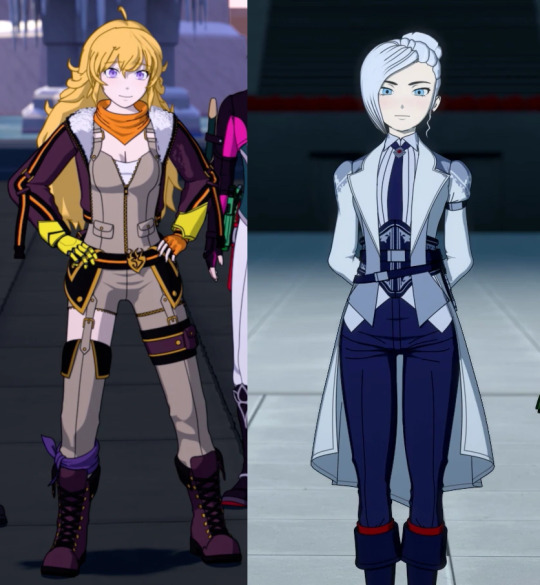
Yang Xiao Long and Winter Schnee: Professional Momsisters
“That’s why big sisters come first, to protect the ones that come after.” I don’t know who said that to these two, if anybody actually did, but it’s a quote that most definitely applies to them. Not only would they take a bullet (or a sword, or a fireball) for their younger siblings, they took the time out to give them affection and training that they needed when their own parents weren’t quite doing the job. If I absolutely had to rank one of them as the better momsister, I’d say Yang, but that’s really only because Yang had less to deal with overall; a depressed single dad not being able to pull himself together just doesn’t stack up with an abusive powermonger, a self-loathing drunkard, and all the institutional bigotry and pressure of Atlas. Plus, you know, Winter went into the military for a bit. Still, pretty good track record considering!
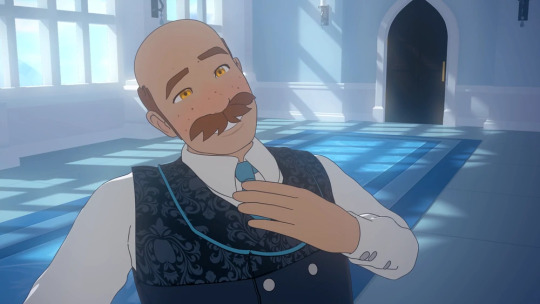
Klein Sieben: Doing the work of seven good dads
Look, there is only one reason Klein wasn’t listed before the momsisters, and that reason is that he is technically the hired help (and could therefore become the fired help). He is, hands down, a better surrogate parent than Yang and Winter, providing guidance and care to all the Schneeblings and very effectively undoing the damage Jacques Gele (HE DOES NOT GET TO BE CALLED SCHNEE!) did to them. And he even helped out Willow! If he was allowed to do more, he would absolutely be My Real Dad of the year.
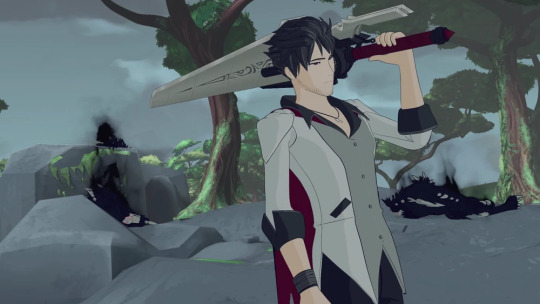
Qrow Branwen: “The only one that gets to be sad in this house is me!”
Qrow has a lot of flaws. Like, so so many flaws. As Yang said in a noncanon spinoff, he’s cool but not exactly a role model. Thing is, you don’t have to be a role model to be a good parent--you just have to make sure your kids (or nieces in this case) get good advice and the opportunity to grow into the best versions of themselves they can be. And when Qrow’s not beating himself up or drowning his sorrows, he’s actually very good at helping Yang and Ruby. Honestly the only reason he’s not on the actual list is because he’s technically not a parent.
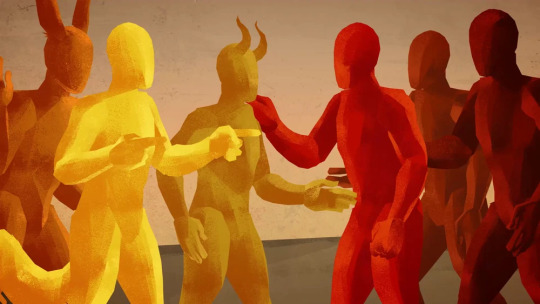
Uncle Copper: Adopting a blind kid automatically makes you cool
So here we have a character that appeared in a single flashback in the novels, but from what we do know he was pretty likely to be a good guy. Like, raising a blind kid is hard enough; raising a blind kid in a desert after their actual parents got nommed by sand is so, so much more difficult. And yet, this guy said ‘If nobody else is going to adopt this kid I will!’ and by all measures he was a very caring and loving guy. Also, shout-out to the tribe, who took Fox in after Copper got killed by some maniac (and also killed said maniac). Fox has had a rough life, but it’s been filled with supportive people. Not everyone can say that.
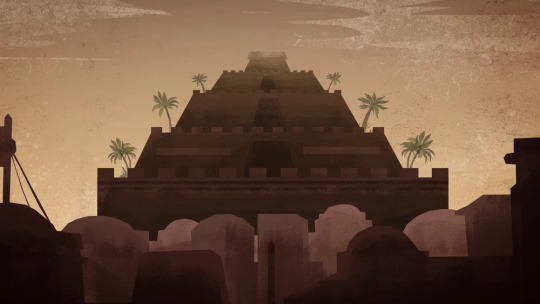
Starr Sanzang: She put up with Sun
Sure, she’s only had one scene in one novel, but Starr showed patience and caring and... probably did a lot to make sure Sun stays as aggressively cheery and patient as he is. Plus she’s got a dojo in Vacuo now... okay, I’ll be honest, I don’t know nearly enough about her to really assess her. Still, as far as cousins go, Sun Wukong could do a lot worse. And there are the implications of their motifs to factor in...
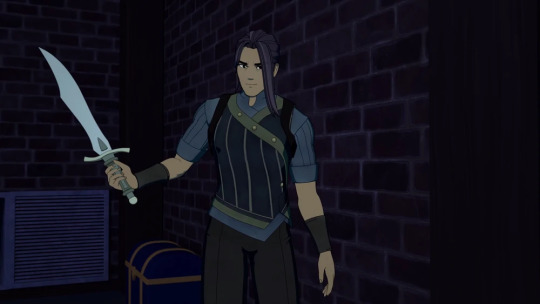
Rhodes: If you’d done even just a little bit more--!
So, reasonably, what would you do when you see a little girl enslaved with a shock collar? Would you (A) get the girl out of there, (B) arrest the woman doing it, (C) try to get the girl therapy, or (D) all of the above? If you picked (E) secretly train the girl in swordplay so she can join a huntsman academy when she comes of age, then congratulations! You’ve given her hope! Good for you! And what if she snaps after five years of literal torture, kills her abuser, and then turns to you for comfort and/or approval? Welp, obviously she’s an irredeemable criminal and you have to bring her in, crushing all the faith she had in you and herself.
Seriously Rhodes, dropped the ball hard on that one. I’m only mentioning you because you had such a serious impact on Cinder’s development.
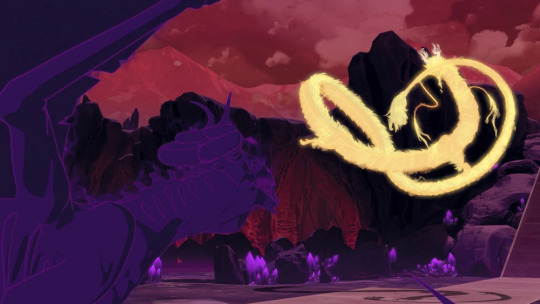
Brother Gods: Creating and destroying entire species
Like, okay. Look. These are the two that made humanity, so an argument could be made that they’re humanity’s parents. But, by the strict and arbitrary rules I have selected, they aren’t parents. And even if they were, they would be just the worst sort of parents possible. Darkbro is bad enough, what with viewing only strength as valuable and creating the Grimm and, you know, annihilating humanity that one time, but he’s at least honest and honorable. Not like the cryptic Lightbro, who doesn’t bother making sure people understand him, who doesn’t even keep his own promises to his brother... I get that they’re basically overpowered children. Yeah, they are. Still... kinda terrible.
So, now that that’s all done, let’s get to the actual list! After the break, so you don’t get stuck scrolling a lot. RWBY parents, from best to worst, are as follows:
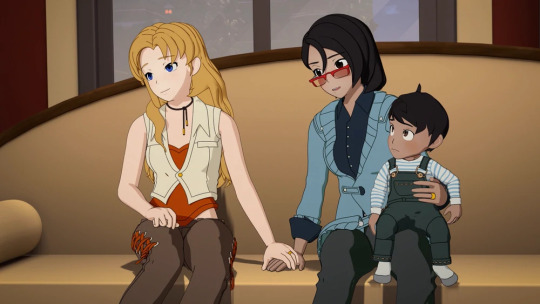
23. Saphron and Terra Cotta-Arc: Two moms are better than none!
If I’m rating all the parents, and I am, then I have to acknowledge their flaws. And... these two don’t have any! Okay, fine, they used Adrian in a criminal scheme that one time (and that was literally just asking him to cry on command) and maybe Terra’s overworked and, to be fair, parenting a young kid is a lot different than parenting a teenager. But not only did they support their kid, they helped out all the kids that needed to room with them for a while! Saphron may also qualify as a momsister, depending on how well the Arcs managed their massive-numbered horde of kids. Look, the point is: Excellent parents. Bam.
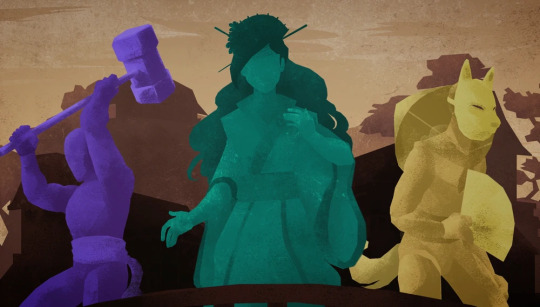
22. Yatsuhashi's Parents: Their slipups weren’t their fault
When your kid can wipe your memories and you don’t know about it, you’re bound to get a few mistakes down the line. Luckily for everyone, after the whole incident with Hiyoko Yatsu came clean, and his parents made absolutely sure that he understood (A) that having such an ability was a big responsibility and (B) that even though he really screwed up he was NOT evil. Given the man that Yatsuhashi is now, I’m pretty confident in calling them great parents--even if they only appeared in a book flashback.
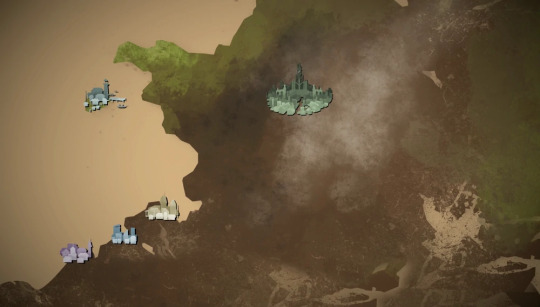
21. Coco's Dad: He exists!
That’s... honestly all I really know about him. He’s mentioned once in the books, and Coco has a few brothers. I’m kind of just assuming he’s a good parent from that, even if he didn’t figure out how to help Coco with her claustrophobia. So... yeah, shrug, Coco’s got a dad.
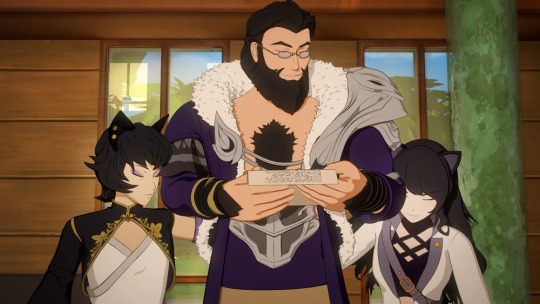
20: Ghira and Kali Belladonna: Actually marvelous people
Loving. Caring. Mentoring, protective. You may be asking why these two aren’t lower on the list, given that they are absolutely great for Blake, and I’ll have to admit that they only really made one slipup--letting Adam talk with Blake.
And okay, look. The thing about people like Adam is that they don’t start out showing their true colors. It’s always a slow, gentle broil. Blake was young and stupid, Adam was cute and edgy, and these parents want their daughter to be happy. So not twigging on what Adam really was--or at least not being able to properly convince Blake--that’s entirely understandable. And they did instill her with a strong enough moral code to leave when enough was enough, and they absolutely welcomed her back with open arms. Frankly, if the lower-listing parents didn’t exist, I would happily say they are the best parents in the show.
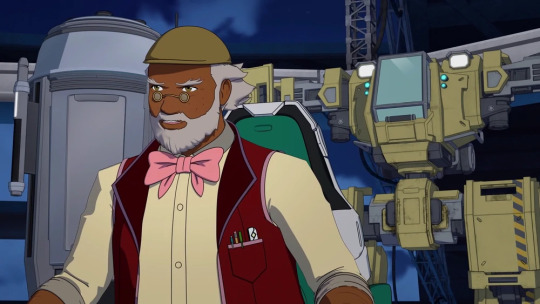
19. Pietro Polendina: He took Penny’s death flags
When you carve out part of your literal soul to bring your girl back from the dead, you get MAJOR parenting props. And even beyond that, Pietro is an absolutely caring and supportive father to everyone’s favorite bundle of sunshine. Even when she’s put in the rough position she was in, Pietro did his best to help her out. His one big flaw, though, is being overprotective and a bit presumptive. He does want Penny to live her best life, but he also can be just a touch too quick to say he knows what’s best for her. To his credit, when he’s called out on it, he does mend his ways. And he’s at least better then the GENERAL...

18. Salem and Ozma: Good parents, surprisingly!
Sure, Salem decided that world conquest was a good idea and wanted to put down anybody that wasn’t directly from her bloodline. Sure, she psychologically manipulated her husband when he had doubts. And, being fair, it’s highly likely that her four daughters were killed in the crossfire of her and Ozma’s little tuff. But! That was likely an accident, she’s been shown to still clearly mourn their passing, and before that point she absolutely loved and adored the girls. Ozma gets points for being a generally good person who fell in love with her before she became unstable and, honestly, was just trying to help his girls escape... and hey, he blames himself for their deaths. As does Salem.
Just because they’re kind of directly responsible for a LOT of Remnant’s woes doesn’t mean they aren’t good parents!
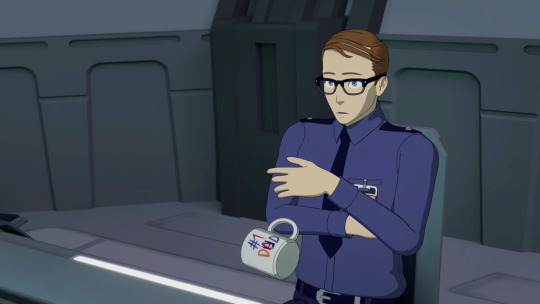
17. Will and Meg Scarlatina: Estranged but loving...
Yes, I know Rooster Teeth hasn’t officially confirmed that Bill is Will. I still believe though! Also it makes for a great picture, in any case.
Look, you can be the best and most loving parents ever--and from what we saw in the novels Will was definitely loving--but if you split up, your kid is going to get a little stressed. And hey, it’s not like these two were terrible people! Velvet’s just got a lot going on because of things entirely out of her control. Parents are people too, but sometimes the stress of one situation will leak out into another. Just... give people time to adapt.
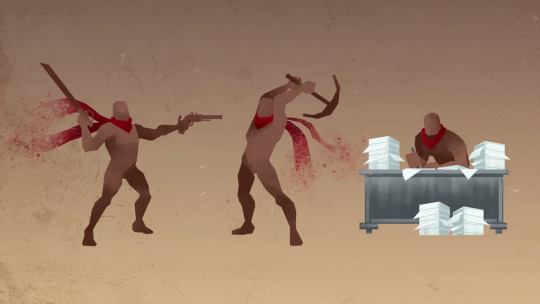
16. Nicholas Schnee: The man, the legend, the titan!
Nicholas Schnee is the rockstar success story of Remnant. Some guy from Mantle put in all the work to make the SDC, and honestly from what little we know about him he was probably a great guy! But if we’re registering parental goodness, well... he wasn’t quite smart enough to warn Willow away from abusive gold diggers, and he’s not present when the story starts. So, yeah, even if he was a good parent otherwise--and I think he would be--he kinda... didn’t put in the work to prevent Willow breaking later. Still. Not deliberately terrible!
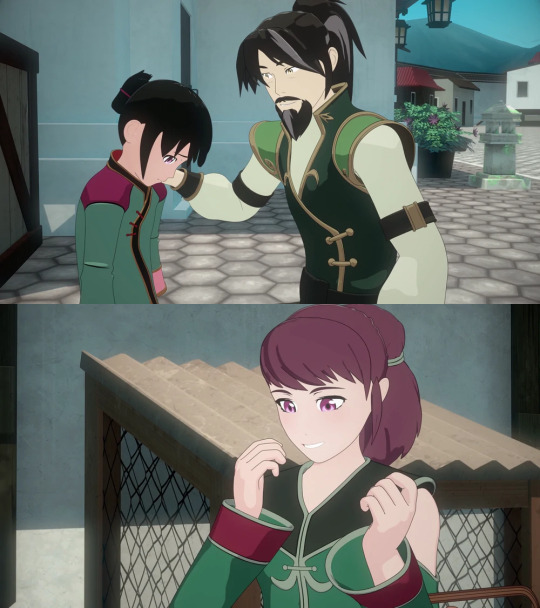
15. Li and An Ren: Don’t die in front of your kids, folks!
Seriously, it traumatizes them, especially if there’s a Grimm assault going on at the same time. Oh, double-especially if you reassure them that everything will be fine literally the second before the roof collapses on your head. And... well, okay, you couldn’t help your son and some random girl being the only survivors...
In all seriousness, that whole situation was absolutely out of their control. And before their deaths they were shown to be loving, wise, giving good advice to Lie Ren and helping him understand what the right thing to do was. Honestly, if they hadn’t died in front of him he’d be a lot better, mentally speaking. His trauma is not their fault. Plus Li went out distracting the big Grimm so Lie could run. No greater love hath man, indeed.
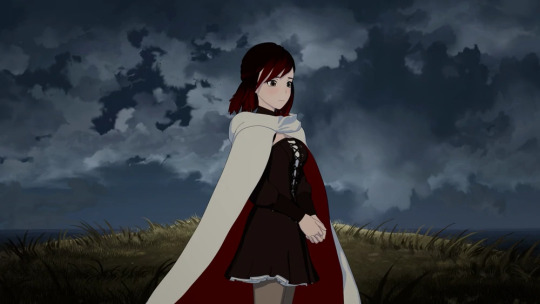
14. Summer Rose: Loving mother, ticking trauma bomb
When she was around, Summer Rose was probably the best mom Yang and Ruby could ask for. Sure, everyone could be exaggerating a little on how great a person she was--fond memories and grief can do that--but even taking that into account, she was probably a great and wonderful woman to be raised by. And hey, it turns out the reason she vanished was to go confront basically the Devil Herself so her kids wouldn’t have to live in a world where she existed! I can totally get the logic behind that.
And to be fair, “I’m going to do this on my own so nobody else suffers” is a pretty common character flaw among the RWBY cast. There are entire arcs where each character learns to overcome it. Still, wandering off on your lonesome without telling anyone was not the smartest move, Summer. Especially if you expected to die--which, you know, Devil Herself, high probability. And you know, if you had died, that would be bad enough, but now Ruby’s practically certain to have to fight your grimmified self. At least she figured out what happened to you before Salem decided to hammer in the trauma button, so she’ll be a little more ready, but... seriously.

13. The Arc Parents: Look, you try juggling eight kids!
To be fair, neither Arc parent has appeared on screen, but we can derive some of their traits from their kids. Jaune’s father said women like confident men. Jaune’s mother said strangers are friends you haven’t met yet. Jaune’s sister moved out of the house and (it’s implied) was happier for it. Jaune himself took his family’s ancestral weapon and ran off to Beacon to become a hero without any training whatsoever....
I get the impression that these two are not horrible parents, but they aren’t really stellar ones either. They slip up, don’t understand their children, give some really bad advice (as well as really good advice), and... look, it’s kind of middle of the road here. The Arcs could be wonderful people that just weren’t ready for the complexities of raising eight kids. I come from a big family myself, I know it can be stressful. And their kids turned out well anyway, so...

12. The Mother of Pyrrha Nikos: You taught your girl too well
Hero complexes are funny things. And Pyrrha Nikos... in retrospect, she was really hiding a lot of insecurities under that facade. Laying it all at this woman’s feet is unfair, I’ll admit, a lot of that came from being The Mistral Champion. But... with stories and fairy tales of heroes, it’s not hard to imagine a genuinely loving mother making sure her daughter knew right from wrong, always knew to act with mercy and protect the weak, and made her hardline into being a hero at the cost of her own... sense of self. It wouldn’t even be something either of them noticed, really. Good people can make bad choices sometimes.
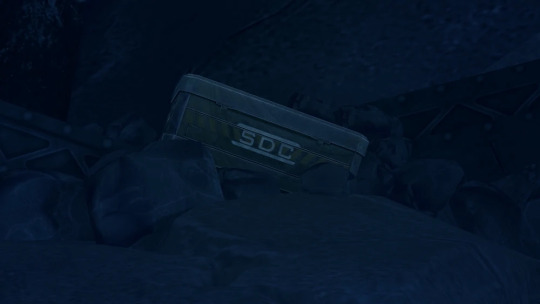
11: Ilia's Parents: Oh god, can good people make bad choices...
So the idea of getting Ilia up to Atlas for a better life, that rocks (if you assume the propaganda to be true). And I’m certain her parents absolutely did what they did out of love. But what they did, you see, was tell Ilia to hide a very important part of herself from anybody who could find out, since it was likely she would be kicked out of the school she was in if people found out she was a faunus.
Which actually, did a lot of damage.
I mean look at Ilia now! She has trouble expressing herself until she explodes, she follows a crowd instead of her own morals, she broke down in tears when she finally did the right thing... Conceal Don’t Feel is never good advice, and these two went on and said ‘Honey, because of racism, you have to hide the fact you literally change color when you have emotions.’ Oh, and then they died offscreen--again, not their fault, but boy howdy did it give Ilia a complex.
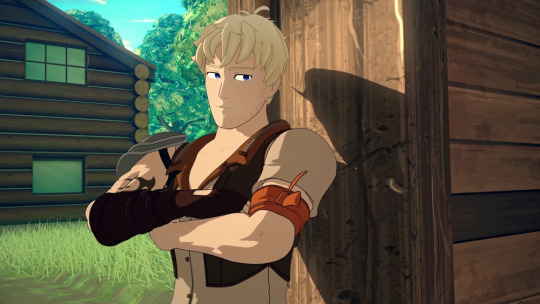
10. Taiyang Xiao Long: Slumped at just the wrong time
Honestly, Tai as he is now is a wonderful dad. Supportive of his daughters in their time of need, able to lift their mood with a tasteless joke or two, frankly if we were assessing just how they were in the moment... I’d still be a little critical of his refusal to talk about the girls’ mothers, but hey, that’s minor. Compared to, you know...
Okay, so this needs serious addressing. Taiyang cannot be blamed for falling into a depressive slump. People can hurt, and need time to heal. That said, his depressive slump is at the root of Yang’s many issues, and frankly if she hadn’t had to pull herself together for Ruby she would be a major mess. It’s a bad situation all round, even if it’s not his fault.

9. Willow Schnee: “Kids, don’t wind up like me.”
Drowning her sorrows isn’t the best way to handle being stuck in an abusive marriage, but it was the best way Willow could think of. And, yeah, that really cut into her skills as a mom... but despite that, she did her darnedest to make sure her kids had what they needed to free themselves. Heck, once Jacques was out of the picture, she even pulled herself together and risked her life to save them! A broken women, to be sure, but not a shattered one.
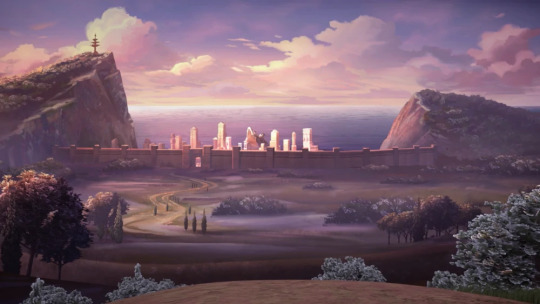
8. Neptune's Mother: She exists!
Being fair, there’s not a lot to go on here. We know Neptune’s mother is a lawyer (insert evil lawyer joke), that their family are famous swimmers, and that his brother caused his hydrophobia by tossing him into the water. It does paint a bit of a picture, though, of everyone having expectations for Neptune that he was not able to live up to. Pretty poor parenting, if it’s true.
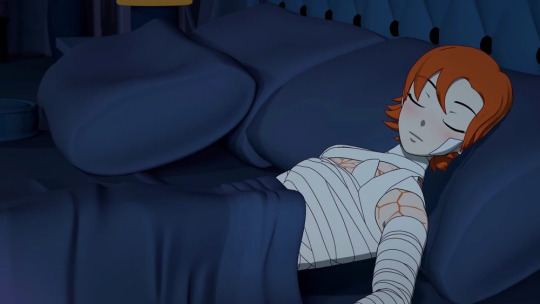
7. Nora Valkyrie's Mom: Come get your girl!
Literally the only factoid we have about Mama Valkyrie is that she abandoned her to the Grimm. We don’t know when this was, and it’s feasible it’s a case of ‘Oh No I Lost Track Of My Daughter In The Panic!’ But given we see young Nora scavenging for scraps of food... I’m not optimistic on her parenting skills.
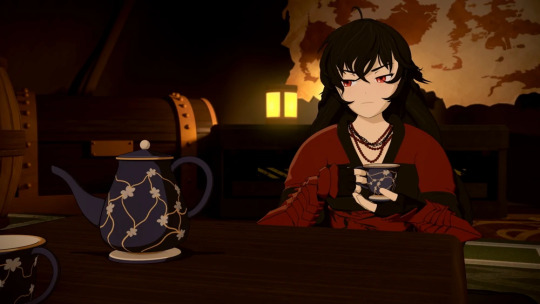
6. Raven Branwen: "I wasn’t part of your life, how could I ruin it?”
Raven is just not a good mom at all. And, surprisingly, she seems to know it. Or that’s one interpretation of her character. The thing about Raven is that she plays her cards close to chest. We still don’t know why she left her daughter, and we only have inklings about the reasoning behind her behavior once they reunited. In the end, though... she did concede to Yang, she did apologize for something, and there’s a very deliberate indication that a lot of her behavior is a mask to both others and herself. So, terrible mother, for the moment, but self-aware.
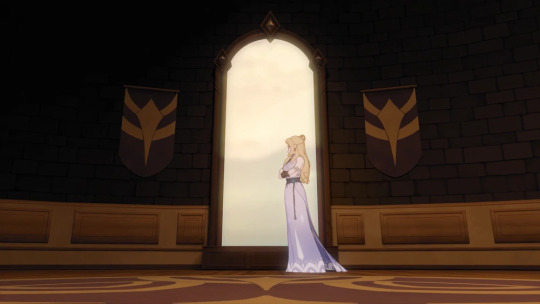
5. Salem's Father: Explicitly noted as cruel
We get a bit more about Salem’s father from ‘Fairy Tales Of Remnant’, how he became possessive of the last remnant of his wife and locked her away in a tower. From what we know of him, that’s all he did--lock her away and not let her go. Still makes him a terrible dad. And with this, we transition firmly into the most definitively abusive parent figures. Everyone before this might have the excuse of not realizing what was going on or having their own damage, but now we’ve got parents actively deciding to make their kids’ lives worse.

4. Jacques Gelé: HE DOES NOT GET TO BE CALLED SCHNEE!
His children are property, to be manipulated and traded for the benefit of the company he married into, and any defiance is to be quelled instantly. He is manipulative, scheming, abusive, and frankly the worst sort of scumbag to ever wear a white suit. He does have the single redeeming quality of only leaning into the punishment if it benefits him; nobody would ever accuse the man of being needlessly cruel. His name is Jacques, and you will hate him... especially on the rare occasions he actually has a point.
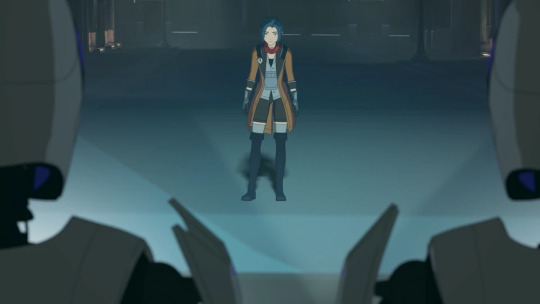
3. The Marigolds: There’s no peppy tagline, they’re just mean
There’s not a picture of these jerks on the wiki, so you’ll have to make do with the woman that is no longer their daughter. See all that empty space around her? That’s about as close as they ever got. May spells out how much they hated her for having a heart, and how little they cared about her as a person, in one epic line. And even if they have other redeeming qualities (unlikely) we can tell they’d probably still be terrible parents because of how sleazy May’s cousin is. Honestly, for once I’m glad some characters don’t get pictures. They don’t deserve to be remembered. They aren’t even the cool kind of evil, they’re just... gross.

2. Marcus Black: Look if you train your kid to be a killer...
...you’re going to have to expect them to kill you. I mean, you basically ripped apart Mercury’s legs, man. He had to get cyberlegs. Also, you used your semblance to steal his. Which, given that semblances come from aura, and that aura is a manifestation of the soul, is kinda... that’s a deeply personal and intimate violation. Sure, you got your assassin kid. And can we talk about the fact that Marcus was an assassin? It’s not a pretty job. I guess I can see all the abuse--physical and mental--as a good way to train up another assassin, but... geeze, if that’s your goal, why did you use your own kid?! Why not hire some angsty teenager?! Yeah, no, Markus Black stood high on my list of parental monsters... and was only toppled by the arrival of one other.
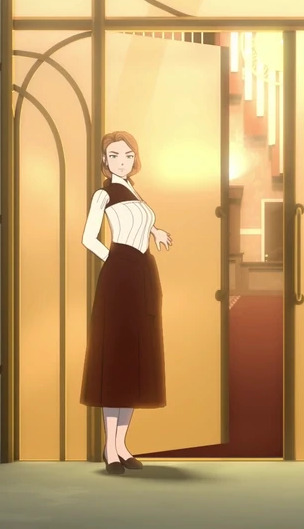
1. Madame of the Glass Unicorn: She only appeared in one episode and she rocketed to the top of this list, that should tell you something
Let’s be clear here: What Madame did to Cinder is bad enough. It was literally slavery. Enforced by a shock collar. And because the collar looked like a necklace, she pulled it off in front of I don’t know how many clients. Granted, said clients were racists, why else would they be customers at a ‘We Do Not Serve Faunus’ hotel, but keeping her torture just out of the public eye very clearly shows both that she knew what she was doing was illegal and that she was clever enough to avoid detection.
Oh... and then there are her birth daughters.
With Cinder, she was abusive to a dangerous degree. With her daughters, she was permissive, not only allowing but encouraging them to bully their adoptive sister. The whole point of parenthood is to teach your children how to become the best version of themselves, but Madame didn’t even bother to instill a semblance of morality in these girls. She used them as extensions of her will, and they obliviously played along because that was all they knew.
You’d think the biggest monster on the show would be the Grimm woman, but no--it’s some random lady with a hotel.
#RWBY#Analysis#Ranking#I had the urge to make this#Feel free to disagree#Some of this is opinion-based
66 notes
·
View notes
Text
I am very confident this story will have a happy ending, not only doing Phutian justice but also Phupha and Tian individually too.
Here’s why.
(Note: I still have not opened the tags at all or read any other thoughts about this episode. I wanted to get all of my own thoughts written out for my own sake before I added anyone else’s to my brain. Thus, if anyone has written a similar post to this, I promise I did not read it!! These are thoughts straight from my own mind.)
My biggest wish this entire series has been that Tian would come to forgive himself. Even if he didn’t end up with Phupha and didn’t stay in the village, I wanted him to come to recognize his own value and his own abilities and to finally let go of the guilt that had been eating away at him for months. To me, that was the most important thing and the lesson that has been set up for the entirety of this show.
And in this post right here from after episode 7, I wrote about how I believed this story had to end with him finding peace with himself and acknowledging his self worth. For the most part, that has been how the story has progressed, and I full-heartedly believe that is how it will end.
So let’s look at where the story is after episode 9. Things are... still a bit messy. Tian is leaving. His relationship with Phupha is on the line. The children are losing another beloved teacher. And once again, Tian feels like his life is being controlled for him.
It seems Tian has always felt like he was suffocating. He has said many times that he never felt a sense of pride in himself because he never knew what he was capable of. Everything was done for him, and every decision was made without his input.
I want to add that I appreciated Tian saying to his father that he wasn’t denying that having a comfortable life is everyone’s goal. He wasn’t discrediting the things that his comfortable life afforded him. But he also knew that he hadn’t done most things for himself and in many ways wasn’t even able to do them for himself, and then after the surgery, he wasn’t able to do anything for himself. And that wasn’t the life that he wanted.
I imagine too there were a lot of pressures and expectations at home for Tian to continue the family name and follow in his father’s footsteps in some way. Maybe not career-wise but to continue making the family proud. To carry on the legacy in one way or another and to inherit the life his father created for him.
And if we really dig deeper into his life, it seems nearly everyone has thoughts about his life and how it should be. Not just his parents and his doctors but even his friends. When he went to meet them post-surgery, they started making comments about how it must be weird to have someone else’s heart and asking if he wanted to know who gave him the heart. They were putting pressures on him about how to feel and think about this really difficult situation he was in, and he got overwhelmed.
Even Tul, who we absolutely adore, came to visit Tian and immediately started discrediting his happiness in the village. He told him it wasn’t his real life, questioned how he could survive without electricity and internet, and didn’t believe him when he said he was really happy in the village. Of course, Tul also fully validated his sexuality and supported him staying in the village (bless him), but we can’t deny the fact that even he had his own opinions about what Tian’s life should and should not have looked like.
I imagine growing up the way he did, at some point, Tian probably just accepted the lack of control he had over himself. Him giving up would have only enabled everyone to continue involving themselves in his life, and thus an unfortunate cycle would have been created.
And then when he got sick, that spiraled even further. Not only did he have people controlling his life but he had this illness that could literally take his life at any point.
And then of course, post-transplant, there is the pressure of Torfun and his own guilt. This entire show, Tian has been battling with himself about his own happiness, because at the end of the day, though he was learning about his own abilities and finding pride in himself, I also think he was always questioning the validity of everything. He was constantly at war with himself about what was and wasn’t his, what he did and did not deserve, etc. He was making decisions for Torfun and struggled to separate himself from her time and time again.
But at the same time, he felt freedom in the village he had never felt before. For the first time, he felt like he was making his own choices. Yes, most made also for Torfun, but arguably he still felt he was able to make the decision on his own about whether or not to help Torfun.
The longer he was in the village, the more his guilt grew. He even said that himself, that the more comfortable he got in the village, the harder it was to keep that secret.
But simultaneously, the longer he was in the village, the more he could picture staying there: with Phupha, with the kids, and with the forest. I think by the time Phupha got shot, he was prepared to extend his time there (despite the back and forth feeling that he was putting the village in danger by staying). He was happy, and he wanted to hold onto that happy life.
Then when things were looking up again, Phupha healing and safe, Tian found out his father had always been pulling the strings behind the scenes. The freedom he thought he had was a facade. And not only that, but he felt that Phupha’s love was a facade too, bought by his parent’s money or power. This life that he thought he had suddenly felt fake, and the sense of control over his own choices he thought he had disappeared.
Once again, he felt powerless. And on top of that, betrayed.
I wrote a whole thinkpiece here about why I understand Phupha’s decisions and why I believe he was acting in character in episode 9. While he was in the wrong with how he was handling everything, his intentions were good, made from a place of genuine love for Tian.
But now Tian wants the village. He wants this life, and he knows it. But everyone around him is verbally doubting his reasons and his abilities to do so, and GOD, he’s so frustrated. For once he knows what he wants for himself, and everyone is pushing him away from it.
We all know Tian’s parents think they understand his future best. I actually felt it was rather ironic when Tian’s father told Phupha that he knew his son well, while in the same breath, told Phupha (the man his son is in love with) to make Tian leave the first place he felt truly himself. He knows nothing about his son and continues to not hear or see Tian when he tries to make him understand. So his parents trying to force him into a life he doesn’t want is no surprise.
But then here is Phupha with his genuinely good intentions forcing Tian out too because he does not see the way he is contradicting himself. He tells Tian to live for himself but does not give Tian the option to stay for himself. (Again, I wrote a lot about Phupha in this post that I’m not going to repeat here, but I’m using the logic I explained there when talking about Phupha here. So if you’re curious about why I am not overly angry with Phupha, read that.)
I think it’s really important that in more recent episodes, we’ve heard Tian start acknowledging his own capabilities and growth. He finally began to see his value, and the lessons he has been learning are starting to really solidify for him. He’s genuinely beginning to understand what this whole journey has taught him.
Unfortunately though, he was always making his decisions ultimately for Torfun. Or at least, in his own mind, repaying Torfun for this new life was always the motivation. As I said earlier, he was in this constant battle between his own happiness and the duty he felt toward Torfun.
But now... he’s finally closing that chapter with Torfun. He told his secrets. He gained forgiveness from the village. He heard Phupha tell him to live his own life.
And he’s learning to forgive himself.
So now as he’s entering a new stage of freedom, away from the grip his own guilt had on him, he’s faced with a new challenge. He’s faced with people who love him once again thinking they know best for his life. As he’s exiting one chapter, he’s entering a new one, and this one won’t come easily. But he’s entering this one better prepared after all of the lessons he learned about his own strength and capabilities, and all of the happiness he found in himself... this is the moment for him to make use of the new knowledge and feelings he has gained. This is his peak, his opportunity to finally choose himself and pick the life he wants.
For himself. Just as Phupha told him he should do.
This is the test to see if he finally grasps how valuable he is as Tian. This entire show has been about him finding his own worth outside of Torfun, outside of his parents, outside of his friends, and even outside of the village and Phupha. Just the worth that he carries with him always, as Tian.
This will also be a lesson for Phupha, that sometimes our desire to protect the people we love can hurt them and ourselves. That we have to give people the option to make mistakes. That despite him believing he’s helping Tian, he isn’t, and sometimes he doesn’t need to be so self-sacrificing to take care of the people in his life.
Tian has been controlled by guilt, fear, sadness, anxiety, depression, physical illness, disability, medication, doctor’s orders, and money, plus all of the people in his life who thought they were helping him. But after everything he has been through, this is his moment to take control back. And I believe he will. I absolutely think that is the conclusion this story has been setting up from the very beginning.
Tian may return to Bangkok, but I believe it will be temporary. I expect he’ll get there and find himself so homesick for the village that he won’t be able to stand it. And when he returns to the Pha Pun Dao, it will be because he chose it for himself. Not for anyone else.
On his own terms.
And that will be the moment he recognizes just how immeasurable his self growth has been.
-------------------------------------
If I end up being wrong......... you never saw this post.
But I would be genuinely shocked if this is not where the story is going (or at least to some degree), because they set it up so beautifully to end up this way. In fact, I predicted generally that this was the moral of the story way back at the beginning of the show, and it has continued to move in that direction since. So if this isn’t the conclusion to Tian’s story, I’ll be highly disappointed that all of the lessons they set up for him (as well as for Phupha and the others) were thrown away after all of the build up.
They’ve added all but that final puzzle piece, and I’d be really shocked if they left the picture unfinished.
(This was much messier than I intended, but I really struggled to put all of my random thoughts into one coherent post. So I hope this made even a tiny bit of sense.)
#phutian#phupha x tian#a tale of thousand stars#atots#1000 stars#i'm not sure this is really encompassing what I wanted to say#i've had a lot of random thoughts about it but haven't been able to properly put them all together#but i tried#i have a lot of faith in this show#i genuinely do and i'm excited to see how they conclude what i believe to be one of the most beautiful stories i have ever watched
34 notes
·
View notes
Text
Eren and Historia
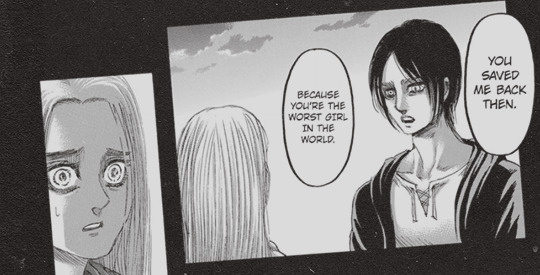
Eren and Historia have a connection to one another. No, I don’t think they are romantically connect, nor do I believe they are co-conspirators plotting to destroy the world together. However, the narrative is pushing the idea that Eren and HIstoria are somehow connected and continually pushing them next to each other. Eren kissing Historia’s ring is the trigger for his vision that commits him to the path of destroying the world. Eren uses Historia as a reason to accelerate his plan. Eren confides his plan solely in Historia. The reason this line is drawn between the two characters is that they are CHARACTER FOILS. Eren and Historia are two people who seem like opposites but they’re actually incredibly similiar to one another. Almost too similiar to ever et along. The extreme similarities between Eren and Historia, and their character foiling underneath the cut.
1. Historia’s Regression
So I’ve gotten countless asks on my opinion of Historia’s behavior in the final arc. My opinion is that we’re being shown the result of her regression to her pre-uprising arc self. Is this the best writing choice for Historia’s character? I do not know. There are two schools of literary analysis that boil down to “Is the writing good?” or “what is the author trying to say?” and I much prefer to stick to the latter. I think the text is attempting to portray Historia regressing on her character arc, and as a person to mirror Eren’s own regression.
Everybody is regressing in the final arc. Armin lets his poor self-esteem sabotage his decision making ability like he did in Trost. Mikasa is struggling to find a way to live without Eren and see herself as a person seperate from Eren because of her codependent nature, once again like Trost. Annie wants to pretend that this all has nothing to do with her, like in the female titan arc. Hange can’t make a decision without Erwin around and wants to leave it all up to him even though he’s literally dead. The characters in the final arc are written as still struggling with what we think they should have gotten over with in earlier arcs. Heck, Jean still beats up Reiner over what happened to Marco.
It’s not because after all this time the characters haven’t progressed in their character arcs at all. It’s because the story structure of Attack on Titan is chiastic. The beginning and the end are written to mirror each other.
Chiastic structure, or chiastic pattern, is a literary technique in narrative motifs and other textual passages. An example of chiastic structure would be two ideas, A and B, together with variants A' and B', being presented as A,B,B',A'.
Sometimes instead of character development being a straight journey from point A to point B, it’s instead more like a helicopter hovering around the point, continually circling it. The character has brief moments of revelation where you think they’ve had their big change only to regress later. Lemme use this example from Tokyo Ghoul to illustrate my idea.
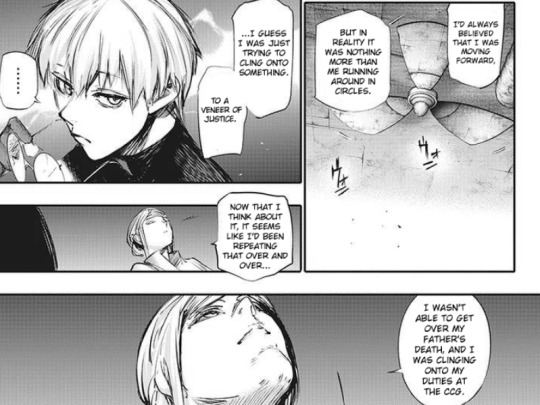
A character seems to be progressing, and we believe they are, only to regress in the end. I think narratively there is a very strong reason for Isayama using this style of character development. Every single major character is either a child soldier right now just barely on the cusp of adulthood, or they like Levi were child soldiers at one point or another. The adults, few that they are, are all either cast as incapable of acting as strong decisive role models (Hange) or are killed off eventually (Erwin).
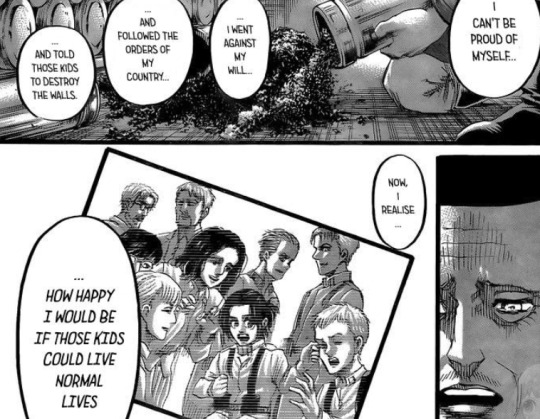
It’s like what Magath expresses in his final words, these children were never allowed to have a normal life because of him. If the narrative is about the evils of using child soldiers on both sides, both the Scouting Corps and Marleyans, then it would make sense that every single character is portrayed as either a child unable to grow up or an adult that has continually failed them.
What we are being shown is every major character with an arc struggling with being unable to truly grow past who they were as children. Even when given the oppurtunity to grow, they falter with it, because they are child soldiers stunted by their trauma and that’s not an easy thing to overcome. Rather than a straight line we’re shown a circular process. Gabi and Falco are the only characters being shown with fully straight line arcs, but they are also far simpler than the other characters because they are children, and not stunted adults acting like children. Armin is passive, day dreaming, indecisive like he was when he was a child. Mikasa is overly attached to Eren like she was when she was a child. Heck, even Connie’s major flawed decision this arc is wanting his mother to return. Whcih is a symbol of wanting to return to the safety of childhood that he was suddenly and abruptly cut off from.
Okay, that was a long tangent but I hope I have made my point on what I mean by regression. Eren and Historia are paralleled with each other because they more than anyone else, are regressing to their childhood selves. Where we see at least hints of progress with other characters (Armin, MIkasa, Jean) indication that they will eventually rise to the responsibility of adulthood we see only stagnation for these two characters. It’s because once again Eren and Historia are incredibly similiar as people. Heck, even the fact that they’re regressing the most is paralleled. The same chapter in which Eren declares he’s using the child Ymir’s power to destroy the world, we’re shown a flashback of Historia first and foremost.

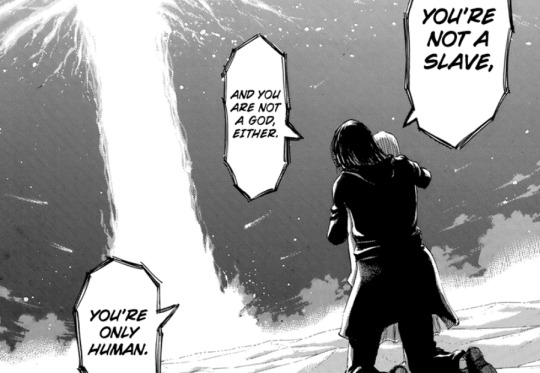
Eren empathizes with little girl Ymir, and Historia was told as a child that she should learn to be like Ymir, always kind and always putting others first. They both see themselves in Ymir and it symbolizes why they are connected, because deep down they are both that powerless little child.
There are two big connections between Eren and Historia immediately. Number one is that the inciting incident of their trauma is the same. Yes, Historia grew up in a household where she was eteranlly bullied and belittled where Eren grew up fairly love and secured but they both suffer from the same traumatic incident.
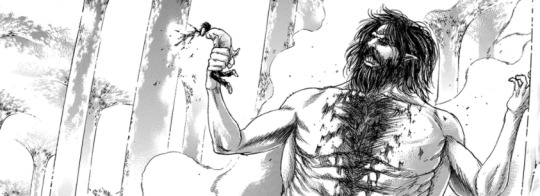
A titan suddenly killed the person who was the symbol of unconditional love and security in their lives, for Eren it was his mother, and for Historia her older sister. In a situaiton where they were completely powerless, they watched a titan kill their security and destroy their home and are rendered homeless children after that point. They both join the titan corps as a way of survival. The reason that Eren is shown encouraging his father to pull the trigger and completely eliminate the Reiss family, is because narratively these two events are supposed to be connected. They’re narrative parallels. Eren suffered the loss of his mother which is the root of his trauma, and then has a hand in inflicting that same trauma on Historia.
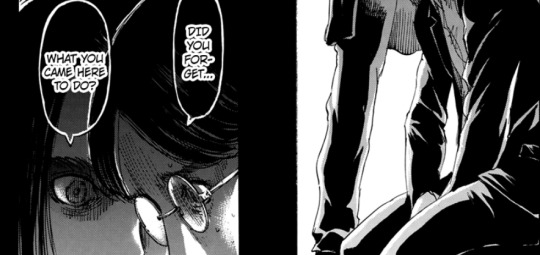
They are two people connected by the nature of their worst trauma and what it did to them. Every time they try to progress as people, they instead regress because what happened then was so fundamanetally damaging it robbed them of the ability to be able to grow up. They will never feel like they have the security that children need in order to grow into adults.
Historia and Eren are mirror images even in their lives. Eren is an ordinary child given an ordinary childhood. Historia was marked as different from birth and raised as a special person. However, they ended up in relatively the same position. They both regress. The nature of Eren’s regression should be obvious because he’s trying to destroy the world. In essence Eren has remained the same character all throughout, his primary goal was to kill all the titans beyond the walls, it’s just his target that has changed.
So, let’s focus instead of how Historia has regressed. I will say before I begin though that Eren and Historia regress as opposites. Eren will always choose to be active, even if it means stealing agency from others. Historia will always choose to be passive, even if she has power over others. When they are pushed into a corner by circumstances they fall back on their worst habits and that’s why we see them regress. Externally, they have different mechanisms to handle it. Eren steals agency, Historia gives up agency. Internally, it’s practically for the same reason, because whatever security they have is continually ripped away from them leaving them unable to grow as people.
So what is Historia’s regression? Basically Historia, like Eren is lacking of a sense of self. Historia has no consistency deep down to show who she is. Even with most of the other characters as childish as they can be have this, Mikasa is overprotective and likes family, Armin is a dreamer who wants to explore the world, Annie is self centered and wants a peaceful life. Eren even comments about this in regards to himself when comparing himself to Eren. Eren centers himself around violence, war, and his hatred. Armin has something else besides fighting, in order to build himself around. Therefore, Eren considers himself lacking as a person in comparison to Armin. Who would Eren be if he wasn’t trying to destroy all the titans? That’s a difficult question to answer.
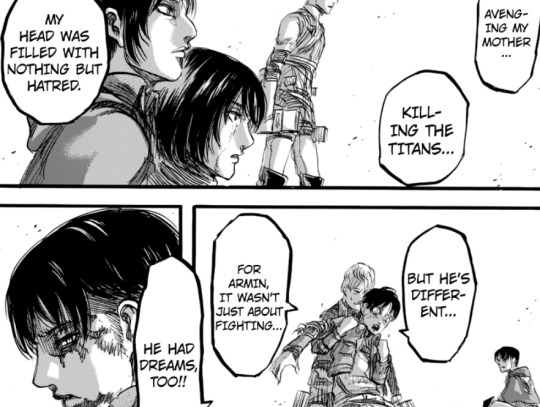
Historia is much the same way. Historia builds herself and her self of identity around the roles that other people ask her to play. The little girl Ymir is kind because she always did what others ask of her. Historia is always performing some role for the sake of everybody around her.
I wouldn’t say that Historia’s arc in Uprising ends on a triumphant note, but rather an ambiguous one. The arcs aren’t lines, they’re circular. Historia even questions herself if she’s moving for the sake of herself or others.
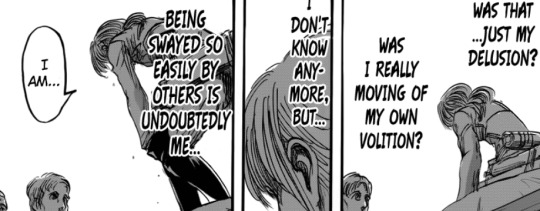
Here is how I see uprising. Your interpretation might differ. Historia steps out of the role of Krista. Historia, tries to be herself for a moment. At the end of the arc, rather than true liberation Historia chooses to step back into the role of queen. The only slight progress made is that she doesn’t entirely listen to Erwin’s orders. However, even her act of slaying a titan within the wall was a pre-planend action, a performance. It’s just one Historia altered slightly to give herself a more centered role.
If Historia is not someone moving to help others than who is she? We know she’s spunky, angry, etc. etc. but as a character she hasn’t really developed goals or wants and needs outside of that. We continually see her on the brink of that point, but never quite crossing the line.
Eren and Historia are at the center of their existence very performative people. The reason nobody quite understands Eren is that he’s always putting on an act around other people.
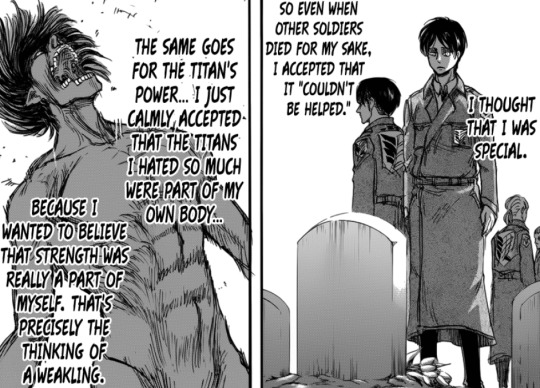
Eren and HIstoria even doubt the same things in chapter 68. That is to say, they doubt themselves. They doubt if they are really truly people who are capable of moving for themselves. Eren sees himself as someone who has nothing special about him, and therefore doesn’t matter. Deep down he’s always viewed himself as a weak and pathetic person. Historia doesn’t think she’s capable of making decisions for herself. It’s because they’ve been continually made to feel helpless all of their lives, that they doubt themselves to this degree.
Their response to this is to perform for everyody else around them. Eren si continually performing as this super strong, determined child ready to fight the whole world. Whereas, Historia is performing in the roles that other people give her. She is Krista Lenz. She is the queen Historia Reiss. She is, always, always, always, what other people need her to be. Whereas, Eren performs what he wants to be, which is powerful.
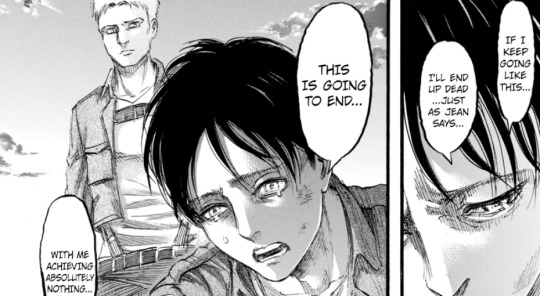
When Historia and Eren break down it is shown just how deeply similiar they are inside. They become what they continually are made to feel like, helpless children. Eren is constantly boasting about how he is going to kill all the titans, and yet deep down he’s always believed that he was all talk and that for him there was nothing behind those words.
It’s the same for Historia just in an opposite direction. Historia is constantly talking about helping people, but deep down she doesn’t see herself as a genuinely altruistic person. Not only does she see herself as helpless (therefore incapable of helping people because she can’t help herself) but she sees her motivations for helping people as selfish.


In the Uprising arc we even see this parallel. I mean I know many people interpret this as Historia’s big moment of independence, which is also a valid interpretation. I’m just giving you my interpretation. I also see this as Historia having a massive mental breakdown in the middle of a crisis moment. When they are pushed to their absolute limits and they can no longer pretend, Historia and Eren both break down and we see what they view themselves as. Eren sees himself as a crying and begging child insignificant, unpowerful, and helpless. Historia sees herself as a selfish child and a bad person. This is also something that reflects their upbringing. Historia was continually made to feel selfish due to being an abused bastard, for wanting even the most basic necessities a child needs like love and security. Eren had his security ripped away suddenly when his mother died and he was at the time, a helpless, crying child only able to watch.

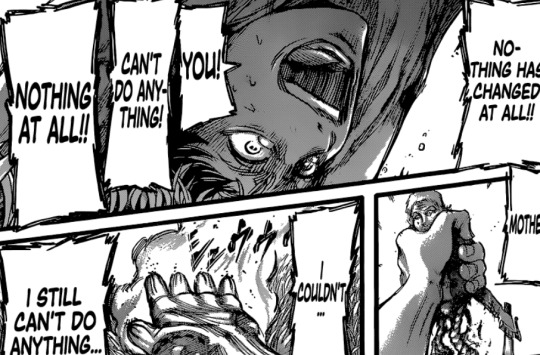
When Eren breaks down he says the same thing always. Nothing has changed from back then. Nothing has changed from when I saw my mother died. When Historia breaks down she says she can’t live up to the expectations of other people around her.
Eren and Historia both see themselves as fundamentally unable to change from who they were as children, and that’s why we see them regressing to their most childlike selves here in this final arc.
2. What is the point of Uprising Arc, then?
I know I read uprising differently from most of the people on this site. However, I’m not saying that Historia didn’t grow in Uprising at all, or even that she doesn’t have a chance to grow. Honestly, I think Uprising does a good job at portraying the complexity of Historia’s character and why it’s really, really hard for her to grow in a straightforward manner. She’s not really the heroine of the story where she defeats the bad guy, and then overcomes her flaw in a dramatic fashion at the end of the arc.
Okay, so I’m going to try to address how Historia’s arc is still... you know, an arc, even though it doesn’t continue on in a straightforward fashion from Uprising. Uprising isn’t pointless because it shows us the great depth and complexity of HIstoria’s character, and also establishes why it is so hard for her to change. It’s not a straightforward arc, more of a dig into her psyche. Historia steps out of the role, Historia tries to be true self for a moment, Historia steps into another role at the end of the arc. It may seem pointless to read it this way, but I’m going to try to dig in from this point forward to show the complexity that this demonstrates.
So, like I said Historia is a character who lacks a sense of self. The reason that Eren perceives this of her so strongly that it’s what forges their friendship in this arc is because Eren is the same way.

Eren picks up on the fact that Historia was always striving to meet the expectations of everyone around her, because Eren is very much the same person. The kill all the titans thing is an act. Everyone around him believes it to such an extent that not a single person, even his closest childhood friends understood him enough until it was too late.
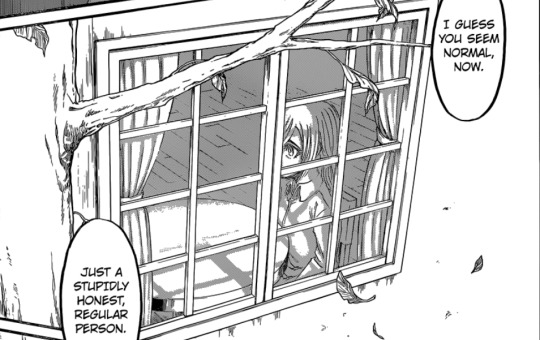
Eren also tells Historia he sees her as a normal girl, because it’s who Eren wants to be accepted as, but feels like he never can be. Before I go into uprising itself there’s the big inciting events for both of them that lead into where their characters are in the lead up to Uprising.
Eren and Historia both have a moment with their respective love interests in the prelude to this arc. Historia begs Ymir to come back with her so they can both live on as themselves. Mikasa tells Eren that he doesn’t need to be able to defeat titans, that what he did for her was showing her the small kindness of wrapping her scarf around him that day was enough for her.
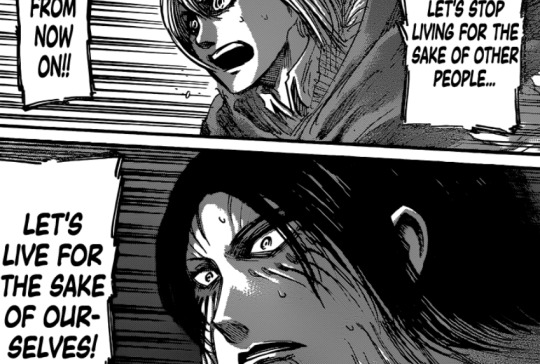

It’s Mikasa and Historia who reach out, but Ymir and Eren both refuse that closeness. Eren chooses to fight, and Ymir chooses to sacrifice herself to Reiner and Bertolt.
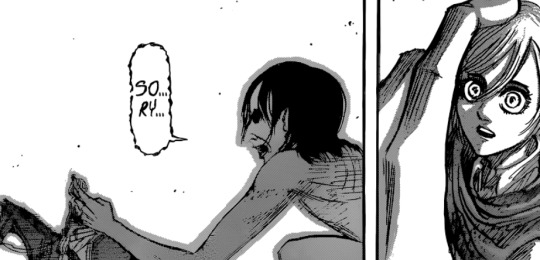
I know a lot of people take issue with this writing choice, but sorry this post isn’t about the quality of the writing, just how it all comes together in the big picture. The point is, Historia and Eren are both offered what they have always wanted which is to live as themselves with a person who loves them for who they are only for it to get them taken away.
There’s also an interesting irony written in Ymir’s death. Historia has always idealized the path of a martyr. She always thought living a good, selfless, altruistic life is what would earn her the love of her sister.
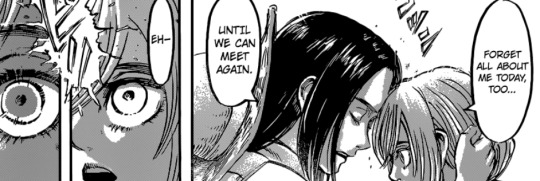
Part of the problem is, the only source of love both Eren and Historia has was taken away so suddenly. Historia got the idea in her head, that all love was conditional and she had to act good in order to earn that love because love was never freely given to her. So Historia’s martyr act is a way to earn love. However, Ymir’s choice inflicts upon Historia the pain other people feel when she decides to martyr herself.
The path of the martyr isn’t a good one, it’s thorny, and wracked with pain. What Ymir does is a genuine act of altruism. She makes a choice out of sympathy for both Reiner and Bertolt who have suffered all their lives just like her, and also a belief her sacrifice will buy something for HIstoria in the bigger picture. It’s at least partially an altruistic decision, and Historia’s not happy about it at all, she’s downright bitter. Because, Historia isn’t the altruist deep down inside she pretends to be. Historia idealizes self sacrifice and selflessness, but when faced with the harsh reality and consequences of such behavior she realizes this is not what she wants.
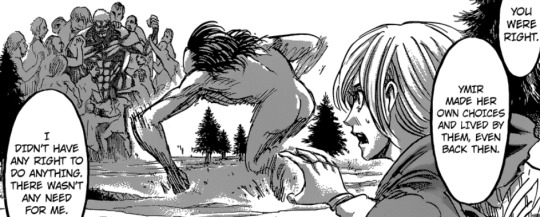
Ymir’s death throws the narrative Historia has always held onto into question, because she’s now the victim of somebody else’s self sacrifice. By killing herself, Ymir has also deprived Historia of her place in the world. Which sends her into self doubt. This moment of reflection is once again where we see the real Historia.

Eren calls out the fact that Historia is actually very selfish. When she’s not performing goodness, most of her worries and actions are centered around herself. Everyone is out risking her lives, and Historia is kind of busy like “Who am I? Why won’t people love me for the real me?” These questions are selfish because they are focused and centered around the self. Historia is, egocentric in the way a child is, and the way that Eren is, because she doesn’t have a fully developed self.

Uprising is where we’re shown very clearly that rather than having a centralized sense of self, a goal to focus herself around, all of these things normal characters have Historia is someone who wildly swings between two.


Historia is indecisive on whether or not Krista or Historia constitutes the real her. There is the act that Historia portrays on the surface as someone who always worries about others, and then her history (Gosh, golly gee I wonder why her real name is Historia... obvious symbolism is obvious). The question for HIstoria is which one she should let efine her, is she defined by the trauma she accumulated by being born into this world, or the person she wants to be. Historia’s failure to reconcile herself between the two extremes is what results in her behavior, as swinging back and forth between both.
I don’t believe that the point of uprising is to show Historia finally reconciling these two, but rather to show her wildly swinging between the two. HIstoria is someone who wildly swings between great feats of selfishness and selflessness.
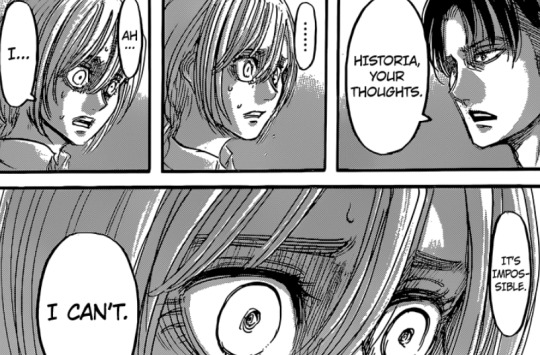
We are given several hints of Historia’s progress in this arc, but also several unhealthy signs of her back sliding. For exmaple there’s the scene where Levi infamously bullies Historia into calling herself the queen. One this scene fundamentally demosntrates what Historia’s problem is, she can’t make decisions or act for herself because she doesn’t really know what she wants.
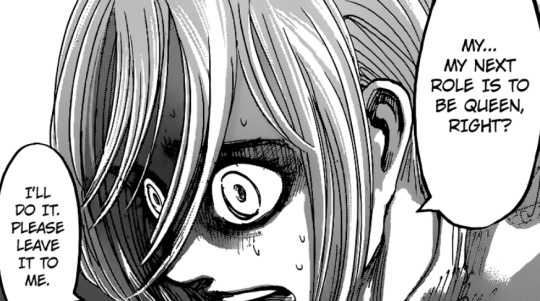
And when Levi beats her up and pushes her, she decides to perform again. Now the question is if you see the final climactic scene of Uprising as her triumphantly overcoming this cycle or falling back into it. My interpretation is that it portrays the swinging between.
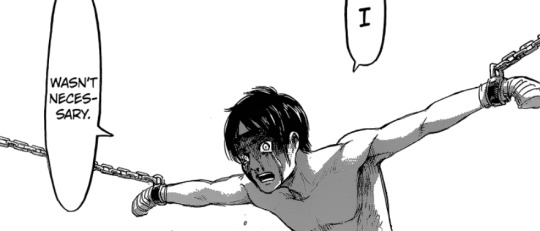
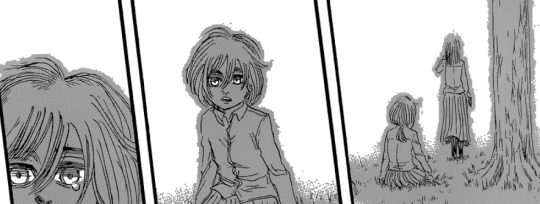

HIstoria, confronted with the feelings of insecurity she’s had since childhood unable to feel consistently loved or that she was even worthy of love is about to fall back on her mechanism of total and complete selflessness. Believing that her self sacrifice will at least mean she was a good person that meant something to the world, that her self sacrifice will earn her something. The reason that Eren yells I’M NOT NECESSARY is it’s because what their trauma made them feel like, and deep down what they’re afraid of hearing.
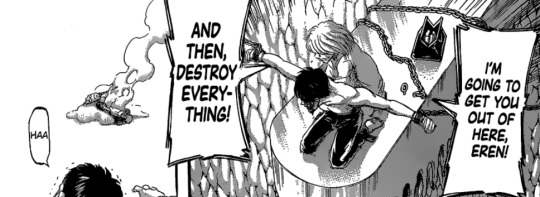
Historia first appears entirely passive and selfless, then she takes an active role and screams she’s the worst girl on earth and she’d rather let the whole world die than sacrifice one person. Her response isn’t to reconcile these two entirely divergent selves, but rather we’re being shown her flipping between them.
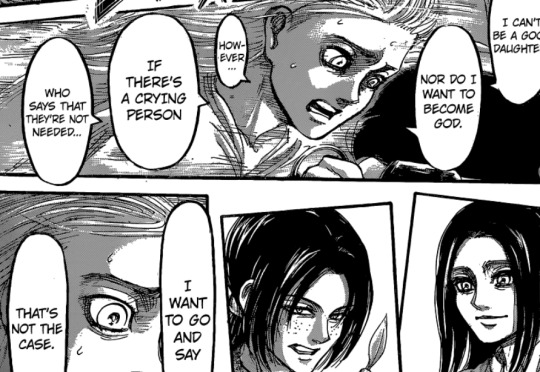
Historia declares one moment she doesn’t care about the rest of the world they can all die, and the next moment she says that if there’s a crying child she will always help. What we see is not a reconciliation so much but rather a flipping between, because it’s Historia’s tendency to swing back and forth between the two.
Here’s my defense of my point. Uprising ends on an ambiguous note. As I’ve said above uprising doesn’t end on Historia becoming her full realized self, but rather wondering if she’s become her full realized self.
Not only that but everything that seems like it was forward progress initially in uprising becomes undone later. Erwin is freed in Uprising, Erwin dies the next arc. Eren says he doesn’t need to become a special person to change the world, Eren is back on his bullshit by the time skip. The uprising puts the good guys in charge of the government and so now the government is no longer an obstacle to the path of saving humanity. The Jaegerists come take over in a second uprising, and the government becomes an obstacle once more. Even the decision they made to never feed Historia to a titan in order to sacrifice the world, is something the main characters go back on as they debate on whether or not to have her eat Zeke. Everything that seems like it’s forward progress becomes undone.
So why would Historia’s arc not become undone, too? This isn’t a question of quality of the writing. If you think this is a bad writing decisoin you’re completely valid I just am trying to remind you this isn’t the place to have that discussion. The deicsion to regress however, portrays the conflicts the characters are dealing with as cyclical ones. My argument is that as a whole Attack on Titan is being written as a cyclical story where characters circle.
Eren and Historia are just the two biggest contenders of this regression. Which is why we see them conspiring together in this the final arc. (Yes there is a problem with Historia being mainly offscreened) however narratively the decisions we are shown Historia making in this arc are all passive ones. Also ones meant to pacify the people around her.
Eren will always choose to be the activest character he possibly can, and to take agency even if it means stealing it from others. Historia will always choose to be passive, and will give up agency even if it means people steal things away from her.
We are kept mostly out of Historia’s head. We are also kept mostly out of Eren’s head. What we are being shown recently though is a continuation of what we witnessed in uprising. Uprising ended with the question of if Historia is Krista Lenz, or Historia Reiss unresolved.
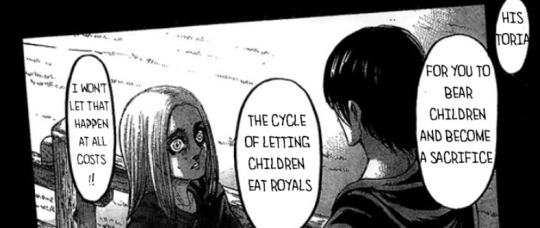
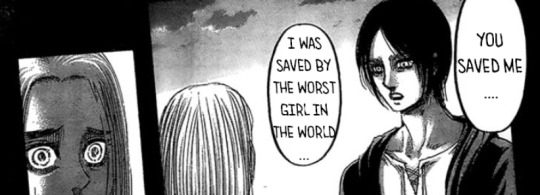
This scene is Eren browbeating Historia into submission so she’ll go along with this plan. However, for HIstoria it’s also a confrontation with both sides of herself that she has shown to other people. Eren is basically telling HIstoria there are two wildly different hers, there is the Historia who would sacrifice herself, and the Historia who would say fuck the entire world she’s not sacrificing herself even if it makes herself the enemy of humanity.
My argument is that the story has gone to great length to portray that to some extent, both of these HIstorias are real. Historia is someone who swings between wild feats of selfness and selfishness. Historia can say both of these things and mean them, that she wants to sacrifice herself for the sake of the world, fuck the world she wants to be herself.
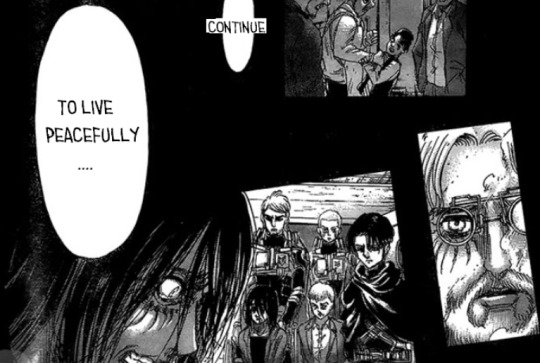
The same way Eren can imprison his friends, tell Mikasa she’s a slave, tell Armin he’s useless and that he’s despised both of them always, and also believes that he’s doing all of this for the love of his friends. Eren can say both and mean both, because he also does this inconsistent swinging back and forth.
The foiling between the two of them shows how utterly broken Eren and Historia are as people due to the neglect they faced as children. It’s not actually a question of whether they are good or bad people. (Though Eren, is a jerk). It’s to show how unhealthy these mechanisms are. They mechanisms they rely on to survive, do not allow them to grow or develop all the way as people so they remain stunted. Historia is still in an incredibly unhealthy and precarious position in regards to her identity. Eren’s mechanism is to take agency, Historia’s is to give it up, the result however is the same between the both of them.
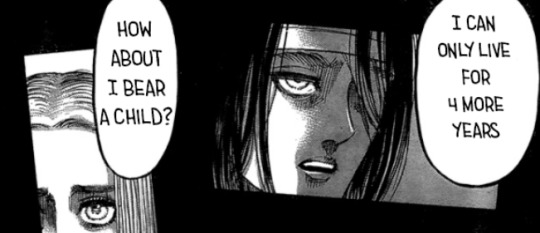
We see Historia make a choice. In all fairness we don’t know what that choice is. However, we also know what she didn’t choose. She knew what Eren was going to run off and do, and what he was planning, and she didn’t stop him.
Another important part of the final arc is showing how everybody else’s decisions also led to Eren doing what he did. Armin’s choice to never confront Eren’s real self turned him into Eren’s enabler. Mikasa’s inability to try to live without Eren, made her completely unable to see this coming. The scout corps in general was unable to stop Eren, because they didn’t understand him. Historia also made a choice to enable the situation to happen in some way, because she didn’t choose to just... tell somebody else what Eren was planning, or stop it.
While yes, she may be trying to stop it all on her own. It’s still a choice she made that’s frighteningly similiar to the choices Eren has been making all along. That is the choice not to trust people, the choice not to openly communicate what she inteded, the choice to instead go off on her own and try to solve everything by herself.
That’s also the choice she always makes when backed up against a wall, and therefore it’s a sign of regression. I don’t think Historia is conspiring with Eren or even agrees with him. However, I do think she has made a similiar choice as Eren which is to try and attempt to solve everything on her own without trusting the others which is why we’re seeing her get so much foiling with Eren in this the final arc.
Historia will overcome this regression when rather than swinging between Historia Reiss, and Krista Lenz, that she is both, and always has been both. You are who you are deep down inside. You are also who you pretend to be. The choice to show Historia’s wavering between makes her arc longer, difficult, more frustrating, but it also shows how hard it is for Historia.
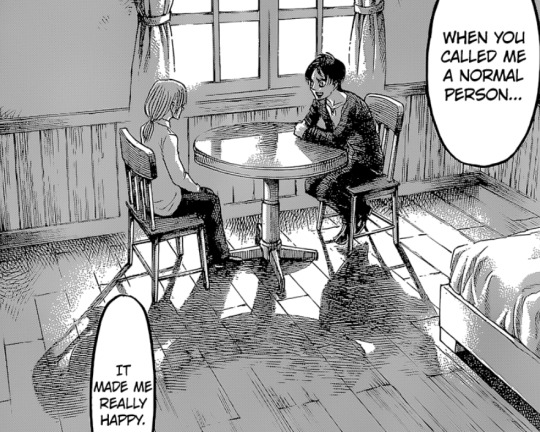
It shows the struggle of someone like Historia with lifelong trauma. How hard it is for her, not to be a queen, or a good girl. How fundamentally, it’s difficult for her to even juts be a normal person. And how in the end that’s what she is fighting for, to rediscover herself as a normal girl once more after being denied that by the environment around her her entire life. Historia too, can be a normal girl in the face of all that trauma.
#historia reiss#eren jaeger#aot meta#attack on titan#attack on titan meta#attack on titan theory#eren meta
239 notes
·
View notes
Text
To Be Glorious & Free
Synopsis: Lady Loki visits young (kid) Loki in a dream, he feels lost and ashamed of who he is but she has a few words of wisdom to be shared.
A/N: Just an idea, nothing that’s logical but it’s a fanfic so it doesn't have to make sense 😂 Also Ik nothing about Loki in the comics, this fic doesn't really fit in the mcu either so just take it as it is. 🤷🏻♂️ I kinda imagine Lady Loki as Eva Green XD
- - -
Radiant white light blinded his vision. Young Loki placed a hand to cover over his squinted eyes. The radiance was warm and comforting. Though the feeling quickly faded when a thought entered his mind;
Was this Valhalla? At least he was grateful to have died a peaceful death in his sleep.
Loki still felt the rise and fall of his chest, the soft texture of grass between his fingers, the sound of soft winds. He pulled himself up to a sitting position, the mysterious light was the blazing sun. Loki rubbed his eyes; he was in a field. The sky was the perfect shade of blue, in fact, the whole place seemed too perfect to be real.
He studied his surroundings in hopes of finding a way out. Instead he saw a large beech tree in the distance. A darkened figure sat against it, hidden in the shade. If this was a dream, his dream, surely he'd remain safe from any potential threat. He hoped so anyway.
Loki began his walk towards the giant tree that swayed gently with the wind. The figure was shadowed by a hood that covered most of their facial features. Loki kept a few metres away to analyse this guest in his dream.
Young Loki struggled to keep his composure in order to stay calm.
The firmly built figure was dressed in some kind of green leather dress with golden armoured plates on the arms, accessorised with a black corset. The dress had a long slit on each side of the hips to reveal tight black trousers and boots underneath.
Loki felt his heart hammer in his chest.
The finely dressed female let out an amused laugh of the richest honey. The dark hood was was removed.
Waves of long black hair fell in place accompanied with piercing blue eyes painted in thin layers of black. A small horned headband rested around the forehead.
"I was expecting something more glamours than a field. But this shall do." She said, looking around at the view. Her voice spoke in confidence that demanded to be heard.
Loki attempted to swallow down his anxiety. "W-who are you?" He asked.
This..version of Loki rolled her eyes. "Don't ask questions you already know the answer to.” She patted the ground next to her underneath the tree.
"Sit. You're wasting time." She commanded. Loki obeyed silently and sat down. He felt captivated and almost jealous at this future version of himself. She began to inspect him, eyes moving up and down.
"You still have such a long way to go." Her voice sounded like Mother's, though it was lightly edged with darkness.
"Are you from the future?" He asked.
"Yes and no. I'm just one of the many version of who you'd wish to become one day." She responded. Loki pulled up his knees and wrapped his arms around them.
"Of someone I can never become." Young Loki said in small voice.
"Nonsense. You can become whoever or whatever you wish to be, you know you have the power to do so. The only thing stopping you is your own fear." Lady Loki said, she made it sound like an easy thing to overcome.
Loki felt his chest tighten. "Fear of what others may think of me." Though still so young, there were whispers of what many thought of him. A growing shadow amongst warriors.
"It's too late to fear what others may think of you, they have already decided." A hint of sadness laced her voice. "You are not responsible for how others perceive you. Show everyone you are better than them. They are the weak minded fools who follow what they have been taught, never having the courage to think for themselves."
Loki locked eyes with his female self, he could feel the confidence radiate from her.
"They are not free." He said, both of their lips mirrored a smirk.
"You are learning well. The world follows their little pathetic paths that are controlled by others. But you, us, are glorious and free." Lady Loki brushed a gentle hand along her younger self's cheek. "We make up our own rules.”
Loki closed his eyes, savouring this strange moment. These were the words he needed to hear for so long. A part of him did not wish to wake up. A brief pause of silence fell between them as Lady Loki waited for a response.
"But it's.. it's not natural to be..." Loki wasn't sure how to word this correctly
"To be both, or neither, somewhere in between." His female self shrugged. Loki nodded.
Lady Loki let out a chuckle. "Says who? There are many unnatural things in this world. Take our idiotic brother for example, " She joked. "It is only considered unnatural because others find it uncomfortable. Many tend to fear those who are different. I find being normal rather tedious."
"That is true." He mumbled to himself.
"We are not the only ones who feel this way. There's a realm that is more..progressive and accepting, a realm of those who are similar to us."
Loki turned, appearing surprised. Surprised that he was not the only one. It brought him a sense of comfort that a world so far away lived beings similar to him.
"Where is this realm?" He asked.
"On Midgard. They are only mortal, they live such short lives."
"I've heard of that realm." Though he did not know much about it. It shocked him that mortals seemed to be more accepting than those who lived far far longer.
"Believe me, it's not a very exciting place to visit. I've had my fair share of fun with them” Well she wouldn’t exactly have called it a fun time...
"If they are more accepting then I'd much rather be there anyway.." Loki sighed.
Lady Loki's eyes widened. "No." She pointed a finger at him. Loki let himself laugh at her response.
"I see they do not like you very much?" He dared to ask.
Lady Loki moved in closer and smirked. "Not quite. They just couldn't handle all of my glory." She spoke proudly, twisting a strand of long hair with her finger. Young Loki let himself freely smile.
This.. dream gave him some hope but the fear still remained strong underneath.
"Let me ask you something." She said in deep thought. Loki nodded.
"Do you believe women are weak creatures in need of protecting?" She asked.
Loki frowned. "No, of course not!" He said in dismay. He knew many strong women, his mother especially. Her magic was something to truly admire and even fear at times.
"Good. Do you believe their appearance dictates their worth?"
Loki shook his head. "No that's completely absurd!"
Lady Loki chuckled. "If only you could see the look on your face, young one.”
Loki felt slightly embarrassed. "Why ask me this?"
She let out a soft sigh. "Because it is what many people believe. It's something that has been ingrained in us since we were children, in story books, in legends, when we are young it is easy to subconsciously believe these ridiculous ideation." She tapped the side of her head. "We both believed this without even realising it.” It took a great amount of years to break away from it all, she only wished it hadn't taken so long.
“Oh and also, it’s possible to be both beautiful and strong at the same time.” She added with a wink.
This had never come to Loki's attention before, it was a lot to take in in such a short amount of time. He realised how much the idea of fear truly controlled everyone so easily, even him.
She continued; "No matter how hard you try, you'll never stop others from judging you no matter what you do, it's inevitable. You could pretend to fit in to avoid it all but that isn't who we are. Not when we were born for greatness. "
Lady Loki's prideful speech soon began to loose its confidence. "My only advice is to not strive for too much, it will only leave you disappointed."
Loki could see the hint of sorrow in those ancient eyes.
"Power is addictive." He commented, he was afraid of asking what sort of things had happened to her. Or maybe he did not wish to know at all.
With a frail smile, Lady Loki replied; "If only I knew that before it was all too late."
"It's never too late to start over." The words that left his lips sounded rather naive, though perhaps it was true in some ways. ".. are you happy?"
Happiness seemed like such a childish word.
Lady Loki tried to suppress a laugh for the sake of her younger self.
"Is anyone ever truly happy?" She responded.
A question in response to another question. Typical. Loki wasn't surprised.
"You're avoiding my question."
"It's one of our many talents." She replied, but Loki wanted an answer.
"It's my dream, I deserve answers. Skip the fancy philosophical responses for once."
Lady Loki raised an eyebrow, she should at least have the courage to be honest with her younger self, right?
She leaned back against the tree, eyes lost into the distance of the vast field, struggling to come up with a response.
"For awhile I forgot what it even meant to be happy, I was lost within myself, consumed by rage, never satisfied with what I had. Some people are just cursed to never feel satisfied and I've come to accept that as a part of my life... but now, after many years, you ask if I am happy... then yes, I am happy." She risked turning her head to meet her younger self's curious eyes.
"Liar." He whispered. Lady Loki's face tightened with anguish, a hidden fist began to clench but nevertheless, she smirked. She was unsure if it really was a lie or the truth.
"Guilty as charged." She said. "Lying may be our native tongue but we have yet to believe the lies we tell ourselves." She then began to stand up. "Looks like our time is up."
“Why so soon?” Loki stood up too. "Please don't go. I still have so many questions." Eyes pleading upwards to his older self. She was truly a beautiful sight to behold, so much power with a single look.
"All in due time. You'll find all the answer you seek soon. Don't forgot what I have told you or this would all have been for nothing." Would he even remember this dream when he woke up?
"Then can you promise me one thing before you go?" He asked. Promises weren't exactly her forte but she'd try to make an exception.
"Go on." She urged him.
Loki fiddled with his fingers. "Promise me you'll be happy one day." He said in a quiet voice, he knew how silly this sounded.
Lady Loki fought the urge to roll her eyes. "I promise." She said, though they were both not satisfied with her response but it would be enough.
Then she spoke again; "A promise for a promise then; promise me you won’t give up. Your story has only just began."
Loki nodded.
Lady Loki closed her eyes and began to fade away. He wanted to reach out to stay for awhile longer but it was no use. They shared a smile together before she had completely vanished away, a trail of glistening sparks flew up with the wind.
Sleep soon arrived to take Loki back home.
Loki drifted off and fell backwards thinking he'd fall on the grass but within an instant, his eyes opened wide as he awoke on his bed. He pulled himself up, moving his legs out to the side, feet touching the cold floor. A slow and steady sigh exhaled from his lips. He remembered.
He would not tell anyone, it would be his little secret. Though like all dreams, they are soon forgotten.
Loki got up and walked to his full length mirror, looking at his reflection. Placing a hand against the glass and holding his head up high, Loki spoke these words like a sacred prayer;
"Your story has only just began."
- - - -
A/N: As a trasguy who likes feminine clothes but is often scared to wear them, this felt really nice to write 🥺💚
#lady loki#mcu fanfiction#marvel#loki#loki fanfic#thor#the avengers#loki odinson#loki oneshot#female loki
14 notes
·
View notes
Text
What the Hell is “Emotional Incest”?
Emotional incest, also known as “covert incest”, “spousification” or “parentification” is a certain type of unhealthy relationship that can exist between a parent and child. In these situations, the child is treated more like a “subsitute spouse”or even a “substitute parent” to their parent than an actual child. The parent’s need to have an adult life partner or a parent of their own outweighs the child’s need for an actual childhood, and the child takes on an adult role in the relationship at a much, much earlier age than is developmentally appropriate. Although this does not involve actual physical incest, it can give the child lifelong struggles with intimacy, relationships and self-esteem.
Sounds familiar to you? You may have experienced emotional incest or parentification if:
You grew up in a family that was dysfunctional or broken in some way. Emotional incest (EI) and parentification generally don’t happen in households where there are stable, loving parental figures who have a healthy relationship between them. EI usually occurs in households where one parent is dead, disabled, incarcerated or absent, or in households where there is serious dysfunction - alcoholism, drug use, mental illness, violence, poverty, divorce or other major issues. Generally, EI stems from a parent being unable to cope with their own loneliness or with the seriousness of their circumstances, and leaning hard on their child as a result.
Your parent confided in you at an inappropriately young age. You were treated like your parent’s substitute therapist, and asked for your input on situations that you were much too young to handle - your parent may have told you about their sex life, your other parent’s infidelity, their own experiences of child abuse, or other adult issues that you were not old enough to handle. No attempt was made to explain things in an age-appropriate manner, and you were not told these things for your benefit; your parent simply dumped their emotional issues on you, and expected you to deal with them in a meaningful way, even when you were barely old enough to understand them.
It was your responsibility to keep the household running. Almost all children are responsible for some amount of age-appropriate household chores, like dishes and vacuuming, but you were responsible for major household tasks that should have been your parent’s responsibility. You had to make sure that there was food in the fridge, school clothes for the younger children and that someone had paid the electrical bill, because if you didn’t do those things, nobody else was going to. At an age where most children can’t use the stove by themselves, you were expected to keep the household functioning.
You had to set rules and boundaries for your parent, not the other way around. You were the one who had to lecture your parent about responsibility when they came home drunk on a Tuesday night or when they forgot to take their medication again. You had to take on the “adult” role in the relationship and beg or scold your parent into growing up and being an adult for once. Although being on equal footing with your parent might sound awesome once you are both adults, it is an exhausting thing for a child to have to deal with - you aren’t even old enough to take care of yourself yet, but you are already responsible for trying to emotionally parent a grown adult.
You may have had to physically take care of your parent. In some households, children are made to engage in something called “instrumental parentification” - this is where you are expected to physically take care of a parent. This can happen in households where a parent has a physical disability and needs their child to prepare their meals, dress them, etc, but it is especially common in households where one or more parents struggles with substance abuse. If you had to routinely put a drunk parent to bed and clean up their vomit, you are well aware of what instrumental parentification feels like.
You were given no discipline or structure by your parent. It might sound awesome to live in a house where there are no rules and you can do whatever you want, but it is actually emotionally devastating to grow up in a household where no one gives a shit if you drop out of school or don’t come home at night. You weren’t given healthy boundaries and no one made any meaningful effort to look after your well-being - if you wanted to smoke and have unprotected sex in high school, no one cared. All of your boundaries and responsibilities were things you had to figure out for yourself.
You are probably the eldest child, or the eldest child of your sex. Children who experience EI or parentification are normally one of the oldest children in the family. Eldest daughters are at especially high risk, as both fathers and mothers are disproportionately likely to turn their eldest girl into a substitute mother or spouse. There are cases, however, where a parent chooses the eldest son for their codependency; this is especially likely in families where the father figure is dead or absent.
You raised your younger siblings. You were, for all intents and purposes, the true parent of your younger siblings. Most older siblings have to do some occasional babysitting or keeping an eye out for the younger siblings, but your role went well beyond that - you may have been the only one making sure that they were fed, bathed and doing okay in school. If you didn’t get them up and off to school in the mornings, they simply didn’t go. You probably signed field trip permission slips, made sure that everyone had clothes for school, and took an interest in your siblings’ lives in a way that your parent never did. Your parent may have kept on having kids well into your adolescence - there was an assumption that you’d just keep on raising whatever children they handed to you.
Your parent was unable to handle your emotions, so you stopped showing them. Whenever you had some kind of breakdown or emotional moment, your parent absolutely could not handle it; they were depending on you to be the “rock” of the household, and when you showed any signs of cracking, it completely overwhelmed them. They could not step up to the plate and cope with your emotions in any way; they often made your emotions all about them. So you quickly learned to push everything down and put on a brave face at all times, all for the sake of your parent.
Your parent did everything in their power to prevent you from moving out. Your parent was likely not a huge fan of the idea that you would one day move on with your life and leave them to fend for themselves, and they may have gone to great lengths to delay it. They might have discouraged you from having any kind of independence by preventing you from going to college or having a job, or they may simply have appealed to your emotions, insisting that you were needed at home and that leaving would mean “abandoning” them. Your parent may have intensely disliked all of your romantic partners, and felt threatened by the idea that your partner was trying to “take you away” from them.
Examples of emotional incest and parentification in fiction:
Fiona from Shameless. Fiona is perhaps the boilerplate example of extreme parentification. She is the oldest daughter in a family where one parent has outright abandoned the family, and the other parent is a low-functioning alcoholic with little interest in being a father. Fiona raises all of her younger siblings and ensures that the household is somewhat functional, at the cost of her own happiness. She repeatedly makes poor decisions in her personal life, but does not have any parent around to offer her guidance.
Princess Carolyn from Bojack Horseman. Princess Carolyn was raised by an alcoholic mother, and often had to fill in for her mom at her cleaning job when she was too drunk to work, so her mother would not be fired. Her mother also tries to use guilt to keep Princess Carolyn from leaving home to achieve her dreams. As an adult, Princess Carolyn continues to be hyper-responsible for the dysfunctional adults around her, and jumps in to save them from themselves even when it harms her.
Bella from Twilight. Bella’s parents are depicted as being flighty, irresponsible and clueless, particularly her mother, Renee. Bella expresses guilt over leaving each of her parents to fend for themselves at different points in the story, even though she is a minor and they are both adults. Even while living with her father Charlie, Bella takes over the household chores and does all of the cooking, as her adult father is unable to cook for himself.
Like anything else, emotional incest and parentification fall on a spectrum. You may have had a parent who was relatively functional when it came to finances and household chores, but made a habit of unloading on you emotionally and expecting you to give advice on adult issues. Or you may have had a deeply mentally ill and addicted parent who required huge amounts of care. Sometimes, parentification and emotional incest are temporary things - your parent may have leaned on you to be their parent for a few years after a major upset, like a divorce, before gradually getting back on their own feet, or their functionality may have waxed and waned as they recovered and relapsed from their issues. Some people have experiencing everything on this list and more, while some may have only experienced one or two things, and only for a short time. Not two families are alike.
It’s also important to remember that the impacts of emotional incest are deeply negative. There is a huge misconception that being a parentified child is somehow “good” for you, because it will make you wise and responsible at a young age. This isn’t actually the case; what many people see as “responsibility” is usually just high-functioning anxiety, which comes from being raised in a household where you got very little guidance and there wasn’t always a parent there to back you up if you messed up. Parentified children often get a “late start” in life, as they may continue to feel responsible for their parents well into their 20s, and their parents may go out of their way to discourage life milestones like college, independence and marriage. Children who have experienced emotional incest also tend to struggle with their own relationships as adults; they frequently have poor self-esteem and an enormous tolerance for dysfunction in their romantic partners, which can be a dangerous combination. They often struggle to have relationships without taking on codependent tendencies and placing an enormous caretaker burden on themselves, and it can take a long time for them to feel comfortable in egalitarian relationships.
There is hope for children who grew up in these situations - therapy can be an excellent tool for working past these tendencies and moving past the loss of one’s childhood. But the first step is recognizing that something was wrong.
#askmissmentelle#missmentelle#relationships#parents#codependent relationships#codependency#relationship#healthy relationships#mental health#emotional abuse
464 notes
·
View notes
Text
“You can depend on this: if you don’t receive the Kingdom as a child would, you won’t enter it at all.”
Today’s reading of the Scriptures from the New Testament is the 18th chapter of the book of Luke:
He told them a parable, urging them to keep praying and never grow discouraged. The parable went like this:
Jesus: There was a judge living in a certain city. He showed no respect for God or humanity. In that same city there was a widow. Again and again she kept coming to him seeking justice: “Clear my name from my adversary’s false accusations!” He paid no attention to her request for a while, but then he said to himself, “I don’t care about what God thinks of me, much less what any mere human thinks. But this widow is driving me crazy. She’s never going to quit coming to see me unless I hear her case and provide her legal protection.”
Did you catch what this self-assured judge said? If he can be moved to act justly, won’t God bring justice for His chosen people when they cry to Him day and night? Will He be slow to bring them justice? Mark My words: God will intervene fast with vindication. But here’s the question: when the Son of Man comes, will He find anyone who still has faith?
He told another parable—this one addressed to people who were confident in their self-righteousness and looked down on other people with disgust.
Jesus: Imagine two men walking up a road, going to the temple to pray. One of them is a Pharisee and the other is a despised tax collector. Once inside the temple, the Pharisee stands up and prays this prayer in honor of himself: “God, how I thank You that I am not on the same level as other people—crooks, cheaters, the sexually immoral—like this tax collector over here. Just look at me! I fast not once but twice a week, and I faithfully pay my tithes on every penny of income.” Over in the corner, the tax collector begins to pray, but he won’t even lift his eyes to heaven. He pounds on his chest in sorrow and says, “God, be merciful to me, a sinner!”
Now imagine these two men walking back down the road to their homes. Listen, it’s the tax collector who walks home clean before God, and not the Pharisee, because whoever lifts himself up will be put down and whoever takes a humble place will be lifted up.
Some people brought infants to Jesus, hoping He would touch them in blessing. The disciples rebuked them for doing so, but Jesus called to the people.
Jesus: Let the little children come to Me. Never hinder them! Don’t you realize—the kingdom of God belongs to those who are like children? You can depend on this: if you don’t receive the Kingdom as a child would, you won’t enter it at all.
Public Official: Good Teacher, what do I need to do to inherit the life of the age to come?
Jesus: Why did you just call Me good? No one is good but God—only God. You know what the Hebrew Scriptures command: “Do not commit adultery; do not murder; do not steal; do not bear false witness; honor your father and mother.”
Public Official: I’ve already been doing these things—since I came of age.
Jesus: One thing you still lack—one thing; sell all your possessions and distribute the proceeds to the poor. Then you will have treasure in heaven. Then you can come and follow Me.
The man heard these words and sadness came over his face, for his wealth was considerable.
Jesus: What a hard thing it is for those with much wealth to enter the kingdom of God! In fact, it would be easier for a camel to squeeze through the eye of a needle than it would be for a rich person to enter the kingdom of God!
Listeners: Then who can be liberated?
Jesus: Remember, what is humanly impossible is possible with God.
Peter: We have left our homes and followed You.
Jesus: I’m telling you the truth: there is nobody who leaves his house or wife or siblings or parents or children for the sake of the kingdom of God who will not receive more than he has given up—much more—in this age and in the age to come. He will receive eternal life.
He took the twelve aside and spoke privately to them.
Jesus: Look, my friends, we are going up to Jerusalem. Everything the prophets have written about the Son of Man will be fulfilled. He will be handed over to the outsiders. They will mock Him, disgrace Him, and spit on Him; they will scourge Him, and they will kill Him. And on the third day, He will rise from death.
But they had no comprehension of what He was talking about. The meaning was hidden from them, and they couldn’t grasp it.
Picture this:
Jesus is nearing the city of Jericho. A blind man is sitting there, begging by the roadside. He can hear the sounds of the crowd accompanying Jesus, and he asks what’s going on.
Crowd: Jesus of Nazareth is passing this way.
Then the man starts shouting.
Blind Man: Jesus, Son of King David, show mercy to me!
The people in the front of the crowd reprimand him and tell him to be quiet, but he just shouts louder.
Blind Man: Son of King David, show mercy to me!
Jesus stops and tells the people to bring the man over to Him. The man stands in front of Jesus.
Jesus: What do you want Me to do for you?
Blind Man: Lord, let me receive my sight.
Jesus: Receive your sight; your faith has made you well.
At that very instant, the man is able to see. He begins following Jesus, shouting praises to God; and everyone in the crowd, when they see what has happened, starts praising God too.
The Book of Luke, Chapter 18 (The Voice)
Today’s paired chapter of the Testaments is the 4th chapter of the musical and poetic book Song of Solomon:
Him (to her): You, my love, are beautiful.
So beautiful!
Your eyes are like doves
nestled behind your veil.
Your hair moves as gracefully as a flock of goats
leaping down the slopes of Mount Gilead.
Your teeth are pearl white like a flock of sheep shorn,
fresh up from a wash.
Each perfect and paired with another;
not one of them is lost.
Your lips are as red as scarlet threads;
your mouth is beautiful.
Your cheeks rosy and round are beneath your veil,
like the halves of a pomegranate.
Your neck is elegant like the tower of David,
perfectly fit stone-by-stone.
There hang a thousand shields,
the shields of mighty men.
Your breasts are like two fawns,
twin gazelles grazing in a meadow of lilies.
As the day breathes its morning breeze
and shadows turn and flee,
I will go up your myrrh mountain
and climb your frankincense hill.
You are so beautiful, my love,
without blemish.
Come with me from Lebanon, my bride;
come with me from Lebanon.
Journey with me from the crest of Amana,
from the top of Senir even the summit of Hermon,
From the lions’ dangerous den,
from the mountain hideouts of leopards.
My heart is your captive, my sister, my bride;
you have stolen it with one glance,
caught it with a single strand of your necklace.
How beautiful is your love, my sister, my bride!
Your love is more pleasing than the finest wine,
and the fragrance of your perfume brings more delight than any spice!
Your lips taste sweet like honey off the comb, my bride;
milk and honey are beneath your tongue.
The scents of your clothes are like the fresh air of Lebanon.
You are a locked garden, my sister, my bride, open only to me;
a spring closed up tight, a sealed fountain.
Your sprouts are an orchard of pomegranates and exotic fruits—
with henna and nard,
With nard and saffron,
calamus and cinnamon—
With rows of frankincense trees
and myrrh and aloes and all the finest spices.
My bride, you are a fountain in a garden,
a well of life-giving water flowing down from Lebanon.
Him (to the winds): Rise, you north wind;
come, you south wind.
Breathe on my garden,
and let the fragrance of its natural spices fill the air.
Her: Let my love come into his garden
and feast from its choice fruits.
Song of Solomon, Chapter 4 (The Voice)
A note from The Voice translation:
What does he mean by “my sister, my bride”? Is this a sudden revelation of an incestuous relationship? No. He is describing how sexual expression can bring two people intimately together, as close as two people can be; the man and woman are now family. This image would have been particularly meaningful in ancient Israelite society, where life was centered on familial relationships and calling someone “brother” or “sister” was a sign of deep intimacy and care. Blood relatives lived together, worked together, traded with each other, and were buried together. By calling the woman “sister,” he is declaring they are now blood relatives. In the covenant relationship called marriage, blood is drawn during consummation, bonding the two parties together as man and wife, as brother and sister, forever.
A link to my personal reading of the Scriptures for Thursday, june 22 of 2023 with a paired chapter from each Testament of the Bible along with Today’s Proverbs and Psalms
A post by John Parsons about sacred Breath:
A verse from this week’s Torah portion (i.e., Korach) reveals another great Hebrew name for God: Elohei ha-ruchot lekhol basar (אֱלהֵי הָרוּחת לְכָל־בָּשָׂר), which can be translated "the God of the breath of all flesh" (Num. 16:22). The LORD is the Source of your breath, the One who exhales to you nishmat chayim (נִשְׁמַת חַיִּים), the "breath of life" that enables you to live (Job 12:10).
To understand this, the sages use the analogy of a glassblower who creates a glass vessel. Just as the glassblower blows into a tube to form a vessel from molten glass, so the breath (i.e., neshamah: נְשָׁמָה) that comes from the LORD functions as spirit (i.e., ruach: רוּחַ) that forms and fills the human soul (i.e., nefesh: נֶפֶשׁ). Note that the Name YHVH (יהוה) first appears in this connection (Gen. 2:7), a Name that means "God is Present" (Exod. 3:14) and "God is Mercy" (Exod. 34:6-7). Note also that each letter of the Name YHVH represents a vowel sound (i.e., breath), suggesting that God's Spirit is as close as your very next breath. Like the wind that cannot be seen, so is the spirit the essential part of your identity. Yeshua breathed on his followers and said, "Receive the Holy Spirit" (John 20:22).
The special Name Elohei ha-ruchot lekhol basar appears only one other place in the Torah. After accepting the fact that he would soon die and therefore be unable to finally lead the people into the promised land, Moses prayed: "Let the LORD (יהוה), “the God of the spirits of all flesh” (אֱלהֵי הָרוּחת לְכָל־בָּשָׂר), appoint a man over the congregation who shall go out before them and come in before them, who shall lead them out and bring them in, that the congregation of the LORD may not be as sheep that have no shepherd." So the LORD said to Moses, "Take Joshua the son of Nun (יְהוֹשֻׁעַ בִּן־נוּן, lit. "son of life"), a man in whom is the Spirit (רוּח), and lay your hand on him" (Num. 27:16-18).
The Talmud notes that the word Nun (נוּן) means “fish,” a symbol of activity and life. Joshua, the chosen one who succeeded Moses and led the people into the Promised Land, was the “Son of Life” - a clear picture of Yeshua our Messiah, the “spirit-filled good Shepherd” who would lay down His life for the sheep (John 10:11). The LORD is indeed the “God of the breath of all flesh.” When Yeshua cried out, "It is finished" and breathed his last breath as He died for our sins upon the cross, the greatest exhalation of the Spirit occurred, the greatest sigh, the greatest utterance was ever declared. The sacrificial death of Yeshua for our deliverance was God's final word of love breathed out to those who are trusting in Him.
[ Hebrew for Christians ]
========
Job 12:10 reading:
https://hebrew4christians.com/Blessings/Blessing_Cards/job12-10-jjp.mp3
Hebrew page pdf:
https://hebrew4christians.com/Blessings/Blessing_Cards/job12-10-lesson.pdf

6.20.23 • Facebook
from yesterday’s email by Israel 365
Today’s message (Days of Praise) from the Institute for Creation Research
June 22, 2023
In a Moment
“Behold, I shew you a mystery; We shall not all sleep, but we shall all be changed, In a moment, in the twinkling of an eye, at the last trump: for the trumpet shall sound, and the dead shall be raised incorruptible, and we shall be changed.” (1 Corinthians 15:51-52)
This is one of the greatest promises in the Bible, assuring us that “we” (i.e., all believers, whether dead or living when Christ returns) shall suddenly be changed, with our dead or dying bodies instantly transformed into incorruptible, immortal bodies, which can never die again.
This great change, when it finally occurs, will take place “in a moment.” The Greek here is en atomo, “in an atom of time.” This word, implying the smallest entity conceivable by the Greeks, is used only this one time in the New Testament. It is further described by “the twinkling of an eye,” where “twinkling” is the Greek rhipe, also used only this once. Evidently there is nothing else in this present world comparable in rapidity to this miraculous change that will be called forth when “the Lord himself shall descend from heaven with a shout, with the voice of the archangel, and with the trump of God” (1 Thessalonians 4:16).
The great shout (probably uttered by Christ Himself as at the tomb of Lazarus) will instantly create new bodies for both dead and living believers. “The dead in Christ shall rise first: Then we which are alive” (1 Thessalonians 4:16-17).
Our new bodies will be like Christ’s resurrection body. He “shall change our vile body, that it may be fashioned like unto his glorious body, according to the working whereby he is able even to subdue all things unto himself” (Philippians 3:21).
Christ is able thus to create new bodies for us in a moment, just as when He created all things in the beginning: “He spake, and it was done” (Psalm 33:9). HMM
0 notes